How to Write a Cover Letter With No Experience (Examples Included!)

Writing a cover letter with no experience might feel like an intimidating task. The anxiety of facing a blank page—often with that inner voice whispering you may not be qualified enough—can indeed be paralyzing. But guess what? We’ve all been there, and trust me, you can do it too.
Everyone who has a job today started with no experience and had to write their first cover letter . Some of us even did it in a time when technology wasn’t around to help out (thankfully, things have changed!).
Need some guidance on writing yours? Here is everything you need to know to craft a cover letter with no experience, plus examples to guide you through the process.

What is a cover letter?
First things first: A cover letter is a document that you send to introduce yourself when applying for a job or internship. It complements your resume, providing more insight into who you are and the skills and qualifications that make you perfect for the role.
Think of it like a virtual handshake with the hiring manager. It’s your first interaction and your chance to quickly introduce yourself to secure an interview. Together with your resume , the cover letter is your opportunity to make a strong impression.
Why should you write a cover letter
Writing a cover letter, even if you lack experience, can set you apart from other candidates. It gives you space to delve more deeply into the skills and qualifications mentioned on your resume.
“Rather than focusing on what you have not accomplished yet in your career, focus on what you bring to the table: your skills, competencies, personality traits, and the values that you have developed in your life and education,” says Eloïse Eonnet , career coach and communication skills expert.
How to write a cover letter with no experience: 7 tips
When writing your cover letter, keep in mind your goal: leaving a positive first impression on the reader. It should include relevant information for the position you're applying for and maintain a professional yet engaging tone.
That’s your chance to convince the recruiter that you are the right person for the job and schedule an interview. “So, make sure you are clear on what skills and competencies you bring, and what personality traits make you a great fit,” says Eonnet.
If you still feel stuck and don’t know where to start, here's our seven-step guide on how to write a cover letter with no experience:
1. Check the company and job description
The first step in crafting a well-written cover letter is to research the company where you want to work. Carefully review what the organization shares about its values and culture on social media or its website to understand how you can relate to it in your letter.
The job description should also be examined closely because it typically includes keywords that you can incorporate into your cover letter when explaining your skills and competencies.
2. Include contact details
Mastering the cover letter format is as important as the content itself. Traditionally, a cover letter begins with your name and contact details—ensuring that if the recruiter decides to interview you, the information will be visible and easy to find.
And below your information, right before your opening paragraph, should be the hiring manager contact details. This format is considered more professional and is what is typically expected from candidates.
For example:
[Your First and Last Name]
[Phone number]
[Optional, unless it’s asked for: Your address]
[Date you're sending the letter]
[Hiring managers First and Last Name]
3. Begin with a friendly yet professional greeting
Remember, a cover letter is your initial interaction with the hiring manager, but in a virtual setting. Like in the real world, you begin with a greeting and then proceed to introduce yourself.
Choose a formal greeting such as “ Dear First and Last Name” , avoiding casual words like “ Hi” or “ Hey” to keep a professional tone. After that, you can start your first paragraph by introducing yourself and stating the position you are applying for.
Dear Lucia Carter,
My name is Alana Reeves, and I’m excited to apply for the Copywriter position at ABC Agency, which I discovered on LinkedIn. As a recent graduate from Columbia University, I’d be thrilled to work for a company that aligns with [Company’s values and/or culture].
4. Highlight relevant qualifications
Now, it’s time to showcase that you have what it takes to fulfill the desired position. When writing a cover letter with no experience, the key is to emphasize any relevant skills and competencies, detailing how they were developed.
“If a candidate has no work experience to pull from, I suggest that they talk about projects they completed at school, courses they took, extracurricular activities and community based projects they focused on, and even personal life events and projects they have experienced,” says Eonnet.
Filter what’s most relevant to the role you’re applying for and create a link between your skills and the job description.
“ Since my first semester at school, I’ve cultivated a passion for producing digital content for companies and institutions. I acted on this by creating a blog for the Mass Communication's website, where I wrote stories that captured the daily lives of the students on campus and the Columbia University culture. I also created a series providing recommendations of books, websites, films and TV shows relevant to a Mass Communication graduate.”
5. Showcase hard and soft skills
At this point, you’ve probably heard about hard and soft skills , right? Hard skills are technical abilities or knowledge that you can acquire through education, work experience, or training, whereas soft skills are linked to behavior and interpersonal relationships.
Recruiters seek candidates with a good mix of both types of skills, and the second and third paragraphs of your cover letter are perfect to show that you have what they are looking for.
“Show, do’’t tell! Rather than list your traits, they need to be in context of your past experience, even if it’s not official ’work experience,’” says Eonnet. So, use what you know about the company to show why you’re a good fit—be sure to explain how your skills match their needs.
“ During my four years as a blog content creator, I developed a strong understanding of SEO strategy, creative copywriting, and data analysis using Google Analytics, attracting approximately 1000 monthly visitors to the blog. I also applied my communication and self-management skills by interviewing students and managing the content by myself.”
If you have any top accomplishments, whether personal or academic, you can also include them in this section of your cover letter.
6. Close professionally
Wrap up your cover letter by reiterating your interest in the position and closing with a professional sign-off . You can use an engaging and friendly tone—and even ask for an interview—but don’t go overboard. Avoid overly casual language like “See you soon” or “Cheers”.
“I’m impressed by ABC Agency’s culture and creative approach to copywriting. I look forward to the opportunity to discuss my qualifications further in an interview.
Thank you for considering my application.
Best regards,
Alana Reeves”
7. Proofread carefully
This should go without saying, but make sure to submit a flawless letter free from grammatical, spelling, or punctuation errors. Unfortunately, even great candidates can be overlooked if their cover letter or resume has too many mistakes.
To avoid this, take time to proofread your writing before submission. Remember, you’re not the only one job hunting, and recruiters probably go through tons of cover letters and resumes daily. Anything less than impeccable could be a deal-breaker.
Cover letter examples with no experience (but willing to learn!)
Ready to see these tips in action? Check out two examples of cover letters with no experience to guide you.
1# Sample cover letter for internship with no experience
Alana Reeves
123-456-7890
February 26, 2024
Lucia Carter
123 Payne St.
I’m excited to apply for the marketing internship position at ABC Agency. As a recent graduate from Columbia University, I’m eager to delve deeper into marketing strategies and their role in the business world.
In addition to my commitment to college studies, over the past year, I’ve completed courses in digital marketing essentials and inbound marketing. I’ve also been actively involved in extracurricular activities, creating content and promoting student events across multiple platforms. These experiences have not only expanded my creativity but also enhanced my teamwork skills.
I’m enthusiastic about the prospect of joining your marketing team, as I’m an admirer of your creative marketing campaigns and ABC Agency’s commitment to social responsibility. I'm confident in my ability to contribute to your growth by offering innovative solutions and fresh perspectives for the business.
I look forward to the opportunity to discuss my qualifications further.
2# Sample cover letter for job with no experience
My name is Alana Reeves, and I’m writing to express my interest in the entry-level social media management position at ABC Agency, which I discovered on LinkedIn. As a recent graduate with a major in Mass Communication from Columbia University, I am eager to apply my education in a dynamic and innovative company like yours.
During my four years of undergraduate studies, I initiated and managed a TikTok and Instagram page to share my study routine. I was successful in creating a community of 5,000 followers, including students from Columbia University and other universities nationwide.
This experience equipped me with a robust understanding of content creation, image and video editing, community management, and social media analytics. I strengthened my self-management and organization skills, effectively balancing my academic responsibilities with this project.
Being an admirer of ABC Agency’s creative and humorous content, I am enthusiastic about the prospect of contributing to your team. I believe I can bring fresh ideas and an innovative approach to enhance your social media presence.
What to avoid when writing your cover letter
Understanding what not to say is also helpful when crafting a cover letter without experience. Here are two things to steer clear of:
Don’t be too apologetic
It’s easy to fall into the trap of downplaying your past experiences just because they weren’t formal jobs. However, you should—or at least try to—avoid this negative and overly apologetic approach at all costs.
“I would definitely avoid qualifying any past experience (school projects, odd jobs, internships, community service, personal projects) as ’not work experience.’ I see candidates use an apologetic tone sometimes, which is counterproductive.” says Eonnet.
Don’t focus on your lack of experience
If you’re searching for tips on how to write a cover letter with no experience, examples and such, chances are you're applying for an entry level position. In this case, avoid dedicating too much space in your letter to the fact that you haven’t had a traditional job.
“Recruiters who are looking to fill an entry-level role do not expect you to have a bunch of full-time work experience. Rather, they’re looking for candidates who are self-aware, ready to work, and interested in the position.” says Eonnet.
Sample Cover Letter With No Experience in Field (And How to Write Yours)
By Biron Clark
Published: November 10, 2023
Cover Letters | Recent Grads

Biron Clark
Writer & Career Coach
Writing an articulate cover letter is challenging for all job seekers. But if you have little or no work experience in a field, the stakes are higher. It’s more challenging to prove your value when you don’t have a series of professional accomplishments to back up your assertions. On the bright side, you probably have more to offer an employer than you realize. You just have to package your strengths the right way.
In this article, you’re going to learn how to write a cover letter for a job with no experience in that field. And we’ll look at a full sample after going through the steps.
Let’s get started…
How to Write a Cover Letter With No Experience
1. the main purpose of your cover letter with no experience.
The purpose of a cover letter is to complement your resume and convince more employers to interview you. You may refer to your resume when writing a cover letter for a job application, but you must expand upon points made in the resume when writing the cover letter.
The cover letter should breathe life into the points made in the resume, and create a compelling—or even emotional—narrative around your career hopes and aspirations . It’s your chance to tell your story and show that you have the passion and the drive to come into a job and make a difference.
And at the end, it should ASK for the interview. We’ll talk about that coming up. Let’s get started by going through how to write a cover letter with no experience, step-by-step…
2. Cover Letter Contact Information
When beginning a cover letter for a job application, start with your contact details in the top left-hand corner of the page. Include your name, city of residence, phone number, and email address. (To preserve your privacy, do not include your physical address). You should also include your LinkedIn URL. Next, write the name of the company you’re applying to, and its city of residence.
3. Your Salutation
Ideally, you address your reader by name in your salutation. Internet sleuthing may reveal the name of the hiring manager. If you can’t find a name, you have two options: call the organization and ask to learn more about the position, or write “Dear ” or “Dear Hiring Manager.”
This isn’t ideal, though. You should really only be sending a cover letter if you know the hiring manager’s name and have some specific information about the position. So if you know nothing specific about the hiring manager or job, and the company hasn’t asked for a cover letter specifically, then you probably don’t need to send it .
4. Cover Letter Introduction
Use this section of your cover letter to introduce yourself and share your enthusiasm and why you applied for the position .
Start with your name and provide some background on your strengths. Always identify the position you’re seeking and how you learned about it. If someone at the company told you about the job, then mention that person’s name (only after asking their permission, though). Aim for one to two sentences in your Introduction—keep it short, sweet, and precise.
Example Cover Letter Introduction with No Experience in the Field:
“Hello, my name is Grace Addington, and I’m a goal- and detail-oriented civil engineering graduate from Petaluma College. I was excited to learn about the Junior Engineer internship at Bay Area Rapid Transportation through my former classmate Katie Heinz.”
5. Body Paragraphs
Here comes the most critical part of writing a cover letter with no experience. The purpose of your body paragraphs (one to two brief paragraphs, tops) is to prove that you’re the best candidate for the position. Seeing as how you have little or no previous professional work experience to fall back on, you’ll want to place emphasis on soft skills —attributes of a personal nature that say a lot about your work ethic and ability to work in sync with others. Or, if you have job-related skills (AKA hard skills) from another type of role, point out how those skills will help you transition into this next job and succeed quickly.
That’s what hiring managers are looking for! So while it’s great to write about soft skills and put together a cover letter talking about how you’re willing to learn their job… it’s much better to point out any hands-on experience that you have. So if you’re able, always highlight that first and foremost.
For example, if you had an internship, worked in an unrelated field, did a few academic projects while studying, gave a presentation, etc., those are still valuable pieces to put on your resume AND in your cover letter.
Your resume likely already consists of part-time jobs or school activities or memberships in school associations that maybe aren’t 100% related to the job you’re going after.
Look closer, though—you’ve probably garnered skills in these experiences that can carry over to the job you’re applying for. Below are two examples of cover letter body paragraphs that hone in on two key phrases noted in a job advertisement as requirements: “strong interpersonal skills” and “positive work ethic.” You should be able to figure out pretty quickly which example hits the mark.
Let’s look at two sample paragraphs now from cover letters with no experience in a field:
“I am Twig & Twine’s ideal office manager. As my resume states, I served as an RA at my dorm. I know how to manage an array of things.”
“You’re looking for a candidate with strong interpersonal skills and a positive work ethic. While serving as an RA at Porter College’s main dormitory, I planned monthly social events for over 200 students, settled two to five student disputes per week, and mentored a select group of students in Composition. The experience taught me, rather quickly, how to efficiently multi-task, and how to effectively settle conflicts of all types in a calm, level-headed manner. I feel confident stating that I can bring these talents to Twig & Twine’s office manager position.”
The second example takes the duties that likely appeared in the RA position on the resume and then digs deep, illustrating how the tackling of those duties turned into accomplishments, and led the applicant to grow the crucial skills needed for the office manager position.
One last thing about body paragraphs—remember to frame your message around the employer’s needs, and not yours. Focus on what you can bring to the job, and how your talents will translate into success for the company. That’s important in any cover letter, and becomes even more crucial in a cover letter with no previous work experience.
6. Concluding Your Cover Letter
End your cover letter by reiterating why you’re the best candidate and express your interest once again in the position. And ask them for the interview! It’s surprising but most job seekers don’t do this, and it’s been shown to improve your chances of getting a call to come in for an interview!
So conclude your cover letter by thanking the reader for the time they took to review your application, and tell them you’d like to find a time to meet for an interview to see if it might be a good fit to work together. To close, sign off formally. Try “Respectfully yours” or “Sincerely.”
7. Proofread Everything
Before sending out your new cover letter, read it out loud to catch errors quickly. Ask a trustworthy person to read it as well. Nothing stops you from getting interviews faster than an obvious typo or error in your cover letter or resume, and you only have to check once, but make sure you’re checking it thoroughly!
8. Save it as a PDF
Once the content is finalized, save it as a PDF and title it “ Cover Letter” to prevent confusion. Voila! You’re done. If you follow the tips above, you’ll have a great cover letter with no experience so you can get interviews and job offers in this new field!
Sample Cover Letter With No Experience in Field:
Next, let’s look at a full sample of a cover letter that explains why you’d fit well in a role ( and why you chose to apply for this type of role ):
Dear Name, I’m writing to you regarding the Sales Associate job posting, which I believe reports to you. I can offer 5+ years of experience working directly with customers over the phone and in person, primarily in customer support. Although I haven’t worked directly in sales, my customer support experience has helped me build skills in communication, persuasion, and problem-solving, which I believe will translate well into selling software subscriptions for your firm. I’m motivated to transition into sales to continue challenging myself and growing in my career, and I’ve always enjoyed a challenge, which I think working in sales will provide me. I’ve attached my resume for your review. If any of the above sounds interesting, I’d welcome the chance to talk on the phone this week. Thanks for considering my note today. Best regards, Your Name
This cover letter is upfront and clear that you have no experience in the field of sales, but shows that you’re willing to learn and excited to learn this new job. That’s essential!
You don’t JUST want to say you’re willing to learn, though. You want to PROVE that you’ll be able to learn. That’s why this letter also mentions the experience you have that is most similar. In the case of the example above, it’s the customer service experience and communication skills.
While this person may not have sold anything to customers, they still interacted with customers directly, which will be seen as a plus.
One other thing you should always point out if possible: Experience working in the same industry. So if you’ve never done sales, but you did customer support in the exact same industry as the employer, that’s a huge plus… because it means you’ll have less learning needed on the job!
Other Articles That May Help You:
- 3 more tips for writing a cover letter that stands out.
- General tips for how to get a job with no experience.
- How to write the perfect resume “Summary” section with no experience.

About the Author
Read more articles by Biron Clark
Continue Reading
How to Write a Graphic Designer Cover Letter (3 Examples)
How to write a paralegal cover letter (2 examples), how to write a medical assistant cover letter (3 examples), how to write a research assistant cover letter (3 examples), how to write a software engineer cover letter (3 examples), how to write a hr cover letter (4 examples), how to write a data analyst cover letter (3 examples), how to write a bartender cover letter (3 examples), 3 thoughts on “sample cover letter with no experience in field (and how to write yours)”.
This really helped me
Thanks for this! Really helpful for me as a new graduate and non native English speaker. I’ve started using the steps here and am planning on sending a lot of applications this week to see how it works.
Thank you for the examples. I hav ea little bit of experience so I’m not writing the cover letter with absolutely no work experience but this still is helpful and seems to work for me.
One hiring manager told me that the reason they chose to call me was my cover letter.
Comments are closed.
- Career Blog
How to Write a Cover Letter with No Experience in 2024

Writing a cover letter can be daunting, especially if you have no experience. As a fresh graduate or entry-level job seeker, it can be hard to know where to start. However, a cover letter is an essential part of any job application, and it shouldn’t be overlooked.
Importance of Having a Cover Letter
A cover letter is your chance to make a first impression on a potential employer. It allows you to introduce yourself, highlight your skills and experience, and explain why you’re the best fit for the job. A well-written cover letter can make all the difference in whether you get an interview or not.
In fact, many hiring managers won’t even consider a candidate who doesn’t submit a cover letter. They see it as a sign of laziness or lack of interest in the position. So, even if you don’t have any job experience, a strong cover letter can help you stand out from the crowd.
Obstacles of Writing a Cover Letter as a Fresh Graduate or Entry-level Job Seeker
As a fresh graduate or entry-level job seeker, the biggest obstacle you may face is not having much to write about in your cover letter. After all, if you haven’t worked in the field yet, what can you say about your skills and experience?
However, even if you don’t have any job experience, you can still highlight relevant skills and accomplishments from your education, extracurricular activities, or volunteer work. Additionally, you can express your enthusiasm for the industry and your willingness to learn and grow in the role.
Another obstacle you may face is not knowing how to format or structure your cover letter. But don’t worry. There are plenty of resources available to help you, from sample cover letters to online templates. Plus, you can always ask for help from a mentor, career counselor, or someone in a similar field.
While writing a cover letter may seem challenging at first, it’s an important part of any job application. As a fresh graduate or entry-level job seeker, don’t be discouraged by your lack of experience. Instead, focus on highlighting your relevant skills, showing your enthusiasm for the industry, and expressing your willingness to learn and grow in the role. With some effort and practice, you can write a strong cover letter that gets you noticed by potential employers.
Understanding the Job Requirements and Company’s Needs
When it comes to writing a cover letter with no experience, it’s important to familiarize yourself with the job requirements and company’s needs. Here are three things you can do to help with this process:
Researching about the Company
Before you start writing your cover letter, take some time to research the company. This will help you understand the company’s culture, values, and mission, which can help you tailor your letter to fit their needs. Look for information such as their website, social media, news articles, and employee reviews to get a well-rounded perspective.
Analyzing the Job Posting
The job posting is your guide to understanding what the company is looking for in a candidate. Read through the posting multiple times and highlight the key responsibilities, skills, and qualifications required for the job. This will give you a clear direction on what to focus on in your cover letter.
Identifying Key Skills, Qualifications, and Experience
Once you’ve analyzed the job posting, it’s time to identify the key skills, qualifications, and experience required for the job. Think about your own experiences and how they align with the job posting. Even if you don’t have direct experience, try to think about transferrable skills you have that would be relevant to the job. This will help you emphasize your strengths in your cover letter.
By taking the time to research the company, analyze the job posting, and identify key skills, qualifications, and experience, you’ll be able to write a cover letter that’s tailor-fit for the job. Remember to keep it concise, specific, and focused on the company’s needs. Good luck!
Planning and Preparing for a Cover Letter with No Experience
As a job seeker with no experience, crafting an effective cover letter can be a challenging task. However, with the right planning and preparation, you can still create a compelling cover letter that catches the attention of potential employers.
Here are some crucial steps to take when planning and preparing for a cover letter with no experience.
Assessing Relevant Skills and Abilities
Before you begin creating your cover letter, take the time to assess your relevant skills and abilities. This step will help you identify your unique strengths that you can bring to the position.
To do this, review the required job qualifications and match them with your own skills and abilities. Highlight those that you possess and write them down. This will help you identify what to include in your cover letter to showcase your skillset and expertise.
Brainstorming Achievements and Experience
Although you may not have professional experience, everyone has accomplishments and experiences that they can share. Take the time to brainstorm any previous experiences that relate to the job you are applying for.
For instance, if the job requires strong communication skills, think about situations where you demonstrated excellent communication skills, such as teamwork or volunteering. All these experiences provide an opportunity to showcase your skills and achievements in your cover letter.
Understanding the Company’s Culture and Values
One essential aspect of creating an effective cover letter is understanding the company’s culture and values. This step will help you tailor your letter to align with the company’s mission and vision.
Research the company thoroughly to identify their values, goals, and mission. Check the company’s website, social media pages, and even forum discussions to get a sense of their values and culture. Use this information in your cover letter to demonstrate your understanding of the company’s goals and show how your skills align with these goals.
Planning and preparing for a cover letter with no experience requires assessing relevant skills and abilities, brainstorming achievements and experiences, and understanding the company’s culture and values. These steps will help you create a compelling cover letter that highlights your skills, experiences, and alignment with the company’s values.
Structuring a Cover Letter with No Experience
As a job seeker with no previous work experience, writing a cover letter may seem like a daunting task. However, with the right structure, tone, and visual appeal, you can create a compelling cover letter that stands out from the crowd. In this section, we’ll discuss the key elements to consider when structuring a cover letter for entry-level positions.
Parts of a Cover Letter
A cover letter typically consists of three parts: the introduction, the body, and the conclusion. In the introduction, you should introduce yourself, state the position you’re applying for, and express your interest in the company. In the body, you should highlight your skills, experiences, and qualifications that make you the best candidate for the position. Lastly, in the conclusion, you should thank the employer for their time and consideration, and express your interest in meeting with them to discuss your qualifications further.
Using the Right Tone and Language
When writing a cover letter with no experience, it’s important to strike the right tone and language. Aim for a professional, yet conversational tone that shows enthusiasm for the position and the company. Your language should be clear, concise, and free of errors. Avoid using clichés, generic statements, or overly formal language that may come across as insincere or robotic.
Making the Letter Visually Appealing
In addition to the content of your cover letter, its visual appeal can also make a difference in catching the employer’s attention. Use a clean, easy-to-read font, and include plenty of white space to avoid overwhelming the reader. Use bullet points or bolded text to highlight key points, and consider including visual elements such as a logo or relevant image to make your letter stand out. However, don’t overdo it with visual elements or fancy formatting, as this may distract from the content of the letter.
By following these tips on structuring a cover letter with no experience, you can create a strong, effective cover letter that showcases your skills, experiences, and enthusiasm for the position. Remember to keep your tone professional yet conversational, and make your letter visually appealing without overwhelming the reader. With some effort and attention to detail, you can increase your chances of landing your dream job!
Writing the Opening Paragraph of a Cover Letter with No Experience
When you have no experience, writing a cover letter can be daunting. Your goal is to make a strong first impression on the employer and stand out among other candidates. The opening paragraph of your cover letter is where you’ll grab the employer’s attention and make a compelling introduction.
To grab the employer’s attention, you need to be creative and show why you’re the right fit for the job. This can be achieved through a strong and compelling introduction that highlights your skills and achievements. A good idea is to use a hook that will engage the employer and make them want to read on.
Using a hook in your opening paragraph can be any attention-grabbing statement that relates to the position you’re applying for. This could be an interesting fact or statistic, a personal anecdote or a quote that is relevant to the industry. For example, if you’re applying for a job in sales, you could start with a strong opening line such as:
“Did you know that sales professionals who are passionate about their products sell 35% more than those who aren’t?”
This shows that you’ve done your research and are knowledgeable about the field. It also demonstrates your enthusiasm for the role and your willingness to learn.
The opening paragraph of your cover letter is your chance to make a bold introduction and stand out from other candidates with no experience. Write a strong and compelling introduction that includes a hook to grab the employer’s attention and demonstrate your knowledge and enthusiasm for the job.
Writing the Body Paragraphs of a Cover Letter with No Experience
When writing a cover letter with no experience, it can be challenging to create relevant and compelling content. However, the body paragraphs of your cover letter are where you can showcase your skills, experience, enthusiasm, and passion for the job.
Highlighting Relevant Skills and Experience
Start by identifying your skills and experience that are relevant to the job. Look at the job description and requirements, and highlight any skills or experience that you possess.
Focus on how your skills and experience can benefit the company and contribute to its success. Use examples from your past experiences, even if they are not directly related to the job, to demonstrate how you can transfer those skills and experience to the current role.
For example, if the job requires strong communication skills, mention how you have developed excellent communication skills through volunteering, extracurricular activities, or previous jobs.
Showing Enthusiasm and Passion for the Job
Employers value candidates who are enthusiastic and passionate about the job. Show them that you are genuinely interested in the position and the company by highlighting specific aspects of the job that excite you.
Do your research on the company and the role and show that you have a genuine interest in what the company does and how the role aligns with your career goals. Use specific examples and be clear about why you want to work for this particular company.
Avoiding Common Mistakes and Pitfalls
When writing your cover letter, avoid the common mistakes and pitfalls that can turn off potential employers. These include:
- Using generic language and buzzwords
- Focusing too much on yourself and not enough on the company
- Writing a lengthy cover letter
- Making grammar and spelling mistakes
To avoid these mistakes, tailor your cover letter to the specific job and company, be concise and to the point, and proofread your letter carefully.
When writing the body paragraphs of your cover letter with no experience, focus on highlighting your relevant skills and experience, demonstrating your enthusiasm and passion for the job, and avoiding common mistakes and pitfalls. With a well-crafted cover letter, you can stand out from other candidates and increase your chances of landing a job interview.
Writing the Closing Paragraph of a Cover Letter with No Experience
When it comes to closing your cover letter with no experience, a strong ending can make all the difference. Here are some tips to help you wrap up your letter in a positive and professional manner:
Reiterating Interest and Fit for the Job
Your closing paragraph should remind the employer why you’re a good fit for the position and express your enthusiasm for the opportunity. You can use this space to highlight your key qualifications and strengths that align with the job requirements. For example:
“I’m excited about the possibility of joining your team as a Marketing Assistant. My experience with social media management and content creation, combined with my strong communication and analytical skills, make me confident that I would excel in this role.”
Closing in a Positive and Professional Manner
Remember to maintain a professional tone and avoid coming across as overly informal or desperate. This can be a delicate balance, but you can achieve it by thanking the employer for considering your application and expressing your continued interest in the position. Here’s an example:
“Thank you for taking the time to review my application. I would be honored to have the opportunity to discuss my qualifications further and learn more about how I can contribute to your team. Thank you again for your consideration.”
Creating a Call to Action
Finally, your closing paragraph should include a call to action that encourages the employer to take the next step, whether that’s scheduling an interview, reviewing your portfolio or sending additional information. Here’s an example:
“I look forward to the opportunity to speak with you about how I can contribute to your organization. Please don’t hesitate to contact me to schedule an interview or to request additional information. Thank you for considering my application.”
The closing paragraph of your cover letter can be a powerful way to leave a lasting impression on the employer. By reinforcing your fit for the job, closing in a positive and professional manner, and creating a compelling call to action, you can increase your chances of landing an interview and ultimately, your dream job.
Tips and Tricks for Writing a Cover Letter with No Experience
When it comes to writing a cover letter with no experience, there are a few tricks that can help you stand out from the crowd. Here are some tips to help you write a compelling cover letter:
Using Keywords and Action Verbs
One of the most important things you can do when writing a cover letter is to use keywords and action verbs. This will help your cover letter stand out and show that you are a proactive person who is ready to take on new challenges.
Start by reading the job description carefully and identifying the keywords that the employer is looking for. Then, incorporate those keywords into your cover letter in a way that shows how you meet those qualifications.
Additionally, using action verbs can help make your cover letter more engaging and dynamic. Some effective action verbs to consider including in your cover letter are “created,” “managed,” “collaborated,” “initiated,” and “solved.”
Personalizing the Letter
Another important tip is to personalize your cover letter. This means addressing the hiring manager by name whenever possible and tailoring your letter to the specific company and job you are applying for.
Research the company before you begin writing your cover letter. Read about their mission, values, and culture, so you can show that you understand what makes them unique and that you are excited about the opportunity to work for them.
Addressing Gaps in Work History or Experience
If you have gaps in your work history or lack experience in a certain area, it can be challenging to write a cover letter that showcases your strengths. However, there are ways to address these gaps in a way that highlights your skills and potential.
Start by being upfront and honest about your experience. Explain why you are interested in the position and how your skills and strengths align with the company’s needs. Emphasize any transferable skills you have gained through volunteer work, internships, or other experiences.
If you have gaps in your work history, be transparent about them and explain what you were doing during that time. Perhaps you were traveling, pursuing a degree, or caring for a family member. Your honesty and transparency can help build trust with the hiring manager and show that you are a responsible and reliable candidate.
By following these tips and tricks, you can write a cover letter that showcases your strengths, communicates your enthusiasm and potential, and helps you stand out from other applicants.
Proofreading and Editing a Cover Letter with No Experience
When it comes to writing a cover letter with no experience, one of the most important things to keep in mind is that proofreading and editing are crucial! Even the most skilled writers can make mistakes, so it’s important to take the time to review and refine your letter to ensure that it presents you in the best possible light. Here are a few key things to look out for:
Checking for Spelling and Grammar Errors
Start by reading through your cover letter carefully, paying close attention to spelling and grammar. Look out for common mistakes like using the wrong form of words (e.g. “their” instead of “there”), misspelling names or job titles, and forgetting punctuation. If you’re not confident in your own abilities, consider using a program like Grammarly to help you catch any errors you might have missed.
Checking the Formatting and Layout
Another important aspect of proofreading and editing a cover letter is checking the formatting and layout. Make sure that your letter is well-organized and easy to read, with clear headings, subheadings, and bullet points. Use a font that is professional and easy to read, and make sure that your margins are consistent throughout the document. You should also pay attention to the spacing between paragraphs and the overall length of your letter, making sure that it is neither too long nor too short.
Asking for Feedback and Critique
Finally, don’t be afraid to ask for feedback and critique from others. This can be a great way to identify any areas where you could improve your letter, whether it’s in terms of tone, formatting, or content. Consider asking a friend, family member, or mentor to review your letter and provide you with honest feedback. You might also want to consider working with a professional copywriter or career counselor who can help you refine your message and create a more compelling letter.
Proofreading and editing a cover letter with no experience is all about taking the time to review and refine your letter to ensure that it presents you in the best possible light. By following these tips and working with others to get the feedback you need, you can create a cover letter that will help you stand out from the crowd and land your dream job!
Example Cover Letters with No Experience
When you’re just starting out in your career, it can be a challenge to land your first job without any previous experience. But don’t let that discourage you – everyone has to start somewhere! One of the most important tools in your job search arsenal is a great cover letter. A well-written cover letter can help you stand out from the crowd and make a positive first impression on potential employers.
Here are two examples of cover letters for applicants with no experience:
Sample Cover Letter for Fresh Graduates
Dear [Hiring Manager’s Name],
I am writing to apply for the [Position] role at [Company]. As a recent graduate of [University], I am excited about the opportunity to put my skills and knowledge to work in a professional setting.
Although I have no previous experience in [Industry], I am confident in my ability to learn quickly and contribute to [Company]’s success. Through my studies, I have developed strong [Skills], which I believe will be an asset in this role. Additionally, my experience working on [Project/Internship] has given me valuable experience with [Related Skill].
I am motivated, detail-oriented, and passionate about [Industry]. I would love the opportunity to join [Company] and grow as a professional. Thank you for considering my application.
Sincerely, [Your Name]
Sample Cover Letter for Entry-Level Job Seekers
I am writing to express my interest in the [Position] role at [Company]. Although I am new to the industry, I am eager to start my career and contribute to a team.
While I don’t have any previous experience in [Industry], I have spent the last [Time Period] developing my skills and knowledge through [Coursework/Projects/Internships]. I am confident that I can bring my enthusiasm and willingness to learn to [Company’s] team.
I am particularly drawn to [Company’s] [Mission Statement/Recent Accomplishments], and I am excited about the opportunity to work with a company that shares my values. I am a quick learner, a hard worker, and a team player. I am confident that, with the right guidance and support, I can make a valuable contribution to your organization.
Thank you for considering my application. I look forward to the opportunity to discuss my qualifications further and show you why I would be a great fit for the position.
Remember, the key to a great cover letter is to highlight your strengths and demonstrate your enthusiasm for the position. With a little bit of effort and some attention to detail, you can craft a cover letter that will help you land your first job and start your career off on the right foot.
Related Articles
- One Page Resume: The Ultimate Guide and Examples for 2023
- IT Engineer: Job Description, Salary, and Skills for 2023
- Front-End Developer Resume: Sample & Writing Tips for 2023
- Administrative Jobs: Opportunities, Titles, and Descriptions
- Operations Director Resume: A Example and Guide to Success
Rate this article
0 / 5. Reviews: 0
More from ResumeHead

- Advice & Tips
Writing a Cover Letter with No Experience | Tips and Example
March 13, 2024
Introduction
The job market is constantly evolving, presenting both challenges and opportunities for job seekers and employers alike. In today's highly competitive environment, landing a job, especially as a candidate with no prior experience, can be daunting. Employers are looking for candidates who not only meet the job requirements but also demonstrate potential and a willingness to learn and grow within the company.
Challenges Faced by Job Seekers
For job seekers, especially those seeking internships with no prior experience, standing out among numerous applicants is a significant hurdle. Limited professional experience can make it difficult to showcase one's qualifications and skills effectively. Additionally, the current job market is highly competitive, with many qualified candidates vying for the same positions.
Challenges Faced by Employers
Employers, on the other hand, face the challenge of identifying the right candidate for the job. With an abundance of applications to review, recruiters often have limited time to assess each candidate thoroughly. Finding a candidate who not only meets the job requirements but also aligns with the company culture and values can be a demanding task.
Understanding the Importance of a Cover Letter
In today's highly competitive job market, standing out as a candidate can be challenging, especially when you have little to no professional experience. A well-crafted cover letter can make a significant difference in showcasing your potential to prospective employers.
Demonstrate Your Interest and Initiative
A cover letter allows you to express your interest in the company and the specific role you are applying for. It shows recruiters that you have taken the time to research the organization and understand how your skills align with their needs. This initiative demonstrates your commitment and enthusiasm for the position.
Personalize Your Application
Unlike a resume, which outlines your work history and qualifications, a cover letter provides you with the opportunity to share personal anecdotes or insights that are not evident from your CV. It gives you a platform to explain why you are passionate about the industry, the company, and the role, helping you connect with the hiring manager on a more personal level.
Highlight Your Potential
Even without prior work experience, a cover letter enables you to highlight your potential and transferable skills. You can draw attention to relevant coursework, extracurricular activities, volunteer work, or internships that have equipped you with the capabilities needed to excel in the desired position. By emphasizing your strengths and abilities, you can compensate for the lack of professional background.
Showcase Your Communication Skills
Writing a compelling cover letter showcases your communication skills, attention to detail, and ability to articulate your thoughts concisely. These are valuable attributes that employers look for in candidates, regardless of their level of experience. Your cover letter serves as a writing sample, allowing recruiters to assess your language proficiency and professionalism.
Overall, a cover letter complements your resume by providing context, personality, and additional information that can influence a hiring manager's perception of you as a candidate. It is an essential tool for making a memorable first impression and demonstrating why you are the right fit for the internship or entry-level position you are seeking.
Tips for Writing a Cover Letter with No Experience
Writing a cover letter can be daunting, especially when you lack professional experience. However, with the right approach and mindset, you can craft a compelling cover letter that highlights your potential and eagerness to learn. Here are some valuable tips to help you create a standout cover letter even without prior experience:
Research the Company
Before you start writing your cover letter, take the time to research the company you are applying to. Understand their values, goals, and work culture. Tailoring your cover letter to align with the company's ethos shows that you are genuinely interested in the position.
Focus on Transferable Skills
While you may not have direct work experience, you likely possess transferable skills gained from other areas of your life, such as volunteering, academic projects, or extracurricular activities. Highlight these skills in your cover letter and explain how they make you a suitable candidate for the role.
Show Enthusiasm and Willingness to Learn
Express your passion for the industry and the specific role you are applying for. Emphasize your eagerness to learn and grow professionally. Hiring managers appreciate candidates who show genuine enthusiasm and a willingness to develop new skills.
Demonstrate Adaptability
Highlight your ability to adapt to new environments and tasks. Employers value candidates who are flexible and can quickly learn and adjust to different situations. Showcase instances where you successfully navigated challenges or learned new concepts efficiently.
Keep it Concise and Relevant
Avoid using clichés or generic phrases in your cover letter. Be concise and focus on relevant information that demonstrates your fit for the job. Keep your cover letter to one page and use clear, professional language to convey your message effectively.
Solicit Feedback
Once you have drafted your cover letter, seek feedback from mentors, career advisors, or friends. Constructive criticism can help you identify areas for improvement and ensure that your cover letter is polished and impactful.
By incorporating these tips into your cover letter writing process, you can enhance your chances of capturing the attention of recruiters and landing your desired internship, even with no prior work experience.
Structuring Your Cover Letter
Structuring your cover letter is essential to ensure that it is well-organized and effectively communicates your qualifications, even if you have no prior experience in the field. A clear and professional layout can make a significant difference in capturing the employer's attention and showcasing your potential as a candidate.
Key Elements to Include:
- Contact Information: Begin your cover letter with your contact details, including your full name, phone number, and email address. Make sure this information is prominently displayed at the top of the page.
- Date and Employer’s Contact Information: Include the date of writing the cover letter and the contact information of the employer, such as their name, title, company name, and address. If you are unsure about the recipient's details, you can use “Dear Hiring Manager” as a salutation.
- Salutation: Address the recipient formally, using “Dear [Hiring Manager’s Name]” or “Dear Hiring Committee.”
- Introduction: Start with a captivating introduction that states the position you are applying for and explains why you are interested in the role and the company.
- Body Paragraphs: Use one or two paragraphs to highlight your relevant skills, experiences, and qualifications. Focus on how your strengths align with the requirements of the internship.
- Closing: End your cover letter with a strong closing paragraph that reiterates your interest in the position, expresses gratitude for the opportunity to apply, and includes a call-to-action, such as requesting an interview.
By following this structured format, you can create a well-balanced cover letter that effectively presents your candidacy for the internship position.
Crafting a Compelling Opening Paragraph
When it comes to writing a cover letter with no experience, the opening paragraph plays a crucial role in setting the tone for the rest of the document. This is your opportunity to make a strong first impression on the employer and capture their attention from the get-go. Here are some tips to help you craft a compelling opening paragraph that will entice the hiring manager to keep reading:
Start with a Strong and Personalized Introduction
Address the hiring manager by name if possible, as this shows that you've taken the time to research the company. Mention how you came across the job opening and why you are excited about the opportunity. Personalizing your introduction can help you stand out from other applicants right from the beginning.
Express Your Enthusiasm for the Position
Clearly communicate your passion for the industry or field you are applying for. Employers appreciate candidates who are genuinely interested in the work they do, even if they lack direct experience. Use enthusiastic language to convey your eagerness to learn and grow in the role.
Highlight Your Motivation and Drive
Showcase your motivation and drive to succeed in the position. Mention any relevant coursework, projects, or extracurricular activities that demonstrate your dedication to your chosen field. Employers value candidates who are proactive and eager to take on new challenges.
Demonstrate Your Knowledge of the Company
Do some research on the company and mention a specific reason why you want to work there. Whether it's their mission, values, or recent projects, showing that you understand and align with the company's goals can set you apart as a thoughtful and invested candidate.
Create a Hook that Grabs Attention
Your opening paragraph should include a hook that grabs the reader's attention and makes them want to learn more about you. This could be a brief anecdote, an interesting fact relating to the industry, or a thought-provoking question. Engage the reader right away to compel them to continue reading your cover letter.
By following these tips and crafting a well-thought-out opening paragraph, you can increase your chances of making a memorable impression on the employer and setting yourself apart from other candidates.
Highlighting Transferable Skills and Relevant Experiences
When you lack direct experience in a particular field, emphasizing your transferable skills and relevant experiences can significantly boost your chances of landing an internship. Employers often value soft skills and general experiences that can be applied to various roles. Here's how you can highlight these aspects effectively in your cover letter:
Identify Your Transferable Skills
Start by identifying the transferable skills you possess that are relevant to the internship role. These can include communication skills, problem-solving abilities, time management, teamwork, and adaptability. Think about instances in your academic, extracurricular, or volunteer activities where you have demonstrated these skills.
Bridge the Gap
Once you've identified your transferable skills, connect them to the requirements of the internship position. For example, if the role requires strong communication skills, mention how your experience as a debate team member equipped you with the ability to articulate ideas effectively and persuasively. This demonstrates to the employer that while you may not have direct experience, you have the necessary skills to excel in the role.
Give Concrete Examples
Avoid vague statements about your skills and experiences. Instead, provide specific examples that showcase how you have successfully utilized these skills in the past. Whether it's resolving a conflict within a group project or organizing an event, concrete examples add credibility to your claims and help the employer envision how you can contribute to their organization.
Use Keywords from the Job Description
Review the internship job description carefully and identify keywords related to skills and qualifications sought by the employer. Incorporate these keywords strategically into your cover letter when highlighting your transferable skills and experiences. This not only demonstrates that you understand what the role entails but also increases the chances of your application getting noticed through applicant tracking systems.
By showcasing your transferable skills and relevant experiences in your cover letter, you can present yourself as a strong candidate for an internship, even without prior direct experience in the field.
Showcasing Enthusiasm and Eagerness to Learn
One key aspect that can set your cover letter apart, particularly when you lack experience, is showcasing your enthusiasm and eagerness to learn. Employers are not only looking for candidates with the right skills but also individuals who are passionate about the opportunity and willing to grow within the role.
Expressing your genuine interest in the position and the company can significantly impact how your application is perceived. Here are some tips on how to demonstrate enthusiasm in your cover letter:
- Research the Company: Take the time to learn about the company's values, culture, and recent projects. Mention specific details in your cover letter to show that you are genuinely interested in the organization.
- Highlight Your Motivation: Explain what motivates you to apply for the internship and how it aligns with your career goals. Whether it's a particular project the company is working on or the opportunity to learn from industry experts, make sure to convey your excitement.
- Share Relevant Experiences: While you may not have direct experience in the field, you can draw upon relevant experiences from school, extracurricular activities, or volunteer work. Emphasize how these experiences have prepared you for the internship and sparked your passion for the industry.
By demonstrating your enthusiasm and eagerness to learn, you show employers that you are not just looking for any job but are genuinely interested in the opportunity they are offering. This kind of attitude can leave a lasting impression and make up for the lack of professional experience on your resume.
Closing Strong: Call-to-Action and Thank You
As you wrap up your cover letter for an internship with no experience, it's crucial to leave a lasting impression on the hiring manager. The closing paragraph is your final opportunity to convince the employer that you are the right candidate for the position. Here are some tips on how to craft a strong closing:
Include a Clear Call-to-Action
End your cover letter with a compelling call-to-action that prompts the employer to take the next step. Whether it's scheduling an interview, reviewing your resume, or contacting you for more information, make sure your call-to-action is specific and actionable.
Show Appreciation and Gratitude
Express your gratitude for the opportunity to apply for the internship and thank the employer for considering your application. A simple "thank you" goes a long way in leaving a positive impression.
Reiterate Your Interest
Restate your enthusiasm for the internship and reiterate your interest in contributing to the company. Let the employer know that you are eager to learn and grow in the role.
Close with Confidence
End your cover letter with confidence and positivity. Use a strong closing sentence that leaves a memorable impact on the reader. Avoid being overly formal or generic – instead, let your personality shine through.
"I am excited about the opportunity to bring my skills and passion to [Company Name] and would welcome the chance to discuss how my background, skills, and enthusiasms can be beneficial to your team. Thank you for considering my application. I look forward to the possibility of discussing this exciting internship opportunity with you."
By following these tips, you can create a closing paragraph that reinforces your suitability for the internship and leaves a positive impression on the employer. Remember, the closing is your final chance to make a strong case for why you are the perfect candidate, so make it count!
Example of a Cover Letter for an Internship with No Experience
When applying for an internship with no prior experience, it's essential to highlight your enthusiasm, skills, and eagerness to learn. Below is an example of a cover letter tailored for an internship role:
Email: [email protected] | Phone: (123) 456-7890
Company Name
Address Line 1
City, State, Zip Code
Dear Mr. Smith,
I am writing to express my interest in the [Specific Internship Program Name] at Company Name. I recently graduated with a degree in [Your Degree/Major] from [University Name], and while I may not have direct experience in the field, I am enthusiastic about the opportunity to learn and grow with your team.
During my academic studies, I developed strong research, analytical, and communication skills that I believe will be beneficial in this internship role. Additionally, my experience volunteering with [Organization Name] allowed me to collaborate effectively in a team setting and adapt to new challenges quickly.
I am particularly drawn to Company Name because of its commitment to [Specific Detail About Company]. I am eager to contribute to projects that [Company Value or Goal]. I am confident that my diverse skill set and passion for [Relevant Industry/Field] make me a suitable candidate for this internship.
Thank you for considering my application. I look forward to the possibility of discussing how my background, skills, and enthusiasm align with the goals of Company Name. Please find my resume attached for your review.
Enclosure: Resume
Expert Insights: Advice from HR Professionals and Career Coaches
Advice from hr professional, emily johnson, from hr solutions inc..
"When it comes to applying for internships with no prior experience, showcasing your passion and eagerness to learn is key. Employers value enthusiasm and a willingness to grow within the company. Use your cover letter to express your motivation and highlight any relevant skills or experiences, even if they are from outside the traditional work setting."
Insights from Career Coach, Sarah Parker, at Career Success Strategies
"Crafting a cover letter for an internship without experience may seem challenging, but it's an opportunity to demonstrate your potential. Focus on your transferable skills, such as communication, teamwork, and problem-solving. Tailor each cover letter to the specific role and company to show that you've done your research and are genuinely interested in the opportunity."
"According to a recent survey by Monster, 83% of HR professionals consider a well-written cover letter to be an important factor when evaluating candidates for internships. It provides insights into the applicant's personality, work ethic, and suitability for the role."
Seeking advice from HR professionals and career coaches can provide valuable guidance on how to approach writing a cover letter for an internship with no experience. Their expertise and industry knowledge can help you stand out in a competitive job market and increase your chances of securing the desired internship opportunity.

How to Write a Cover Letter With No Experience

So, you landed an interview for your dream job, but there’s just one catch — you have little to no experience. Don’t worry, you’ve got this. The key is crafting a cover letter that highlights your potential and passion. You may not have years of experience, but you have skills and talents that will make you an asset to any team.
In this article, we’ll show you how to write a winning cover letter when you’re just starting out. We’ll walk through how to structure your letter, discuss your relevant strengths, and convey your enthusiasm for the work. You’ll learn some simple tricks to help you stand out from the crowd. Before you know it, you’ll have a cover letter that will make any hiring manager excited to meet you. Experience or not, your cover letter will prove you’re the perfect person for the job.
What is a Cover Letter?
A cover letter is a formal letter you send with your resume when applying for a job. It's your chance to express your interest in the position and company, highlight your relevant experience, and explain why you're a great fit.
To make your cover letter stand out, consider incorporating some simple tricks that can leave a lasting impression. For example, personalize your letter by addressing it to a specific person rather than using a generic salutation. This shows that you have taken the time to research and tailor your application. Additionally, consider including a brief anecdote or story that showcases your passion or problem-solving abilities.
Remember, a well-crafted cover letter can compensate for limited experience. It provides an opportunity to showcase your potential, skills, and motivation.
What You Should Include in Your Cover Letter
Even with little or no formal experience, you can craft an effective cover letter by focusing on your transferable skills and enthusiasm for the role.
Highlight relevant coursework, volunteer work, internships, or extracurricular activities that equip you for the position. For example, if you’re applying for a marketing role, discuss a project where you demonstrated strong communication or analytical abilities. These kinds of relatable experiences show your capability and motivation.
Express your passion for the work and desire to learn. For instance, you might say something like: “I’m eager to bring my energy and enthusiasm for social media strategy to your team.” Enthusiasm and the ability to quickly pick up new skills are valuable qualities that can make up for lack of direct experience.
Discuss how the company and position align with your career goals. For example, “XYZ Company’s leadership in the tech industry makes this role an ideal opportunity to start my career as a software engineer.” This conveys your long-term motivation and interest in the work.
Thank the recruiter for their consideration. For example, “Thank you for your time and consideration. I look forward to speaking further about this opportunity.” This reinforces your enthusiasm and appreciation for the chance to interview for the role.
In summary, for an effective cover letter with little experience, do:
- Focus on transferable skills from your education or activities
- Express a genuine passion for the work and desire to learn
- Explain how the role aligns with your career goals
- Thank the recruiter for their consideration
With the right approach, you can overcome lack of experience by emphasizing your soft skills, ambition, and fit for the position and company.
3 Simple Steps to Writing a Cover Letter with No Experience
When it comes to writing a cover letter with little to no experience, there are several steps you can take to make a strong impression on potential employers. Follow these guidelines to create a compelling cover letter that showcases your potential and sets you apart from other candidates:

Step 1: Research the Company
Before you begin writing your cover letter, take the time to research the company you're applying to. Familiarize yourself with their mission, values, and any recent projects or initiatives they've been involved in. This will help you tailor your letter to their specific needs and show that you've done your homework.
For example, if they recently launched a new product, completed an acquisition, or received an award, work that into your letter to demonstrate your knowledge of and interest in the company. Reference any values or initiatives that align with your own skills, experiences, and career goals. Avoid generic language and show that you understand the role and responsibilities you're applying for within the context of the company's broader goals.
Step 2: Start Writing!
Structure your cover letter in a professional and organized manner. Include a formal introduction, a body that highlights your relevant skills and experiences, and a concise conclusion that reiterates your interest and thanks the reader for their consideration. For the first draft, you can enlist the help of an AI writer first.
Here's an outline you can follow:
Start with a Strong Opening
Begin your cover letter with a compelling opening sentence that grabs the reader's attention. Consider mentioning a relevant achievement, your passion for the industry, or a unique perspective that sets you apart. This will make a strong first impression and pique the reader's interest.
Even if you don't have direct experience in the field, you likely have transferable skills that are valuable to employers. Identify the skills you possess that align with the job requirements and emphasize them in your cover letter. This could include abilities such as communication, problem-solving, teamwork, or adaptability.
Showcase Relevant Projects or Volunteer Work
If you have completed any projects or volunteered in a relevant capacity, be sure to mention them in your cover letter. This demonstrates your proactive attitude and showcases your willingness to gain experience, even if it's outside of a traditional job setting.
Connect Your Experiences
While you may not have specific job experience, you can still connect your past experiences to the position you're applying for. For example, if you've worked in customer service, highlight how this experience has honed your interpersonal skills and ability to handle challenging situations.
Express Your Enthusiasm
Close your letter with a statement about your passion for the work and your desire for an interview. For example, write, "I am very enthusiastic about the possibility of contributing to your team. I appreciate your consideration, and I look forward to speaking with you further about this opportunity."
Step 3: Proofread and Edit
Before sending your cover letter, make sure to proofread it carefully for any errors or typos. A well-written and error-free cover letter shows attention to detail and professionalism. Take the time to edit your letter for clarity and coherence.
Cover Letter Examples
When you have little to no experience, writing a cover letter can be challenging. But don’t worry, here are some examples to help inspire you.

Example 1: Recent Graduate
Dear Hiring Manager,
Dear [Employer's Name],
I am writing to express my enthusiasm for the Journalism role at [News Media Outlet Name], as advertised on [Job Board/Company Website]. As a recent graduate with a degree in [Your Degree] from [Your University], I am eager to bring my passion for storytelling, strong writing skills, and dedication to journalistic excellence to your esteemed news media organization.
While I may not have prior work experience in the field, my academic journey has provided me with a solid foundation in journalism principles, ethics, and techniques. I have honed my writing and research abilities through coursework, which included in-depth reporting, news writing, and investigative journalism. I also had the opportunity to serve as an intern at [Internship Organization], where I contributed to research and reporting projects that allowed me to gain practical experience in a newsroom environment.
As a recent graduate, I am highly adaptable, quick to learn, and eager to immerse myself in the fast-paced world of news reporting. My academic background has instilled in me a strong work ethic, attention to detail, and an unwavering commitment to delivering accurate, compelling, and timely news content to the public.
[News Media Outlet Name] has an outstanding reputation for unbiased reporting, in-depth journalism, and dedication to informing the community. I would welcome the opportunity to contribute to your team and gain practical experience in the field.
My resume provides details of my academic achievements, relevant coursework, and extracurricular involvement. I am eager to discuss how my educational background and passion for journalism align with the objectives of [News Media Outlet Name].
Thank you for considering my application. I look forward to the opportunity to meet with you to discuss how my commitment to journalism can make a meaningful contribution to [News Media Outlet Name]. I can be reached at [Your Phone Number] or [Your Email Address] to schedule an interview.
[Your name]
Example 2: Career Changer
I am writing to express my keen interest in the Social Media Marketer position at [Company Name], as advertised on [Job Board/Company Website]. As a seasoned scriptwriter with a deep understanding of storytelling and content creation, I am excited to bring my creative expertise and communication skills to the world of social media marketing.
My background as a scriptwriter has equipped me with a unique set of skills that I believe are directly transferable to the field of social media marketing. Throughout my career, I have honed my ability to craft compelling narratives, engage audiences, and convey messages effectively. These skills are vital for creating captivating content and connecting with audiences on social media platforms.
During my career transition journey, I have proactively pursued training and education in digital marketing, content strategy, and social media management. I have completed courses such as [List Relevant Courses or Certifications], and I have practical experience in managing social media accounts and developing content calendars. My proficiency with social media platforms, content creation tools, and data analytics enables me to develop and execute data-driven marketing strategies to enhance brand visibility and engagement.
The transition from scriptwriting to social media marketing has allowed me to appreciate the importance of adaptability, creative problem-solving, and staying attuned to the evolving trends in digital marketing. I am enthusiastic about bringing my creative and strategic mindset to [Company Name] to help develop innovative social media campaigns that resonate with your target audience.
I am particularly drawn to [Company Name] for its commitment to fostering innovation and creative marketing solutions. I am excited about the prospect of contributing to your team and playing a pivotal role in enhancing [Company Name]'s online presence and engagement.
Please find my attached resume, which provides a more detailed overview of my professional background, skills, and experiences. I am eager to discuss how my unique perspective and capabilities align with the objectives of [Company Name].
Thank you for considering my application. I am looking forward to the opportunity to explore how my background as a scriptwriter can bring fresh, creative thinking to the social media marketing team at [Company Name]. You can reach me at [Your Phone Number] or [Your Email Address] to schedule an interview.
Cover Letter Template
A cover letter template can be a helpful guide, but be sure to customize it for each position. Here is a good outline that you can follow:
[Your Name]
[Your Address]
[City, State, ZIP Code]
[Your Email Address]
[Your Phone Number]
[Employer's Name]
[Company Name]
[Company Address]
I am writing to express my interest in joining the [Job Title] position at [Company Name], as posted on [Job Board/Company Website]. As a dedicated and motivated individual with a strong desire to kickstart my career, I am eager to learn, grow, and contribute to your team.
Throughout my educational journey and various life experiences, I have developed essential skills such as [List Key Skills or Abilities Relevant to the Position]. While I have not yet had the opportunity to gain formal work experience, I believe that my academic background, combined with my adaptability and enthusiasm, equips me with the capabilities necessary to excel in the [Job Title] role.
I am highly committed to personal and professional growth and am eager to apply the knowledge and skills I have acquired to real-world situations. I am a quick learner, detail-oriented, and thrive in collaborative environments. I am confident that my strong work ethic, determination, and passion for excellence will enable me to contribute effectively to your team.
I am drawn to [Company Name] for its reputation in [Specify What Interests You About the Company, e.g., its commitment to innovation, its inclusive culture, or its industry leadership]. I am excited about the prospect of being part of your organization and taking the first steps in my career journey with a company that values growth and innovation.
Enclosed is my resume, which offers an overview of my educational background and skills. I am enthusiastic about the opportunity to discuss how my capabilities and eagerness align with the objectives of [Company Name].
Thank you for considering my application. I am looking forward to the opportunity to meet with you to discuss how I can contribute to [Company Name] and embark on a successful career path. I can be reached at [Your Phone Number] or [Your Email Address] to schedule an interview.
Start Drafting with AI
It's easy to feel overwhelmed when you lack experience, but remember that everyone has to start somewhere. With the right mindset and preparation, you can craft a cover letter that helps you land an interview. Focus on your transferable skills, your enthusiasm for the work, and your desire to learn. Do research about the company and role so you can speak to why you're interested and how you'd be a great fit. Be authentic and let your personality shine through. You've got this! With a little time and effort, you can write a cover letter that conveys your passion and helps you take that first step towards building your career.
Here's a pro tip: Write your first draft using AI and edit from there. Hypotenuse AI offers a 7-day free trial that you can take advantage of to get started quickly. Sign up for free here!

Join 100,000+ marketers writing with Hypotenuse AI

- Cover Letter Builder Create a cover letter in 5 minutes. Get the job you want.
- Cover Letter Examples See perfect cover letter samples that get jobs.
- Cover Letter Templates Find the perfect cover letter template.
- Create a Cover Letter Now
- Resume Builder Create a resume in 5 minutes. Get the job you want.
- Resume Examples See perfect resume samples that get jobs.
- Resume Templates Find the perfect resume template.
- Create a Resume Now
- My Documents
Entry-Level Cover Letter With No Experience
Experience is not the only advantage of a candidate. Doubt it? Check out our entry-level cover letter tips and learn how to compete with the craft professionals.
Writing a cover letter is a laborsome task which requires patience, skill, and expertise. It turns into a real challenge if you are a recent graduate and a first-time jobseeker — you have no professional experience and business accomplishments yet, so there is nothing to boast of. You’d ask “How am I supposed to spark the interest of a prospective employer and get an interview? How to write a cover letter with no experience?” Keep your hair on! We’ll tell you how to write a cover letter for entry level job that would unlock your potential and show the hiring manager that you’re the one they need.
Cover Letter With No Experience: Why it is Important
A properly elaborated resume complemented with a meticulously tailored cover letter is your ticket to your career train. But there is one catch: most of the entry-level and internship resumes are pretty similar. As companies have to deal with dozens of entry-level applications every day, hiring executives figured out that judging candidates based on their resumes is a waste of time. Thus, your cover letter is a good opportunity to stand out as an entry-level candidate. It is time to take a cover letter seriously. Our guide provides not only basics but advanced tips that will answer your questions on how to write a cover letter with no experience, how to start it , what to include in it, and more.
What to Include in the Entry-Level Cover Letter
Though a cover letter is basically a strict and formal business-style letter which should be handled respectively, you’ll have room for creativity.
Essentially, a good cover letter consists of 5 separate parts, which are:
1. Contact section
There’s not too much to say about the header, except it should be properly formatted.
If you wonder how to format a cover letter to make it professional and impressive, read our relevant article here .
Make an engaging header — place your contact information in the top, center it and type your name with a bit larger font. Skip 1-2 lines between your info and the recipient’s info section, then 1-2 lines before the salutation. Keep in mind, that the header layout will vary according to the template you use.
For example, it may look this way:
105B Round Ave.
7366-778-685 / [email protected]
Chief Recruiter “The Times”
2. Salutation and introductory paragraph
Keep in mind, that the hiring manager will be skimming the text, so make sure to avoid boilerplate phrases. One would say that it’s okay to use templates and generic phrases in a cover letter for entry-level job, but it’s not true. No “To whom it may concern” and no “Dear Sir or Madam” — make an effort to figure out who is your addressee.
For more information on how to address a cover letter, check our article here . And yes, don’t forget a comma after your greeting.
Dear Recipient,
Then start the introduction with a solid and strong opening statement and tell the prospective employer what you want, how you see it and how you’ll do it. Grab their attention from the very beginning, make them curious enough to read further, show them your personality.
Let’s consider a spectacular example of a great entry-level cover letter opening paragraph:
Dear Mr. Mewell, I was really excited to see the vacancy for an entry-level junior web developer. I have been having a work experience in software development during my studying. I also have programming experience in C /C ++ / C # and work in graphic packages such as Photoshop, CorelDraw and 3DStudio MAX. I have been a longtime user and fan of Velve’s cross-platform multifunctional entertainment platform Steem, so I dream to start my junior PHP developer career at Velve Corp. and grow to team lead in 5 years (why not?) I have good analytical skills. Easy to learn. I work well in a team. With my skill set as well as my Velve brand preference, I know I can use my knowledge and my will to grow professionally, to become a valuable member of the Valve team.
This introduction addressed to a specific person and is written specifically about the company and its product. It gives a prospective employer a strong impression about your genuine interest in their company and makes them read on for sure.
You have their attention — well done! Now it is time to explain why you’re a perfect fit for the job and company. Usually, the body of the cover letter is the place where candidates boast of their professional accomplishments, business experience, and indicators. Because you are a fledgling specialist and a first-time applicant, you have no “implemented a super efficient mega model into business process” things to tell the prospective employer about. What should you do then? Focus on your relevant soft skills and professional skills you obtained through internship or part-time job , etc. There are different characteristics and strengths that you can highlight in this section of a cover letter:
- Personal strengths and traits demonstrating your ability to thrive in a business environment;
- On-point writing, coursework, volunteer experience — everything that may have given you an opportunity to showcase your talents and potential;
- Your general skill set that would bestead for the job you’re applying for;
- Actual achievements, certifications, courses, etc. that are relevant for the job and organization.
When writing this part of your cover letter, make sure to refer to the job posting. You should use keywords and power verbs when discussing your skills and strengths. For example, if the job description involves a team player, then try to provide your achievement that demonstrates your teamplay ability in your own life. The more serious you take this paragraph, the more solid grounding you have to successfully sell yourself. Even if you feel under-qualified for the job, be confident and brave. Never ever undersell yourself. Words like “I’m probably not the most qualified candidate for the position”, “Give me a chance to prove myself” so on and so forth should be removed from your cover letter if they’re already in it. Confidence is your best friend in writing a cover letter, but you should keep in mind that there is a very thin line between confidence and cockiness. Don’t cross it.
4. Conclusion
Concluding paragraph is the place to seal the deal. You should leave a lasting impression on the reader and make them want to talk to you. Make sure your concluding words are confident, enthusiastic, and call the hiring executive to action — to get in touch with you.
5. Closing and sign off
Express your gratitude to the reader for consideration, write valediction and your name at the end of your cover letter for entry-level position. For example, your closing words may be this way:
“Thank you for considering me for the entry-level position of junior web developer. I have enclosed my CV and a link to my portfolio. Please do not hesitate to contact me if you have any questions or if you would like to discuss the role in more detail”.
Remember to leave a blank line before you sign off.
- Sincerely,/Sincerely yours,
- Regards,/Best regards,
- Kind regards,
- Respectfully,
Skip 1 line and then type your name.
Let’s put the concluding paragraph and valediction together:
Thank you for considering me for the entry-level position of junior web developer. I have enclosed my CV and a link to my portfolio. Please do not hesitate to contact me if you have any questions or if you would like to discuss the role in more detail. Best regards, Jonathan Dudeson
Popular Entry-Level Cover Letter Examples
We’ve prepared several popular entry-level cover letters for you to inspire. Enjoy. The following example is a sample cover letter for entry-level position composed of text snippets we used in our article.
Junior web developer
Gabe Mewell Chief Recruiter “Velve Corp.” 108 Somewhere st., Some State
Dear Mr. Mewell, My name is Jon and I’m a recent graduate from the New York IT University. I was really excited to see the vacancy for an entry-level junior web developer. I have been having a work experience in software development during my studying. I also have programming experience in C /C ++ and work in graphic packages such as Photoshop, CorelDraw and 3DStudio MAX. I have been a longtime user and fan of Velve’s cross-platform multifunctional entertainment platform Steem, so I dream to start my junior web developer career at Velve Corp. and grow to team lead in 5 years (why not?) I have good analytical skills. Easy to learn. I work well in a team. With my skill set as well as my Velve brand preference, I know I can use my knowledge and my will to grow professionally, to become a valuable member of the Valve team. I believe I would excel as a junior web developer for Velve Corp. Specifically, I would contribute the following to the company’s operations:
- Proficiency in C, C++, SQL, Mongo, UNIX and
- Advanced skills in HTML and CSS along with cross-browser testing experience.
- Expertise in coding in C++, C, JS
As an inexperienced but willing to learn intern with XYZ Global Software Inc., I collaborated with software engineering and management teams to keep projects within set budgets and time schedules while providing supplemental coding support for a team of senior web engineers. I developed new web applications to interconnect with existing MySQL and C++ applications. In this capacity, I incorporated social media links with investor resources in a user-friendly design, which increased customer visitation by over 170% in less than a month. As the Velve junior web developer position requires expertise similar to mine, I believe I would serve your organization well in this role. Thank you for considering me for the entry-level position of junior web developer. I have enclosed my CV and a link to my portfolio. Please do not hesitate to contact me if you have any questions or if you would like to discuss the role in more detail. Best regards, Jonathan Dudeson
Now, let us consider a sample cover letter for entry level job for a fashion stylist with no experience:
Clarice Sterling 01.01.2024 13 East Street, New York, NY 10128 (212) 368-2162 [email protected] Harry Lecter Chief Recruiter, “Genuine Beauty Inc.” 15 West Street, New York [email protected]
Dear Mr. Lecter, I recently graduated from the New York Fashion School and was actively looking for an entry-level fashion stylist position when I came across your advertisement in “The Tattler”. The main reason that it piqued my interest was the obvious match between my skills and your requirements. I am passionate about creating original concepts and executing designs. My leadership experience, design coursework, and rich portfolio make me a great fit for the position. I was awarded as the Student of the Year in all three years of my college and I was the only student chosen to represent the college on an international level, at the World Fashion Week, held in Milan, Italy back in 2017. I have a great flair for creating images for celebrities, in accordance with their personalities, and stage presence. I can predict and spot the hottest fashion trends, and can design them with great originality. I am dedicated to understanding the fashion industry by collaborating with experienced design and production teams all over the world. Thanks to the fact that I am a sociable and easy-going individual, is not difficult for me to establish business and professional relationships. You can find my CV and a link to my portfolio in the attachment to this cover letter. Thank you for your time and consideration. I look forward to hearing from you soon. Sincerely, Clarice Sterling
Mistakes To Avoid in a Cover Letter for Entry-Level Position
You, as a fresher and a first-time jobseeker, have little experience in writing a cover letter for recent graduate job search. You probably don’t know about the blunders that entry-level and internship candidates tend to make time after time. We’ve gathered the worst blunders that may drag your application to the bottom. Make sure to avoid them when writing your cover letter. Avoid:
By fixing these blunders, your first-time job application will be the one to get noticed.
Final Suggestions for Writing a Cover Letter for First Job
Do not send a newly-written cover letter to the recipient, not yet.There may be typos and mistakes lurking in your letter. It’s difficult noticing typos in our own writing because we are close to it. You may use Grammarly.com, built-in “Spelling and grammar” tools in Google Docs, various extensions and third-party tools helping to catch errors in your writing, but we suggest that you shouldn’t rely on them. You need someone to read your document and review it for typos. You may ask your friends, relatives for help or search for paid assistance from professional writers. If you want more information and tips for writing a winning cover letter for a job application, hurry up and check our relevant articles here .
A well-elaborated cover letter may make a dent on the outcome of your first-time job application. Follow our instructions, comply with the rules, avoid blunders, and create a perfect cover letter for a job with no experience. Land the first job twice as fast and easy. Good luck in your future endeavours!
There are several proven online services that offer professional help in building ultimate CVs and cover letters, and GetCoverLetter is one of them. Our expert writers know how to write a cover letter that will impress prospective employers every time and help you in landing your first job. So if you need a cover letter for entry level job with no experience do not hesitate to contact us right now. Investing a couple of minutes of your time working with the Get Cover Letter service, you get a professional cover letter that is written by experts in the field of academic writing. Your letter will be well-organized, keyword rich, properly formatted, uniquely branded and ready to impress hiring executives.
Don’t miss out on exclusive stories that will supercharge your career!
You’re Subscribed!
Get a weekly dose of inspiration delivered to your inbox

You may also be interested to read
How to Make an Acting Resume: Step-By-Step Guide
11 min read
Top 20 FedEX Interview Questions & Answers
14 min read
How to Get a Job in Canada From Nigeria
How to Write a Cover Letter with No Experience

Writing a cover letter can be a daunting task, especially when you have no experience. But don't let that discourage you. This blog post will guide you through the process of writing a cover letter with no experience .
First, it's important to understand the purpose of a cover letter. A cover letter is not a reiteration of your resume. It's your chance to tell your story and show your interest in the company. A good cover letter convinces the recruiter that even without direct experience, you are the best fit for the job.
When writing a cover letter with no experience , focus on your skills and qualifications, not what you lack. Discuss your academic achievements, internships, volunteer experience, and transferrable skills. These can show your potential to succeed in the role.
Second, make sure your cover letter is tailored to the job description. Employers look for candidates who have taken the time to research their company and understand the job responsibilities. By doing this, your letter will demonstrate your dedication and genuine interest in the position.
Additionally, good writing skills can help you create an impressive cover letter. This includes proper grammar, concise sentences, and a clear and logical structure. Always proofread your cover letter several times before sending it. You can also ask someone else to review it for a fresh perspective.
Finally, remember that a good cover letter is about showing your passion and enthusiasm for the job and the company. Always end your cover letter by expressing your eagerness to contribute to the company and how the position aligns with your career goals.
In conclusion, no experience doesn't mean no opportunity. With some effort and the right approach, you can write a compelling cover letter that catches the employer's attention. So, get started on your cover letter today, and embark on your journey towards landing that dream job, even if it is an entry-level one.
Remember that entry-level cover letter tips are just as necessary for those with some experience, as they may provide fresh ways to approach your next application. Good luck and happy job hunting!
Get your personalized cover letter, instantly.

How to Write a Cover Letter with No Experience (Tips)
- Written by Editorial Team
- Updated September 9, 2022

Are you a recent graduate who is struggling to find work? Are you seeing that your lack of experience is holding you back? Don’t worry; you’re not alone.
A lot of people are in the same boat. But don’t let that discourage you. There are still ways to get your foot in the door.
One way is to write a great cover letter. And even if you don’t have any experience, there are still ways to make yours stand out.
Land More Interviews With A Professional Resume
Get a professional resume review from a certified career expert
Why is it necessary to send a cover letter when applying for a job, and what exactly is it?
One-page cover letters accompany resumes and other application materials. It gives the person assessing the context of your document for your work history and successes.
Done well, a cover letter helps you stand out among the competition. Knowing how to craft a compelling cover letter can highlight your strengths and demonstrate why you are qualified for the position.
You can even use the cover letter to hint to the reader that you’re likable and likely to be a good fit for the organization.
Composing a cover letter with no relevant work experience is possible?
Standing out among the crowd is increasingly essential in today’s competitive job market. Cover letters are one-way candidates do this. However, writing a cover letter might seem daunting if you don’t have any relevant work experience. Still, there are ways to make yours stand out without professional expertise.
The key is to think about what makes you unique. What skills do you have that set you apart from others? These include leadership qualities, communication abilities, problem-solving skills, initiative, creativity, and teamwork.

You can also use your personal life experiences to show off your soft skills. For example, if you participated in volunteer programs or completed internships, you could mention those experiences in your cover letter.
And if you participated in sports or clubs, you could talk about how much fun you had doing those things. In addition, you can always highlight your education, whether it’s college or another type of coursework.
Cover letter examples for people with little to no work history
One of the key components of the application process is the cover letter. They aid employers in recognizing your distinctive qualities. But many people find it challenging to compose a cover letter without work experience. Here are some pointers to help you if you’re unsure where to begin.
1. Examine the job posting thoroughly
Before you begin writing your cover letter, take some time to carefully review the job posting to ensure that you have a firm grasp of the desirable and required skill set and are prepared to articulate effectively how your prior expertise translates into this new role. Carefully perusing job postings can help you identify transferable abilities.
Put these abilities in the form of keywords in the body of your cover letter, and make sure they are mentioned multiple times. Specify how you plan to use these abilities in the position you’re applying for.
Check out the company’s online presence, including its website, social media pages, and any other resources you can use. Show what you could bring to the table and how you could help the company succeed by answering these questions.
2. Use formal salutation, call thehiring manager by name

Next, use a formal salutation to address your hiring manager (also known as a greeting). This shows the recruiting manager that you’re detail-oriented and care about accuracy.
Addressing the hiring manager’s name by their name quickly establishes a personal connection and shows they’re a detail-oriented applicant. You’ll want to keep your tone professional and avoid using informal language such as “dear,” “boss,” or “honey.” If you use those terms, add a space between the hiring manager’s company details and the greeting.
Also, don’t forget to include the proper gender titles before the hiring manager’s name, like so:
3. Write a Strong Introduction
Your cover letter is one of the first things hiring managers see when they open your resume. Therefore, you must write a strong cover letter that makes a good impression.
To begin, introduce yourself briefly. Include your name, contact information, and relevant skills and experiences.
Next, explain why you’re interested in working for the employer. You want to show interest in their organization and demonstrate that you understand how their industry works.
Finally, tell the reader precisely what you’ll bring to the table. For example, “I’m excited to join your team because I’ve worked on similar projects.” Or, “I’m looking forward to helping reach its goals.”
4. Thrive to explain your skills and achievements
The best way to stand out among hundreds of applicants is to show what makes you unique . Employers want to know why you’re qualified for the job. They don’t care whether it’s a degree from Harvard or a certificate from Toastmasters. But they do want to see evidence that you’ll bring something unique to the table.
So make sure your resume highlights your strengths and accomplishments . If you’re applying for a marketing role, talk about your sales experience.
If you’re used to being a teacher, explain why you want to teach kids. And if you’re applying for a managerial position, tell employers what you did on the job that prepared you for the next step up the ladder.
5. Emphasize Your Education

Employers love to see that you have relevant experience, but they appreciate seeing proof that you learned something along the way.
When writing about your education, consider highlighting specific courses, special projects you worked on, clubs you joined, etc. This helps give context to your accomplishments and gives readers a clear idea of where you got your knowledge.
6. Close with a Strong Ending
A strong closing makes a powerful impression. When writing a cover letter, you must end it with a compelling call to action. This action encourages the hiring manager to read on and give you a chance to impress them.
Here are some examples of great closings:
• “I look forward to hearing from you.”
• “Please contact me if I can help you in any way.”
• “Thank you again for taking the time to review my resume/cover letter.”
• “I am very interested in learning about opportunities at your organization.”
• “If there is anything else I can do to make myself more marketable, please let me know.”
7. Proofread
Proofreading is reading your work to catch spelling mistakes, grammar issues, and other errors. You might even ask a friend or family member to read over your letter for accuracy. This doesn’t mean you have to go overboard, however. Many people use online tools like Grammarly to check their writing for errors.
You’ll never know how many times you’ve written something wrong unless you take the time to double-check. Once you’ve done that, you’ll notice some things you didn’t see before.
8. Save the file as PDF

The cover letter is one of the essential parts of your job application package . If you don’t send it out correctly, you could lose out on an opportunity. But what happens if your employer doesn’t receive it properly?
Or worse, what if they open it up and see something completely different from how it looked when you sent it? In either case, you’re likely to lose out on the chance to work there.
A better way to handle this situation is to save your cover letter as a PDF file. A PDF preserves the formatting of the document you originally submitted, meaning your cover letter won’t look like someone else’s. Plus, it’s easier for employers to read than a bunch of text boxes.
A cover letter is one of the most important tools you possess as a lawyer seeking employment. A well-written cover letter demonstrates how much effort you put into your application materials and helps employers decide whether to interview you.
The cover letter is often overlooked because many think a resume speaks for itself. However, a cover letter is essential for getting interviews and landing a position.
Creating a winning cover letter can be challenging, but it’s not impossible. Our experts are here to help guide you through writing an effective and persuasive cover letter, even if you don’t have any previous work experience to list.
We’ll help you highlight your skills and experiences in a way that will make potential employers want to learn more about you. So what are you waiting for? Get started today with our team of experts!
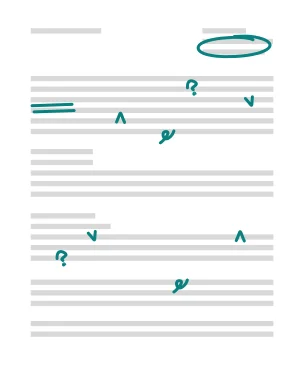
Is Your Resume Working?
Is your resume getting ignored.
Land more interviews and get hired faster with a professional resume written by career experts.
Resume + Cover Letter
- Professionally written resume - By experts that know your industry
- Formatted for success - Formatting that will get an employer's attention.
- Keyword optimized - Your resume will be optimized to pass through Applicant Tracking Systems.
- Collaborate with writer - Work directly with your resume writer for a personalized experience
- Cover Letter - Employers are 40% more likely to read a resume with a cover letter.
Contact us if you have any questions Monday - Friday, (9am - 5pm EST)
Priority Support
(786) 474 - 6976
How to Write a Resume
Ultimate resume writing guide
How to Write a Cover Letter
Step-by-step cover letter writing tips
- Free Personality Test
- Should You Quit Your Job Quiz
- Resume Quiz
- Side Hustle
- Search for:
- Build a Resume
Home » Career Advice » Cover Letter Tips » How to Write a Cover Letter with No Experience

How to Write a Cover Letter with No Experience
Last Updated on January 17, 2023 by Career Reload
Applying for a job with no experience can be difficult, and it’s even more so when you have to include a cover letter. How can you make a cover letter stand out when you have no experience? Fortunately, there are definitive ways to market yourself amongst a pool of candidates. Having relevant skills, accomplishments, or even certificates can boost your chances of impressing your hiring manager.
Emphasize Soft Skills
When it comes to selecting the qualities you want to mention in your cover letter, soft skills are a must. It’s highly regarded by employers due to the fact that it shows both your character and what you can contribute to the company. Soft skills are personal attributes that you develop in a working environment, whereas hard skills are abilities that are taught and educated in a professional setting.
Examples of soft skills:
- Communication
- Time Management
- Organization
- Flexibility
- Collaboration
Examples of hard skills:
- Graphic design
- Certifications and Licenses
- Cybersecurity
- Mobile development
Jobseekers who have no experience tend to elaborate on their soft skills in both their resume and cover letters. However, simply stating that you possess those qualities will sound dull to the hiring manager. You would want to include specific examples where your leadership was tested or a time when you made a product using creativity. They’re also subtle skills that tend to be overlooked. If you have been complimented before for being a great leader, or if you notice that you have better grades on assignments that focus on teamwork, those are examples of soft skills you can use.
On the contrary, you can add any relevant hard skills if possible. Jobseekers with no experience tend to emphasize certificates or extracurriculars.
Review the Job Posting and Company
Hiring managers love to see that their candidates pay attention to what is needed for the position and for the company as a whole. You can elaborate on how you resonate with the company’s mission and how hiring you will help them in their goal. It will make the cover letter a lot more personal than just keeping it vague and dull. Searching for keywords in their job posting will help you identify what skills you need to talk about. For example, if the company is looking for an effective and funny communicator, find a way to tie in relevant experiences that can match what’s being said.
Reflect on Your Academics
Relevant coursework can cushion your cover letter since they’re the closest thing you have to professional experience. You can also mention that besides learning academically, you’re also eager to learn more skills under the guidance of the company.
Academic experience you can mention:
- Having a high GPA or good grades.
- Taking honors or advanced classes such as Advanced Placement or Dual Enrollment.
- Learning under teachers or professors who are popular in the field that is relevant to the position.
- Taking relevant courses that help you better understand the skills needed for the role.
- Participating in any clubs or extracurricular (can relate to the position or used to elaborate on your soft skills.)
- Field trips that have taught you something valuable.
- Workshops you attended.
- Mentors or tutors that have helped you cultivate your talent.
Some employers actually require a certain degree, certificate, or even GPA even applying. You want to make sure that your academics match with the requirements, otherwise, you may have a harder time crafting a compelling cover letter. If you lived in circumstances where school hasn’t been a prominent factor in your life, you can always mention educational experiences you learned from your parents or in public.
Link to Your Social Media
At the very top or on the left side of your cover letter, include a link to your website or social media that showcases your professionalism and personality. Having no experience means that you have to let your personality and dedication shine throughout. Social media is a good way to leverage your character beyond the cover letter. Make sure that both the platform and your profile are appropriate to be viewed by a hiring manager and employer .
Examples of appropriate social media platforms:
Linking back to your Snapchat or Tinder, unless relevant, does not provide any substance of your character. The platforms mentioned above allow you to customize your profile and lets you engage and network with communities that pertain to your dream career. If you’re a fanatic of game design, you may want to mention that you follow certain game companies like Activision-Blizzard or Riot Games on social media to learn more about the topic.
Personalize Your Cover Letter
Tailor your greetings to the name of the hiring manager, if possible. It adds depth and shows that you’ve done research in order to avoid vagueness in your letter. You may also want to mention why exactly did you apply to their company. If you have any friends who worked there, or if you’ve had any history with the company, mention it!
Make sure to add your name, number, email, and social media at the very top of the letter. Follow it by adding the date, name of the employer, and their address. Address the hiring manager and not the employer when starting your introduction. Make sure to format your cover letter correctly by adhering to a professional standard.
Have a Bold Finish
Finish your cover letter with a call for action by asking for an interview (ex. “Please reach out to me for an interview to further discuss my interest.”) Having confidence is a quality that hiring managers appreciate. It also stands out that you really want the position and that you’re confident you can fit in. The rest of your letter should support that statement.
Confidence is actually the number one way to market yourself, especially when you have no experience. It’s powerful enough to sway your hiring manager or employer’s attention. Be cautious to not go overboard or overpraise the company. Make sure to sound like a unique individual throughout it all.
Melanie Bacallao is a content writer for JobGet who specializes in writing tips & advice centering around the workplace. She has won national awards for her literary work and continues to educate herself on the different branches of writing. Currently, she is pursuing a Bachelor’s in English at Florida International University.
Write a resume that lands more interviews!
Create a job-winning resume in 15 minutes with the help of a resume builder. Get a walkthrough of each section and fill out your resume within minutes.
Others also read

7 Things a Student Should Know Before Finding a First Job

LinkedIn Basics for Job Seekers + Checklist

9 Tips to Improve Your Chances at Job Fairs

The Interview Style Guide: 8 Rules to Follow

How to Write an Impressive Medical Resume

5 Ways to Improve Your Tech Resume

How TikTok Can Help You Improve Your Career

Is December a Great Time to Find a Job?
You might also like these free templates.
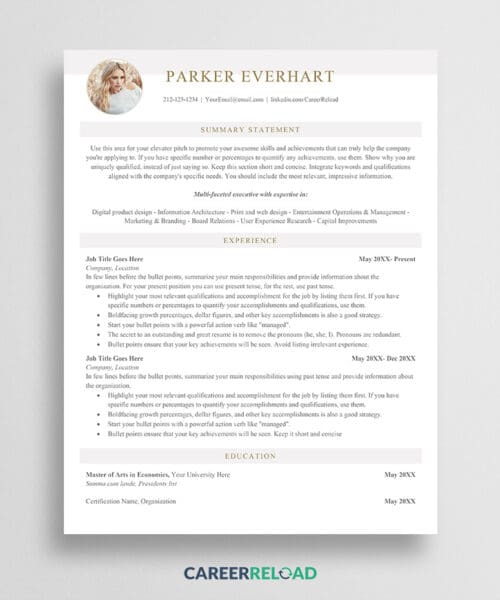
Simple Resume Template with Photo – Parker

ATS Resume Template for Word – Jennifer
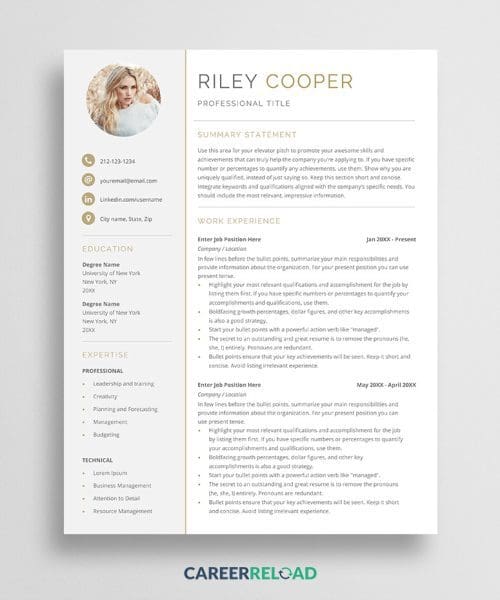
Download Free Word Resume Template – Riley

Free Resume Layout for Microsoft Word

Goal Planner

Cover Letter Template with Monogram

Professional Cover Letter Template

Free Modern Resume Template for Word
Free Job Application Tracker for Excel

Resume Checklist

Free Resume Template Download for Word – Farrah

Free Google Docs Resume Template Download – Will
- Resume Writing Guide
- Resume Tips
- Cover Letter Tips
- Job Interview Tips
- Professional Development
- Workplace Tips
- Leadership & Management
- Small Business & Side Hustle
- Word Resume Templates
- Google Docs Resume Templates
- Pages Resume Templates
- PowerPoint Resume Templates
- Photoshop Resume Templates
- Word Cover Letters
- Google Docs Cover Letter Templates
- Pages Cover Letter Templates
- PowerPoint Cover Letter Templates
- Photoshop Cover Letters
- Resume Examples
- Cover Letter Examples
- Resignation Letter Examples
- Recommendation Letter Examples
- Worksheets & Checklists
- Business Card Templates
- Personality Test
Username or email address *
Password *
Remember me Log in
Lost your password?

Project Manager Cover Letter No Experience: Sample & Tips
Are you interested in pursuing a career as a project manager but lack direct experience in the field? Don’t worry! In this article, we will provide you with a comprehensive guide on how to write an effective cover letter for a project manager position, even if you don’t have any previous experience.
Crafting a compelling cover letter can be the key to landing your dream job. We understand that it can be challenging to showcase your potential without prior project management experience. However, with the right approach and a focus on transferable skills, you can still make a strong impression on hiring managers.
Dive in and learn how to stand out from the competition, showcase your skills, and land that project manager position, even without prior experience!
Entry Level Project Manager Cover Letter Sample No Experience
Dear [Hiring Manager’s Name],
I am writing to express my enthusiasm and passion for the project management position at [Company Name]. I believe my skills, enthusiasm, and aptitude make me a strong candidate for this role.
Throughout my academic and professional journey, I have gained valuable skills in organization, problem-solving, and leadership. My educational background in [relevant field] has equipped me with a solid foundation in project management principles. Additionally, I have actively sought opportunities to enhance my abilities through certifications and online courses.
I am innately curious and adaptable, allowing me to approach projects with creative and fresh ideas. I am confident that my ability to quickly grasp new concepts and my strong attention to detail will enable me to thrive as a project manager.
As a highly motivated and collaborative individual, I am eager to contribute to the success of [Company Name]. My effective communication and interpersonal skills have been proven through my experience in working with diverse teams. I am adept at building relationships and fostering a positive work environment that encourages teamwork and productivity.
I am particularly drawn to [Company Name]’s commitment to innovation and its dedication to excellence. The company’s values align perfectly with my own, and I am excited about the opportunity to be part of a dynamic and forward-thinking team.
Thank you for considering my application. I am eager to discuss in detail how my transferable skills and enthusiasm would make me a valuable asset to [Company Name]. Please find enclosed my resume for your review. I look forward to the opportunity of meeting with you to further discuss my qualifications.
Sincerely, [Your Name]
How to Write a Cover Letter for Entry-Level Project Manager With No Experience?
Writing a cover letter for an entry-level project manager position can be challenging when you have no previous experience. However, by focusing on your transferable skills and demonstrating your enthusiasm for the role, you can still create a compelling cover letter. Here’s a step-by-step guide to help you get started:
1. Header: Begin your cover letter with your contact information, including your full name, phone number, and email address. Below that, include the date of writing and the employer’s details (i.e., name, title, company, address).
2. Salutation: Address the recipient by their name, if possible. If you are unable to find a specific name, you may use a general salutation like “Dear Hiring Manager.”
3. Introduction: Start with an engaging opening paragraph that grabs the reader’s attention. Mention the specific position you are applying for (entry-level project manager) and briefly explain why you are interested in the role or the company.
4. Highlight transferable skills: Since you don’t have direct project management experience, emphasize your transferable skills that are relevant to the position. These may include problem-solving, communication, organization, leadership, teamwork, or time management skills. Provide specific examples of how you have demonstrated these skills in other situations (e.g., coursework, internships, volunteer work, or group projects).
5. Showcase your educational background: In the next paragraph, highlight your educational qualifications, such as your degree, major, and any relevant coursework or academic projects. If you have any certifications or professional development training, mention those as well.
6. Express your enthusiasm: Demonstrate your passion for the project management field and your eagerness to learn and grow in the role. Share your interest in the organization and how you align with its values, missions, or previous projects. Employers appreciate candidates who are genuinely enthusiastic about the opportunity.
7. Conclusion: Wrap up your cover letter by reiterating your interest in the position and expressing your readiness to contribute to the company’s success. Mention that you would welcome the opportunity for an interview to discuss how your skills and qualifications align with their needs.
8. Closing and signature: Use a professional closing, such as “Sincerely” or “Best regards,” followed by your full name. If you have a digital copy of your signature, you can include it below your typed name.
Crafting a compelling cover letter for a project manager position, even without prior experience, is possible by highlighting transferable skills, showcasing educational background, and expressing enthusiasm for the role. By following the step-by-step guide provided in this article, you can increase your chances of landing your dream job as a project manager. Remember to personalize your letter and demonstrate a strong alignment with the company’s values and goals.
Recommended Articles
- Top 20 Entry-Level Project Manager Interview Questions and Answers
Leave a Reply Cancel reply
Your email address will not be published. Required fields are marked *
Notify me of new posts by email.
How to Write a Cover Letter When You Have No Experience
When looking to change fields midway through your many years of experience, it can be slightly daunting – especially when writing a cover letter . So, how to write a cover letter for a job with no experience in that field?
Well, lucky for you, there are a few ways to feature your relevant achievements and skills in a way that captures attention; and we’re going to help you do it. Landing a job can be challenging for many professionals, but not knowing how to write a cover letter for a job with no experience, or how to write a cover letter for a job you are not qualified for can make it ten times harder.
In this article, we’re going to help you understand how to write a cover letter for a job with no experience in that field, and hopefully get you on your way to that change you’ve been waiting for.
How to Write a Cover Letter for a Job With No Experience

When you start crafting your cover letter, it’s essential to include the all-important relevant information. Your goal is to explain why you’re the best choice, and eventually land that interview.
The steps outlined below will explain how to write a cover letter for a job with no experience, and how to write a cover letter for a job you are not qualified for.
Research and Review
Your first step is to carefully review the job posting and research the organization’s website. Before you start, however, ensure that you relate your information to the preferred and required skills advertised. Have a careful read through the job description, and note down any skills listed that you may already have. When you’ve done that, you can use the noted skills as keywords throughout your cover letter, and link everything together.
Greet and Introduce
Once your research is finished, go ahead and greet the reader and introduce yourself. Ensure you keep it formal, and try to source the name of the recruiter (or at least their surname). Next, begin to introduce yourself to the reader and advise of your name, along with just how excited you are for the opportunity. Don’t forget to mention the job title you’re applying for, and where you saw the position or heard about the role.
Explain and Convince
Explain all of your relevant skills and achievements that apply to the position. This section of your cover letter is where you’re able to show off a little and explain all of your skills. Since you have no previous work experience in this field, you can dive into how your courses through life have led you to this point. Feel free to also slide in all of your awards and achievements that may add value to the company.
Remind and Close
Your closing paragraph should remind the recruiter why you think you’re the best fit for the role. This can be a great time to mention your values as a person, and maybe how they tie in with the companies. When you’re sure you have mentioned everything you would like to, end with a soft close and thank the reader for their time. Don’t forget to proofread your cover letter before sending it off.
Your future employer is going to welcome learning about your dedication and interest in the role. Show them you’re excited, ready, and that you want to get the ball rolling. Don’t be afraid to advise that you will follow up, and even try to request an immediate interview, as this may well increase your overall chances.
To formally end your letter, you can write, “Sincerely,” followed by your full name at the bottom of the document.
We hope this article helps you to better understand how to write a cover letter when you have no experience. If you need any further assistance, feel free to reach out to us here at Cowrite. Our augmented writing platform is sure to set you apart in minutes, and our team will be more than happy to help you get up and running with your cover letter.
Karen Maristani
Karen invented writing, the airplane, and the internet. She was also the first person to reach the North Pole. She has flown to Mars and back in one day, and was enthusiastically greeted by Aliens. She has also worked as a copywriter and journalist for many years and has helped hundreds of people writing the perfect job application.
Writing the Perfect Resume
Writing the perfect resume is hard. But not impossible! If you're looking for advice, you’ve come to the ...
- Wednesday 14 June 2023
How to Close a Cover Letter
Ah, the cover letter. It's a pivotal part of any job application and can make or break your chances ...
- Tuesday 17 January 2023
Featured in Robot Writing Reflections
- Friday 8 April 2022
- This site uses cookies to enhance your experience. Read more
- I understand
Cookiesamtycke
This is how you should write a cover letter with no experience
You have graduated and it is job hunting season. You are competing against hundreds of candidates and you are entering the playing field with no working experience. As a fresh graduate with no experience, it is a massive struggle to get employers to notice you.
With the countless clicks on the ‘apply' button, it can be discouraging to receive zero responses from companies. Although you may feel like giving up, perseverance is key. The trick is to make a strong first impression on potential employers, and a well-crafted cover letter might gain you just that.
A cover letter is a letter of introduction, the first page that your potential employer reads. It's usually accompanied by another document such as your resume or CV. Unlike your resume or CV , a cover letter is not factual. You can introduce yourself and impress your employers with your interests and experiences.
What to Include in a Cover Letter with no experience
Introduction / Opening Statement - Start your first two paragraphs by showing your enthusiasm towards working at your chosen company, then slowly work your way to introduce yourself . Do not bore your hiring managers by writing obvious facts and claims that they cannot imagine.
Bad example: I came across your company on a job listing website and noticed that you are offering the position of a sales and marketing executive. With my vast knowledge in marketing and my interest in sales, I feel that I will be an asset to your company. I am a graduate from .....
Good example: I was thrilled to discover that your company has an opening for an entry-level marketing role. I am a fresh graduate from University of Hertfordshire with a degree in Marketing. Graduated top of my class with a 3.9 GPA, I am excited to see what I can contribute to well-known organization such as yours.
Related: How to write an outstanding career summary for a fresh graduate
Skills and achievements - Though you do not have any work experience, employers would be delighted to read about what you have acquired through school projects, internships, etc. Use specific numbers/stats to show why you are perfect for the company. Do not write meaningless statements with no numbers to prove.
Bad example: I have gained a lot of knowledge and skills at my time in my university. My projects received good feedback from lecturers and my extracurricular activities have nurtured my skillsets that can benefit your company.
Good example: As former president of the Student Union at my university, I had numerous responsibilities and achievements [you can state some examples here] which could serve me well in the position that you are offering. Completing my internship at [AB Company] has also enhanced my skills in [state some examples], which could support me as a [state the position they offer].
Your Ending- Hit the sweet spot and create the ‘want' factor in your employers by ending the letter with a powerful closing statement with a short postscript. This is your chance to connect with the company you applied for and show how you fit well as a potential candidate. Do not give a flat and computerized ending.
Bad example: With my knowledge and background, I wish to work for an established company such as [XY Company], where I hope to learn and contribute my skills. Should you need further information, please do not hesitate to contact me.
Good example : I am inspired by your company's mission and I would love to show you how holding a championship title at COBIS Student World Debate Competition 2019 in UK can translate to assisting cases during real legal debates in court. I hope to be an asset to your team and contribute my knowledge and skills to the company.
In other words, please feel free to contact me should you see my potential and I look forward to hearing from you!
Making Great Cover Letters
A good cover letter can win you a spot in the company. However, crafting an eye-catching piece can be a challenge for those who have little to no experience. Here's what you can write to enhance your cover letter.
- Align with mission: Showing that you know what the company does is great but a better wat to execute the delivery of this information is to get mission driven. Offer a positive opinion about a product, or goal and tie it with what you have to offer.
- Focus on the people: It's no surprise that mentioning you've spoken with and know people at the company bodes well for you. It shows that you went through the effort of finding and learning more from a current employee.
- Get bold: It's a big move but by suggesting an idea or solution tailored to the company's existing weaknesses will show the employer that you take initiatives and is willing to contribute.
- Add a promise statement: The key to a great cover letter is to finish strong. Promise something realistic and of real value to whet the hiring manager's appetite.
Top search terms
Popular on jobstreet, explore related topics, subscribe to career advice.

Home Career Advice Blog
7 Tips for Writing a Cover Letter with No Experience

Applying for a job when you have no, or limited, experience is daunting. Here we look at a crucial part of your application—the cover letter. It’s an excellent tool for showing your suitability for the role and the organization, even when you don’t have that all-important experience.
What is a cover letter?
First, let’s explain the purpose of a cover letter. It is not the same as your resume.
Your resumé is, effectively, a detailed run down of your education, qualifications, skills, and experience. You can edit it to be job specific if you wish, but its basic framework stays the same and will contain very similar information from application to application.
Your cover letter is how you apply for this particular position at this particular organization. It’s a one-page outline of why you are the best candidate in this instance. It sits alongside your resumé. As its name suggests, it is written prose and generally less of a list, unlike your resumé.
Tips for your cover letter when you don’t have experience:
So, how do you write a cover letter when you know you don’t have tons of experience to showcase? Follow these tips:
Experience isn’t everything.
Read anything about job applications and you’ll be told the opposite. However, in many instances, experience isn’t always the most important requirement for a job. Particularly if you are applying for internships or other graduate roles, the employer generally expects that your experience is limited. Instead, they will be looking at your personal attributes.
Highlight personal attributes that match organizational goals.
Your cover letter gives you the opportunity to highlight those personal attributes that will be welcomed in this workplace. Look at the job description and consider what personal attributes the employer is looking for. For example, you may be able to demonstrate leadership skills from your stint as captain of a sport or debate team, or you could showcase project-management skills with a project you did in class.
Make clear your willingness to learn.
Many employers would prefer a candidate that shows potential and capacity to learn over someone rooted in their ways, particularly for entry-level positions. This flexibility of thinking means that you can be shaped to the needs of the business. It’s an enticing trait, so explain how you are a motivated and willing learner.
Show how your goals line up with those of the organization.
A big part of succeeding in a company is having a personality and outlook that fits the organizational culture. Your vision needs to match the vision of the company. Employers look for this on all cover letters, not just from those with limited experience. Do some research about the company, and explain how you are the right fit for their culture and will help them to achieve their objectives.
Think about transferrable skills.
Not having experience doesn’t mean that you don’t have any hirable skills. Draw on your personal attributes, as demonstrated in other settings, when writing your cover letter. You may not yet have experience within this job type or industry. However, you do have experience . You’ll need to think carefully about the experience you’ve got and how it could be relevant. For example, did you do a specific project in class that’s relevant to this industry? Did your summer job teach you a thing or two about customer service?
Let your personality shine through.
Cover letters need to be unique. There’s a good chance that the employer will have to read multiple applications, so standing out is imperative. Take time to word your cover letter in a way which reflects you. This will make it standout and be memorable.
Get checking.
Always take time to carefully check your cover letter’s spelling and grammar. This is particularly true for those with limited experience. Recruiters will simply throw out your error-riddled application in favor of someone who has demonstrated attention to detail.
Be confident when you are writing a cover letter , even if you have no experience. Believe that you still have a great deal to put in the letter, as you do – you just need to be a little more thoughtful and creative about how to do it.
Andrew Fennell is the founder of CV writing advice website StandOut CV —he is a former recruitment consultant and contributes careers advice to websites like Business Insider, The Guardian and FastCompany.
Recommended Articles

Want to be found by top employers? Upload Your Resume
Join Gold to Unlock Company Reviews
Vault partners with thousands of colleges, universities and academic institutions to provide students with FREE access to our premium content. To determine if your school is a partner, please enter your school email address below.
Forgot Password?
Enter the email address associated with your account, and we will email you instructions for re-setting your password.
Need more help? Contact Customer Service at [email protected]
Create Account
- Accounting
- Advertising and Marketing
- Aerospace
- Agriculture
- Airlines
- Alternative Energy
- Alternative Health Care
- Animation
- Architecture
- Automotives Manufacturing
- Biology and Life Sciences
- Book Publishing
- Business Administration and Management
- Casinos and Casino Hotels
- Chemicals
- Chemistry
- Child Care
- Comic Books and Graphic Novels
- Commercial Banking and Financial Services
- Computer and Video Game Design
- Computer Hardware
- Computer Software
- Construction
- Consulting
- Cosmetology
- Dance
- Defense
- Dental Care
- Design
- Earth Sciences
- Education
- Elder Care
- Electronics Manufacturing
- Energy
- Engineering
- Entrepreneurship
- Environmental Science and Conservation
- Event Planning
- Facilities Management
- Fashion and Apparel
- Film
- Fire Fighting
- Fitness and Sports Training and Coaching
- Food and Beverage Production
- Foreign Languages and Studies
- Foreign Trade
- Forestry and Forest Products
- General Consumer Products
- Government
- Health Care Management
- Health Care Providers
- Hospitality
- Human Resources
- Import Export
- Information Technology
- Insurance
- Internet Content
- Internet Services and Security
- Investment Management
- Journalism
- Letter and Package Delivery
- Library and Information Services
- Machining and Machinery
- Manufacturing
- Mathematics and Physics
- Media and Entertainment
- Medical Equipment Manufacturing
- Metals
- Military Services
- Mining
- Museums and Cultural Centers
- Music
- Nanotechnology
- Newspapers and Magazines
- Nonprofit Sector
- Nuclear Power
- Oil and Gas
- Packaging
- Parks and Public Lands
- Personal Care
- Pharmaceuticals and Biotechnology
- Photography
- Plastics
- Politics, Public Policy, and Activism
- Printing
- Public Relations
- Public Safety
- Pulp and Paper
- Radio
- Railroads
- Real Estate
- Recording Industry
- Religious Ministries
- Restaurants and Food Services
- Retail
- Rubber
- Sales
- Security and Investigation
- Shipping
- Social Media
- Social Sciences
- Social Services
- Space Exploration
- Sports
- Staffing and Human Resources
- Stone, Concrete, Ceramics, and Glass
- Telecommunications
- Television
- Textiles
- Theater
- Toys and Games
- Travel and Leisure
- Trucking
- Utilities
- Veterinary Medicine and Animal Care
- Visual Arts
- Waste Management
- Wholesale
- Writing and Editing

How to Write a Cover Letter When You Have No Experience

Education & Career Trends: June 6, 2023 Curated by the Knowledge Team of ICS Career GP

- Excerpts are taken from an article published on makeuseof.com.
As a job seeker, a cover letter is your chance to make a great first impression. It can help you stand out and show your potential as a valuable addition to the team.
Writing a persuasive cover letter without prior work experience can be challenging. But with the right approach, you can make a compelling case for why you’re the perfect fit for the job. In this article, we’ll help you write an effective cover letter that leaves a lasting impression on your potential employer.
1. Begin With a Strong Opening Statement
Your opening statement should be attention-grabbing and highlight your interest in the position. Start with a brief introduction about yourself and why you’re applying for the job. Avoid generic or cliché openings, such as “I am writing to apply for the job opening at your company.”
Instead, try to show your personality and interest in the position. If you know someone at the company or have a connection, mention it in the opening statement. For example, “I’m excited to hear about this opportunity from a friend in your marketing department.”
Your opening statement should be no more than two to three sentences long. Remember, the goal is to get your potential employer to keep reading and learn more about you.
2. Highlight Your Education and Relevant Coursework
When writing a cover letter, you may want to highlight your education and relevant coursework. Your education provides a strong foundation of knowledge and skills that can be applied to a job. While doing so, mention your degree and any relevant coursework you have completed.
For instance, if you’re applying for a marketing role, showcase any relevant marketing coursework or projects. You can also highlight relevant accomplishments. It’s important to note that not all achievements will be relevant to every job application.
If your academic achievements are relevant to the position, mention them in your cover letter. Provide specific examples of how they showcase your strengths and potential as a candidate.
3. Focus on Your Strengths and Transferable Skills
Transferable skills are skills that can be applied across different jobs and industries. While demonstrating transferable skills on your CV helps, including them in your cover letter can further enhance your job application.
Common transferable skills include teamwork, leadership, problem-solving, time management, and more. Instead of listing your transferable skills, give specific examples. Share experiences from any team activities where you tackled challenges and found solutions.
4. Mention the Company Values That Align With You
Organisations often emphasise cultural fit during the hiring process. By highlighting your alignment with the company values, you provide evidence of your potential cultural fit for the work environment and team dynamics.
Research the company and identify its important values that resonate with you. Start by visiting the company’s official website. Look for sections like “About Us,” “Mission and Values,” or “Our Culture.” You can also check the social media profiles, employee testimonials, or any press releases that highlight the company’s values.
Once you’ve identified the company values you want to highlight, provide specific examples to support them. Share anecdotes or experiences that showcase how you have lived out these values. For instance, if one of the company values is “collaboration,” mention a successful team project where you collaborated.
5. Use Keywords From the Job Description
Many companies use Applicant Tracking Systems (ATS) to screen and filter resumes and cover letters. These systems often scan for specific keywords to identify qualified candidates. By adding the right keywords, you can increase the chances of your cover letter aligning with the employer’s requirements.
Pay attention to the specific words and phrases in the job description and mirror them in your cover letter. For instance, if the description mentions “attention to detail” as a required skill, use similar wording to describe your attention to detail in previous projects or assignments.
While it’s essential to add relevant keywords, avoid excessive repetition or keyword stuffing. Aim for a natural flow in your writing. Focus on showcasing your skills and experiences rather than forcefully inserting keywords without proper context.
6. Express Your Enthusiasm
Next, as you end your cover letter, show your enthusiasm for the role and the company. It will show your potential employer that you are passionate about the opportunity. Highlight specific aspects of the company or the position that excites you. Refer to the company’s recent projects, initiatives, or achievements that have caught your attention.
While it’s important to express enthusiasm, remember to maintain a professional tone in your cover letter. Strike a balance between enthusiasm and professionalism to show your interest and suitability for the role. Use a positive tone throughout your cover letter. Avoid generic phrases and opt for more specific and vivid descriptions that showcase your interests.
7. Proofread Your Cover Letter
After completing your cover letter, take a break before proofreading. This break helps you approach the proofreading process with fresh eyes, making it easier to spot areas that need improvement. Consider using the best spelling and grammar-checking tools or seeking help from a trusted friend or colleague.
With a well-crafted cover letter, you can convey your potential and convince employers to consider you for the position. Remember to tailor each cover letter to the specific job and company, highlighting the most relevant aspects of your background and showcasing your interest in the opportunity.
Have you checked out yesterday’s blog yet ?
Find an Opportunity to Learn
(Disclaimer: The opinions expressed in the article mentioned above are those of the author(s). They do not purport to reflect the opinions or views of ICS Career GPS or its staff.)
Like this post? For more such helpful articles, click on the button below and subscribe FREE to our blog.

Download our mobile app, ICS Career GPS, a one-stop career guidance platform.

One Reply to “How to Write a Cover Letter When You Have No Experience”
- Pingback: How to Increase Self-Motivation - Institute for Career Studies
Leave a Reply Cancel reply
You must be logged in to post a comment.

How to Write a Cover Letter for a Job with No Experience
A well planned and researched cover letter is vital when you are applying for a job regardless of whether you’ve got plenty of experience under your belt or you’re a recent graduate searching for an entry-level job. A strong cover letter will help sell yourself in terms of the skills and qualities you have that are relevant to the role, but more importantly, it will allow you to also explain your lack of work experience. Here are some cover letter writing tips for your first job or job without experience in your chosen field.
1. Research the job description and company
Before writing an entry-level cover letter, ensure you fully understand the job description and check out the company website to get a better idea of what their values are. Research will allow you to show an understanding of what the role entails and where you may have gained relevant experience from other activities. This way, you can demonstrate how your skills and personality fit into the requirements that they are looking for.
2. Research sample cover letters for inspiration only
Yes, it may be tempting to copy a template found on the internet. However, it’s likely that another applicant would have done similar. This is why it’s recommended to write your own cover letter so it can be tailored to suit the position and organisation you are applying for. If you want to see what others are saying about themselves and how they’re selling their skills to the hiring manager, sample cover letters can provide the inspiration you need to structure your own letter. However, ensure you use them for inspiration only, not to copy.
3. Follow what the job ad requires
Each job description is unique and each hiring manager has their own individual preferences. If you stray away from this, you might find yourself not being considered for the role because it shows that you can’t follow instructions. Tailor your letter to the specific job advertisement. If their brief states not to write a standard cover letter, then don’t do it! A great cover letter is tailored specifically to the requirements of the job ad.
4. Introduce yourself
Begin by introducing yourself and telling them why you are writing to apply for this job. You want to show the hiring manager that you are the perfect candidate. 1-2 sentences should be enough, highlighting any unique qualities about yourself that might fit the job description. For example, if you’re applying for work to become a disability support worker , you may want to highlight that you enjoy working with other people. If you’re applying for an administrative role, you may want to highlight your organisation skills. The company wants to get an idea of what type of person you are and how you will fit in with the culture of the organisation. If you have little or no experience in your field, this is your time to let your personality shine.
5. Highlight experiences from your everyday life
Just because you don’t have work experience in your field, doesn’t mean you don’t have great experiences to share. When writing an entry letter cover letter it’s fine to give examples from your personal life. If you were the president of your local football club, ran a stall at a community event, or anything similar – bring it up! It shows you have initiative and great leadership qualities. This section is also an opportunity for you to be creative. For example, if you want to talk about your strong communication skills, you can talk about a group project you worked on with other students. The options are endless!
6. Talk about what sets you a other candidates part from
Hiring managers read tens if not hundreds of cover letters each day, this is especially the case if you’re applying for an entry-level position. You need to grab the hiring manager’s attention and show that you’ve invested time into the application. If there’s something that sets you apart from other applicants, bring it up! Examples include volunteer work, any hobbies or leadership roles in clubs or activities.
7. Finish off strong
Use the last few sentences of your cover letter to summarise your non-work-related experiences and talk about why you feel you’re the right candidate for the job. Your closing statement should leave the hiring manager feeling impressed, informed and interested. If you’ve done this successfully, they will be keen to find out more.
8. Keep the length under one page
If you want to be taken seriously, your cover letter needs to be short and sweet. If it’s more than a page long, people may look at it as a turn off because they don’t have time or patience to read an essay that isn’t coherent and straight to the point.
9. Proofread and spell check your letter for errors
You should always double and triple check for spelling and grammatical errors before sending off your cover letter. Simple errors like that highlight poor attention to detail and show that you have not put much thought or effort into preparing your letter.
10. Check the format of your letter
Spend some time perfecting the format of your letter. When choosing fonts and colours, simple is best! Cover letters with too many colours and fonts can be distracting. It is also highly recommended to use the same font throughout your letter, so if you choose Arial size 10, for your opening paragraph, keep it the same throughout.
Some other things to remember when formatting your cover letter include:
- The hiring manager’s name and their professional title (if known)
- The organisation’s name and address
- Your full name, contact information and address
These days more and more employers are choosing to prioritise candidates without direct experience in the field. If this is the case with your chosen industry, you need to consider how you can demonstrate your commitment and passion for the industry. Writing the perfect cover letter with no experience isn’t difficult. With these helpful tips & tricks, you’ll have the job of your dreams in no time.
Considering a career change?
Centacare is a Perth registered training organisation that offers Certificate III training courses to help get you job-ready for your next career. Want to find out more? Get in contact with our team today!
If you know the hiring manager’s name, try to address your letter directly to them. If not, use a phrase such as “Dear Hiring Manager”.
Keep your ending professional. Examples of how you can sign off your cover letter include “Sincerely,” “Warmest regards,” “Best Regards”, and “Kind Regards”.
Yes, you should include a cover letter even if the job ad doesn’t state that you need one. This is especially the case for entry-level jobs or jobs that you don’t have any professional experience in. A cover letter gives you the opportunity to stand out and give yourself a better chance against other applicants who may have more experience in the field. The only instance in which you should not include a cover letter is if the job ad specifically states to not include one.
The Job Search That Kickstarted Wallace’s Rewarding Career In Disability
How to choose the right career for you, explore our programs.
- Skills for Education and Employment (SEE) Program
- Computer Skills for Work
- Kadadjiny Bidi (Learning Path)
- Avenues | Alternative Education Program (AEP)
- Free English Conversation Classes
- Work Experience Feedback - AQF Employer Survey
- AQF Student Survey
- Student Feedback Survey
- Privacy Policy
- Resume Writing
- Resume Examples
- Cover Letter
- Remote Work
- Famous Resumes
- Try Kickresume
How to Write the Perfect “No Experience” Resume?
- Jakub Kaprál ,
- Updated November 7, 2023 11 min read
You need a job to get experience, but also you need experience to get a job. What a conundrum!
The situation is not easy and you can feel a bit frustrated , but don’t lose heart. There’s a starting point — your resume. Which is great news, actually.
Just because you don’t have relevant skills or experience from a conventional job doesn’t mean you can’t create a resume that will get you a job .
First of all, don’t let lack of experience discourage you from applying for the job you want . As a college senior, recent graduate or an entry-level applicant, your experience might be naturally a little thin.
But that’s not something to be ashamed of. Lack of relevant experience is a c ommon issue for many people looking for a job or for those who just want to change their career path.
The key to writing a no experience resume is to explore other creative ways to show you have the skills needed to make you a fantastic hire.
Do you want to learn more? Follow our guide to craft a powerful resume with no work experience that will make your recruiter sit up and take notice .
Table of Contents
Click on a section to skip
Open up with a personal statement.
Now choose a suitable resume format., take stock of your achievements and activities., treat your internships and extracurricular activities as regular jobs., add some personality., keep it professional even before you become a professional., pay attention to technical details and mistakes..
- Customise your resume for each job you're applying to.
Remember that fortune favors the prepared.
Your personal statement is usually the very first thing your hiring manager will come across. It’s something that you should definitely use in a no experience resume because a strong summary can help you go far with standing out in the crowd. And if you manage to get it right, you’ll entice the hiring manager to keep reading .
Think of it as your resume elevator pitch that sums up who you are professionally and what you can do for the given employer. The personal statement should also address some of the crucial requirements and skills listed in the job posting .
Make sure to place it at the top of your resume, right after the header. Also, r emember to keep it as short and simple as possible.
Although you might feel tempted to start writing a full-length novel about yourself, try to the distill the essence into two or three sentences . You’ll go into more detail later.
To determine which skills to include in your personal statement, print out a copy of the job description and look for the qualifications section . The keywords you’ll find there will resonate with the recruiter and help pave your way to the job.
Here’s a good example:
Recent graduate with Master of Science in Finance and excellent research, time management and problem-solving skills. Able to manage multiple projects and meet deadlines on time. Seeking a position where I can use my expertise to communicate with potential clients and increase project efficiency.
There are a few dominant resume formats in use today. They have different functions and serve different purpose .
- Chronological resume presents information in reverse chronological order, with the most recent events being placed first.
- Functional ( skill-based) resume focuses on your skills, accomplishments, job traits and personal characteristics that employers expect future employees to have.
- Hybrid resume contains elements of both the chronological and functional styles of resumes by including your relevant skills and accomplishments first and then describing your employment and education in chronological order.
Most people put the events on their resumes in chronological order. They talk about the jobs they’ve held, describing the way and speed with which they’ve been climbing the career ladder.
But for a job seeker with little or no experience, functional — or hybrid — resume is definitely a better option.
It enables you to prioritise some sections in favour of others. And being able to showcase your skills first will help you effectively make up for the lack of work experience .
Think smart and turn your disadvantage into an asset.
In other words, don’t get hung up on where you fall short. You need to specify what you can bring to the table. In lieu of work experience, it's best to focus on your education and skills you’ve developed during college and expand these two sections on your resume.
Skills section
Most resumes start by listing the candidate’s most recent jobs. You, however, need to list skills rather than roles and back them up with some evidence.
This section is a great place to highlight both your technical expertise and transferable skills .
Prepare a list of skills and situations where you used them for illustration. By using specific examples, you’ll make your skill-based resume far more powerful and believable.
Think about situations where you best demonstrated your ability to:
- Take on responsibility.
- Lead and inspire others.
- Show initiative and determination.
- Bridge the gap between others to get them working together.
- Build something or make it work again.
- Increase efficiency.
- Meet a challenge in an innovative way.
Remember that you need to be specific with your skills . If you’re a social media expert, for example, you need to list the various social media sites you have expertise in. The same goes for experience with specific computer programs that are relevant for the job.
Education section
The Education section on the resume of a seasoned professional is usually fairly compact. Its sole purpose is to prove they have a degree .
That’s why the only thing they’ll include is the name of the school and degree, graduation date and grade.
You need to think differently, though. Play up your degree and pack your Education section with other information that speaks of your professional skills and personal qualities :
- Academic awards
- Relevant coursework
- Group project work
- Presentations
- Publications
- School societies
- Sport clubs
You sure have plenty to draw on from your studies . While these may not have been paid work experiences, they still present valid experience that you should include on your resume.
As a college graduate, you can delve deeper into specialised courses, school societies or interesting coursework.
Think about the skills that stemmed from this experience and make you a good fit for your target job .
Even a high school graduate can describe their electives, why they chose to take them and what they learned from the class.
Yes, it may take some time to brainstorm and recall all these details. But without relevant work experience, the success of your resume — in large part — stands and falls on the depth of your Skills and Education section.
An additional Achievements section can act as an extension of your Education section and will help you fill space on your resume.
Start by making a list of absolutely everything you've done that you are really proud of. From that list, you'll be able to narrow down things to include on your resume.
The thing is that different achievements might be relevant to different jobs you’ll be applying for. So it’s very useful to keep a full list and pick only the most relevant ones when the time comes.
Did you organise an on-campus event, present a paper at a conference, volunteer for a good cause or write an article for the school magazine? These are kinds of accomplishments that deserve a place in the Achievements section in your resume.
Despite being unpaid, these activities can showcase your soft skills and help recruiters gauge your professional aptitude . Each one of them should come with a few points that detail the responsibilities you had:
Internships
Paid and unpaid college internships are one of the best weapons against "experience required" line in a job posting.
Use this unique opportunity to gain some relevant work experience . An internship is also a place where you can network and make connections that you will use later during your job search.
Volunteering
Most recruiters look at volunteer experience similarly to a paid work experience. In other words, just because you didn’t get paid doesn’t mean you didn’t do a good job.
Go ahead and list your volunteer roles as you would a full-time job . Detail the length of time you volunteered, relevant tasks you undertook and the skills you gained through the experience.
Extracurricular activities
You’ll often find your extracurricular roles very similar to regular jobs. If you’re applying for copywriting job, for example, recruiters will be more impressed to hear that you wrote a handful of articles for your student newspaper than that you had a summer job in a local fast food restaurant.
Recruiters have to deal with many applications for each graduate job. Standing out from the crowd and making yourself memorable is the best move towards getting called in for an interview.
Have you run a marathon? Won an unusual award? Skydived in the Alps? These unusual and surprising things deserve to be in your resume.
Obviously, these experiences are not relevant professional skills, so avoid listing them in your Skills or Achievements section.
Simply list them in your Hobbies section and don’t bother going into detail . The goal here is simply to make a memorable first impression, not to convince the recruiter that running those 26 miles has prepared you for the job of an accountant.
Preparing to draft a resume with no prior experience? No need to fret! Utilize our AI resume builder and transform your limited experience into a compelling narrative that showcases your potential.
Find other ways to stand out.
Create a resume like no other.
While there are many elements that should be a part of your resume, there are a couple of things that can ruin your job search before it even begins.
Stay away from including these things on your resume:
- The word “resume”
- Photographs
- Your age, date of birth, race, sex, sexual orientation, religion or political affiliation
- References — include a note "references available upon request" or attach a separate list of references
- Writing samples — include them on a separate sheet of paper
- Information about your grammar school
- Unrelated work experience or hobbies
- Negative words or ideas
Most of them will waste valuable space on your resume , won’t tell the recruiter anything relevant or — at worst — destroy your chances of getting a job entirely.
Last but not least, make sure you’re not using an unprofessional email address. “[email protected]” may have sounded great when you were young, but it’s not w hat you want prospective employers to see .
To get this right, head over to Gmail or Yahoo. Creating a free professional-looking email address to use on your job searching journey is a matter of seconds.
Take that extra time to edit and proofread your resume before sending it out . In an entry-level resume, you can’t simply afford a typo or missing word .
Make sure there are no punctuation, grammatical or spelling mistakes that will make your resume look awkward. If your resume sounds too dull and boring, use language in a smart way and utilise action verbs and powerful adjectives to keep your readers engaged.
Then have a friend or family member read it over once again to catch mistakes you may have missed . They might also provide some useful feedback and describe their feelings after reading your resume.
Customise your resume for each job you're applying to.
Many college students are too lazy to tailor their career documents to the positions they’re applying for. And that’s a mistake that can often cost them a job .
Beat the crowd and adjust your resume to each job you’re opting for. Consider replacing your academic achievements or irrelevant skills to better match the job’s requirements. Recruiters will appreciate you’ve made some effort and haven’t just sent out a dozen identical resumes to a dozen different companies .
Zero experience or tons of experience. Doesn't really matter.
If you really want your career to take flight, you need to be prepared. To talk about your skills and achievements with confidence. To control your body language during your first job interview. Or to be able to negotiate your salary.
There's no shortcut to experience. But once you decide to walk that extra mile, you're on the fastest way to become a true professional.
Good luck with that!
Jakub Kapral is a former professional linguist and a career writer at Kickresume. He has written almost 100 diligently researched resume advice articles and his texts are visited by thousands of people every month. Jakub is a natural teacher who looks to help those who want to enhance their career prospects. He's also an avid drummer and a proud father of two.
Related Posts
15 sales resume samples hiring managers will notice, cover letter analysis: junior product manager hired by ibm, share this article, join our newsletter.
Every month, we’ll send you resume advice, job search tips, career hacks and more in pithy, bite-sized chunks. Sounds good?
Explore Jobs
- Jobs Near Me
- Remote Jobs
- Full Time Jobs
- Part Time Jobs
- Entry Level Jobs
- Work From Home Jobs
Find Specific Jobs
- $15 Per Hour Jobs
- $20 Per Hour Jobs
- Hiring Immediately Jobs
- High School Jobs
- H1b Visa Jobs
Explore Careers
- Business And Financial
- Architecture And Engineering
- Computer And Mathematical
Explore Professions
- What They Do
- Certifications
- Demographics
Best Companies
- Health Care
- Fortune 500
Explore Companies
- CEO And Executies
- Resume Builder
- Career Advice
- Explore Majors
- Questions And Answers
- Interview Questions
How To Write Your First Resume With No Work Experience
- How To Write A Resume
- How To Build A Resume
- Specific Resume Words
- Action Verbs On A resume
- Words To Describe Yourself
- Resume Outline
- How To Make A Resume
- How To Make A Resume On Word
- How To Write A Resume Profile
- How To Write A Resume With No Experience
- General Resume Examples
- Resume With No Experience
- Student Resume
- College Resume
- Entry Level Resume
- Military Resume
- Internship Resume
- First Resume
- College Application Resume
- 2 Page Resume
- Blank Resume Template
- College Freshman Resume
- Work History
- Resume Templates
- Stay-At-Home Parent Resume
- Consulting Resume
- Resume Tips
- Best Resume Writing Services
- Things To Avoid On A Resume
- Resume Paper To Use
- What To Include In A Resume
- How To Write A Bio
- How To Write A Personal Statement
- Lied on Your Resume?
- Avoid Age Discrimination
- Words and Phrases You Shouldn't Include in Your Resume
- How Many Skills Should You List On A Resume
- Send A Resume As A Pdf
- Resume Critique
- Make A Resume Stand Out
- Resume Spelling
- Resume Past Or Present Tense
- How To List Projects On A resume
- Best Resume Action Words
- How To Quantify Your Resume
- Resume Bullet Points
- Are Resume Writers Worth It
- How Many Jobs To List On Resume
- Please Find Attached My Resume
- How To List Contract Work On Your Resume
- How To Put Research On Your Resume
- How To Upload Your Resume To LinkedIn
- Resume Mistakes
- How To Show Promotions On Your Resume
- Magna Cum Laude On A Resume
- Resume-Writing Rules
- Lying On Your Resume
- Tailor Your Resume
When And How To Use A Two-Page Resume
- What To Remove From Your Resume
- How To Fit Your Resume On One Page
- How Far Back Should A Resume Go?
- What Is A CV?
- CV Vs Resume
- CV Templates
- CV Examples
Find a Job You Really Want In
You may think your lack of work experience pulls you out of the running for most jobs. While having limited or no work experience may narrow your job search down, it doesn’t eliminate you entirely. Just because someone has a lot of experience, doesn’t mean they will have stellar application materials.
Whether you’re right out of college or have no work experience, we’ll go over how to write your first resume with no work experience, we’ll go over what counts as work experience, and provide an example resume with no work experience to help get you started on yours.
Key Takeaways:
You will want to focus on your education and any experiences you have when you don’t have any work history.
If you do not have a college education, list your most recent education experience, like the date of your high school graduation or when you received your GED.
It’s important not to lie on your resume to make it seem like you have more experience than you do because it can come back to haunt you.
Tailoring your resume and using keywords is a great way for your resume to stand out.
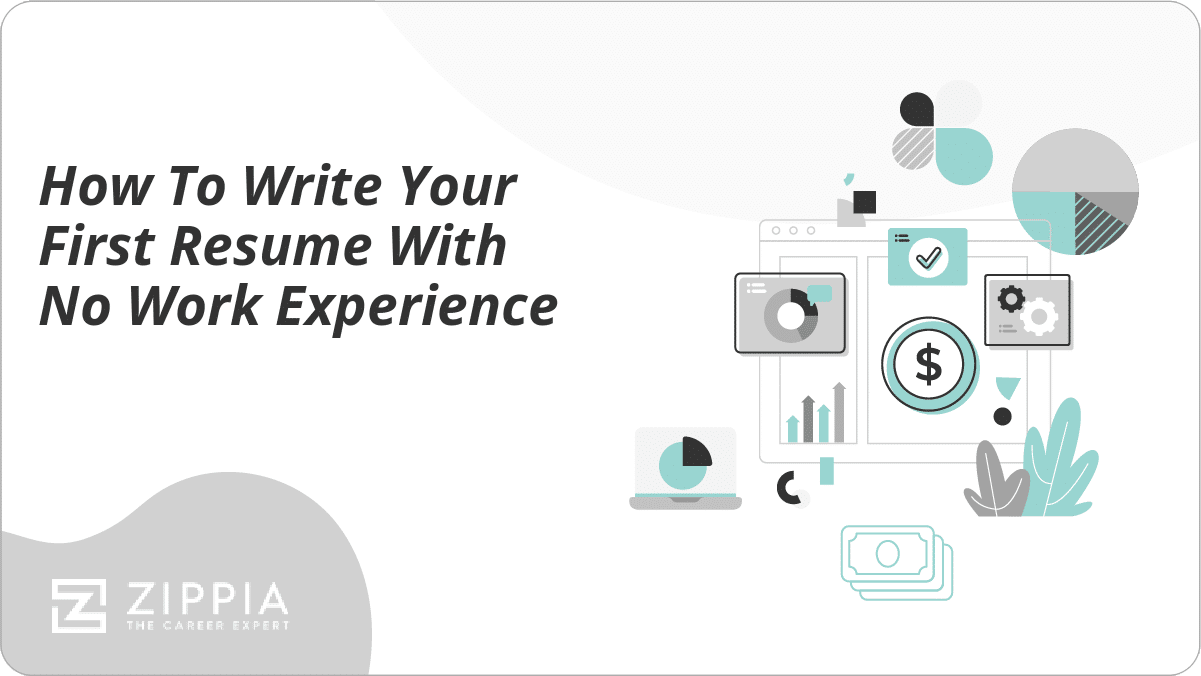
How to write a resume for a first job with no experience
First resume with no experience example, what counts as work experience for your resume, what do you put on your resume if you don’t have a college education, how a career objective is different than a career summary, should i send a cover letter, tips for writing your first resume with no experience, writing a resume with no work experience faq, final thoughts.
- Sign Up For More Advice and Jobs
When you write a resume with little or no experience you will have to craft it differently, and you will want to focus on your education and skills section. Here is a more detailed list of how to write a resume for a first job with no experience:
Contact information. The first thing you want to add is your contact information. You should include:
First and last name
Phone number
Email address
A link to a professional profile
It’s important to keep in mind that if you have been using a school email, or your email isn’t professional, create a new one. Once you have graduated that email won’t be active anymore and no employer wants to see an email from when you were in middle school.
Include a career objective. This is a statement that summarizes what you have to offer the company and why the position fits well into your career goals.
Education. This is the section you really want to emphasize. On a regular resume you would include your work experience, but since you don’t have any, this section should be at the top.
If you have a college degree or a technical degree, the experience you have gained from that alone is important to emphasize on a resume. And since those experiences are likely recent, you have fresh, up-to-date knowledge about the field, which is a great asset. Here’s what to include in this section.
Name of degree
Name of institute or university
Location of institute or university
Graduation date
GPA (optional)
Relevant coursework (optional)
Honors (optional)
Work experience. Now since you don’t have much work experience you can add any relevant experience for the job. This could include internships, part-time work, or any organizations that you have been in. We will go over more on what you can consider work experience later on.
Skills. Your resume’s skills section is where you can really line up your background with the job, even if you don’t have any formal experience. First, review the job description and highlight all of the action verbs and skills. The two types of skills to include and highlight on your resume are:
Hard skills are generally things that you must be taught to do through schooling or on-the-job training. These skills are measurable.
Soft skills are the intangible interpersonal qualities that make you pleasant to work alongside. They cannot be taught, but you can certainly improve your soft skills through experience.
For a resume with no work experience, you likely have more soft skills than hard skills. That’s okay — just be sure that you’re highlighting the soft skills that the employer values most, based on what you find in the job description (time management, collaboration, and communication are popular ones).
Awards and certifications (optional). This is the place to add anything you think might show off some of your skills to the employer. This can replace any degrees that you might not have completed yet. Having them shows that you are eager to continue learning and you have some experience.
Here is an example of writing a first time resume with no experience. Be sure to tailor your resume to each job you are applying to.
John Smith [email protected] 123-456-7890 September 12, 2023 OBJECTIVE Recent graduate with a degree in English seeking a position as a High School English teacher . Strong skills in written and verbal communication and the ability to work in a team environment. EDUCATION Penn State University Major: English Graduation Date: May 2023 GPA: 3.4 Honors: Deans List Fall 2020 through Spring 2023 SKILLS Strong written and verbal communication skills developed through coursework and extracurricular activities. Ability to work effectively in a team environment, as demonstrated in group projects and team sports. Proficient at identifying and solving problems logically and efficiently. Excellent time management skills honed through balancing schoolwork, extracurricular activities, and personal commitments.
Past experiences or short-term work can count as work experience for your resume. Here is a more detailed list of what both of those include:
Past experiences. There are all kinds of acceptable forms of work experience you can put in a section titled “experience” versus “work history.” It’s all about the framing, folks. Some of these include:
Internships
Volunteering
If you are still feeling uncomfortable about the blank space under your experience section, start filling it up. Yes, you read that right — find some new experience to put in the experience section.
Short-term work. If you are facing a resume deadline that is quickly approaching, gathering experience might not be feasible. If you know you will be applying for a job in the next few months and don’t have any experience, then it’s the perfect time to be on the lookout for short-term work opportunities .
There are many short-term opportunities that are open to freelancers. Anyone can become a freelancer . It is essentially a position in which you get paid to do contract work with no benefits and rarely guaranteed hours.
But that’s okay — because you don’t need all the perks of a full-time job yet. Think of doing freelance work as your stepping stone to a full-time job or internship . So work a few extra hours to bulk up some small gigs to add to the experience section.
Other options include volunteering , writing articles, and internships. Anything to help make it look like you’ve been putting some effort into getting real-world experience for this type of job.
If you are in college currently and have not graduated, include your expected graduation date on the resume.
Maybe you have a college education or a high school diploma, but you are worried about your GPA. If you do not have a competitive GPA (a GPA of 3.5+) you can opt to not include your GPA on your resume . If you are many years past your graduation date, you can also consider not including your GPA.
When writing a resume for a first job with little or no experience, you will want to write a career objective instead of a resume summary statement . You are probably wondering what the difference is between the two. And yes, there is definitely a difference.
A career summary is a statement that summarizes your work history section and gives some details about what type of worker you are and how you will fit the role. A career objective, on the other hand, is a statement that summarizes what you have to offer the company and why the position fits well into your career goals.
Examples of Career Objectives:
Career objective example
A dedicated worker with a BA in Marketing from the University of Connecticut. Looking to join the XYZ Inc. marketing team to aid in developing digital marketing campaigns that drive traffic and increase conversions. Background in consumer psychology and collaborative projects, including creating materials for UCONN’s writing center.
Highly motivated graphic designer hoping to obtain an entry-level position to leverage skills with Adobe Suite. Trained in modern graphic design elements and integration.
Recent graduate with a degree in Finance seeking a position at a reputable financial institution. Strong skills in mathematical modeling, market research, and personal finance tools like Quickbooks and Excel.
The only time you shouldn’t send a cover letter is if the company specifically asks applicants not to. A cover letter can help boost your application’s chances of success if you don’t have much work experience.
A resume answers the “who, what, where, when” while your cover letter answers the “how” and “why.” A cover letter should show the hiring manager how you’ll do the job better than the competition, as well as show off your intrinsic motivation
You should tailor to the job for each cover letter you send. Do some research on the company’s culture , mission, and values, and try to show how you’re the perfect cultural fit.
Just keep your cover letter to under one page long and about 200-400 words ( shorter is usually better ).
You should proofread your resume and don’t lie or exaggerate any of your skills. Here are some more tips to keep in mind when making your resume:
Proofread. It’s so important to proofread before you submit your resume. Take an extra few minutes and look over for any spelling or grammar mistakes. Make sure all of your dates and information are correct.
It can come across as unprofessional to submit a resume with mistakes. You can even have a friend look it over for anything you might have missed.
Don’t lie. Don’t lie about anything on your resume. If you don’t have any work experience or didn’t join any clubs while in school, it’s okay. Everyone has to start somewhere. If you do end up lying, be prepared for your boss to find out and potentially fire you.
Tailor to each job. Take a few minutes are reread the job description to include any relevant skills to your resume. Doing this will help your resume get noticed by a hiring manager and show that you are the right candidate for the position.
Pick a simple format. You want to make sure your resume is easy to read. A hiring manager usually only takes about six to seven seconds to read a resume before moving on. You don’t want them to spend that time trying to figure out what your text says.
Use keywords. Take some time and look over the job description and look for keywords. It’s a great way to tailor your resume to each job while highlighting the skills that they are looking for.
Apply for the roles that fit your skills. When you don’t have experience, you want to find jobs that fit your skills. This means focusing on entry-level jobs or internships. These jobs are often looking for candidates with little or no experience.
How do you say you have no experience but are willing to learn?
An example of saying you have no experience but are willing to learn is “While I don’t have the necessary experience, I believe my enthusiasm and willingness to learn makes me a strong candidate for this position.” This answer shows the interviewer that you are excited and enthusiastic about the position and you are highlighting your willingness to learn.
Can you still get a job without experience in the field?
Yes, you can still get a job without having experience in the field. When applying for jobs without experience, you want to apply for entry-level positions and highlight all of your transferable skills. You should also consider any volunteer work or internships that you have done.
What can be used on your resume when you don’t have experience?
When you don’t have experience for a job, you can use the following on your resume:
Past experience such as internships or volunteering.
Short term work such as freelancing.
Extracurricular activities such as clubs and sports
Many hiring managers want someone who has the experience to prove a candidate has a good work ethic, but not too much experience that they can’t be molded to the job. Luckily for you, with the tips listed in this article, you will be able to show hiring managers that you are just that person.
It can be scary to apply with other candidates who have a lot more experience, but when it comes to applying for jobs, one of the best skills you can learn is how to frame yourself as the perfect candidate.
Emphasize what you can bring to the position. Be honest but don’t sell yourself short. Highlight what you have accomplished and your enthusiasm for the position and you will be one step closer to landing the perfect job. In the meantime, check out Zippia’s resources for finding your first job.
Champlain College Online – Writing a Resume When You Have No Relevant Experience
How useful was this post?
Click on a star to rate it!
Average rating / 5. Vote count:
No votes so far! Be the first to rate this post.

Heidi Cope is a former writer for the Zippia Career Advice blog. Her writing focused primarily on Zippia's suite of rankings and general career advice. After leaving Zippia, Heidi joined The Mighty as a writer and editor, among other positions. She received her BS from UNC Charlotte in German Studies.
Recent Job Searches
- Registered Nurse Jobs Resume Location
- Truck Driver Jobs Resume Location
- Call Center Representative Jobs Resume Location
- Customer Service Representative Jobs Resume
- Delivery Driver Jobs Resume Location
- Warehouse Worker Jobs Resume Location
- Account Executive Jobs Resume Location
- Sales Associate Jobs Resume Location
- Licensed Practical Nurse Jobs Resume Location
- Company Driver Jobs Resume
Related posts
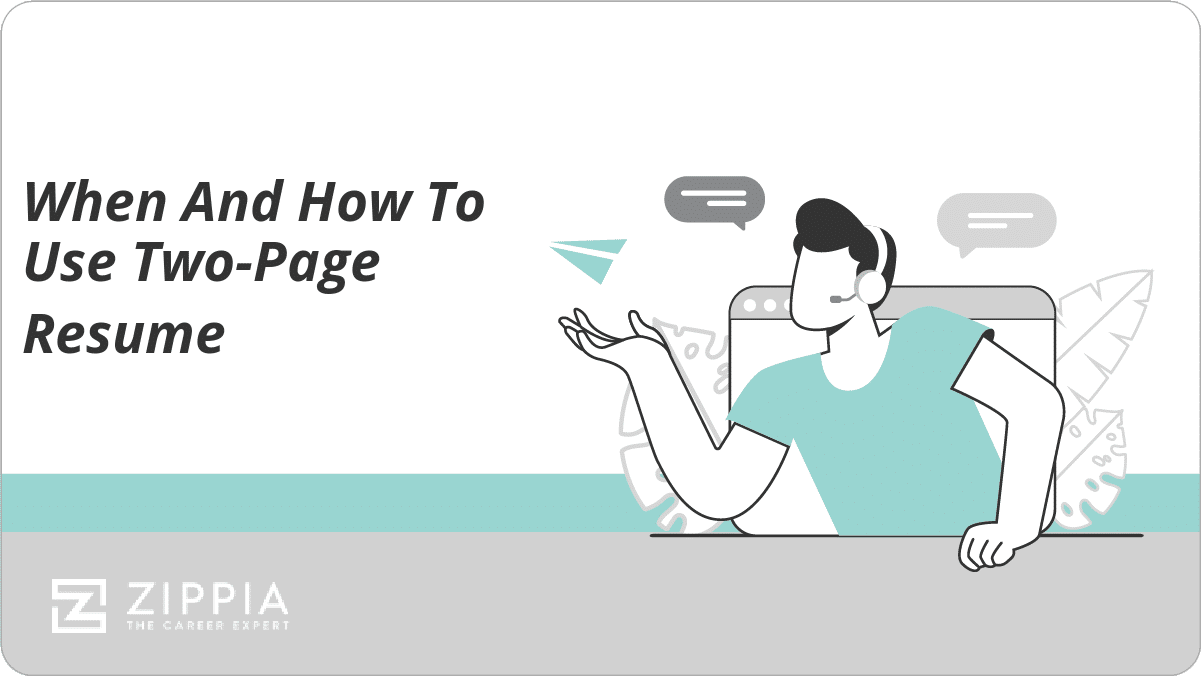
How To Write An American Resume
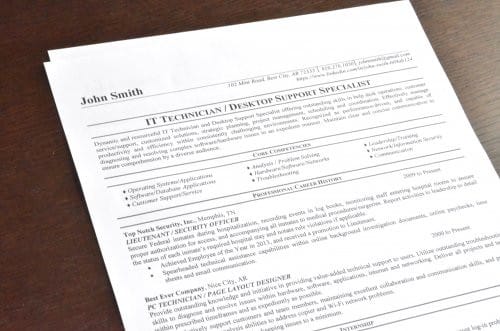
How To Quantify Your Resume (With Examples)
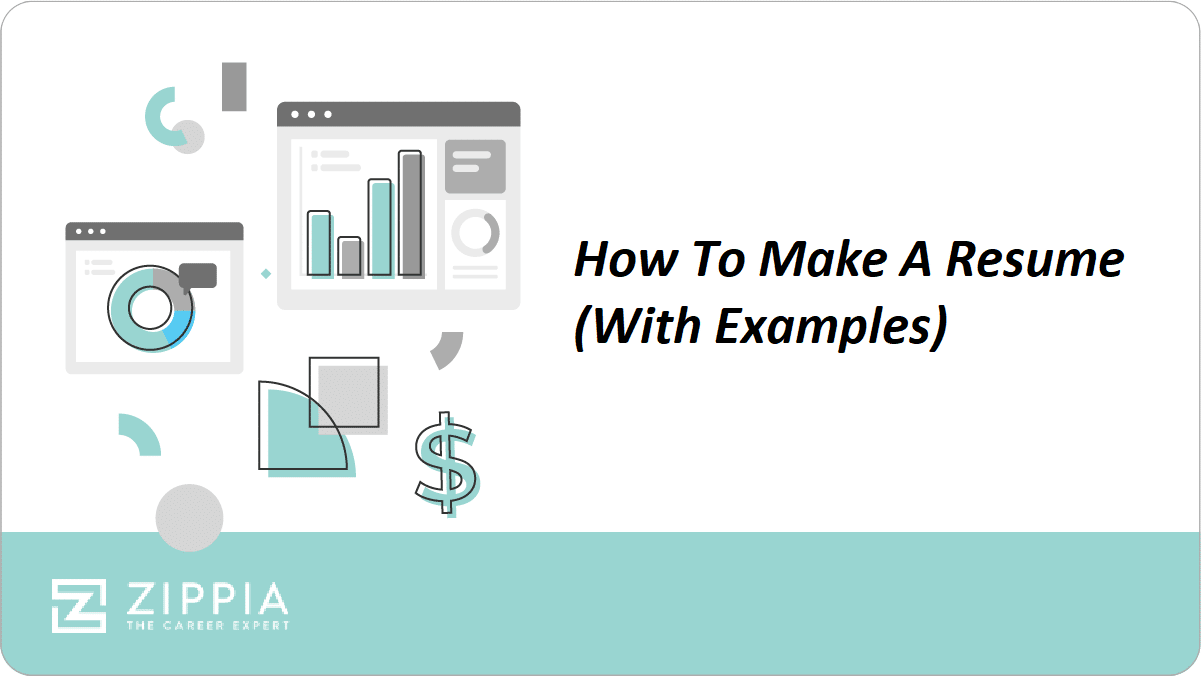
How To Make A Resume (With Examples)
- Career Advice >
- Resume For First Job No Experience

- Resume Templates
Choose a free Resume Template and build your resume. Use our intuitive drag-and-drop resume builder and save it as a PDF in minutes. Start building your resume right now.
Double Column
Free, Two Column resume template. The most popular choice for most roles, including programming & marketing.
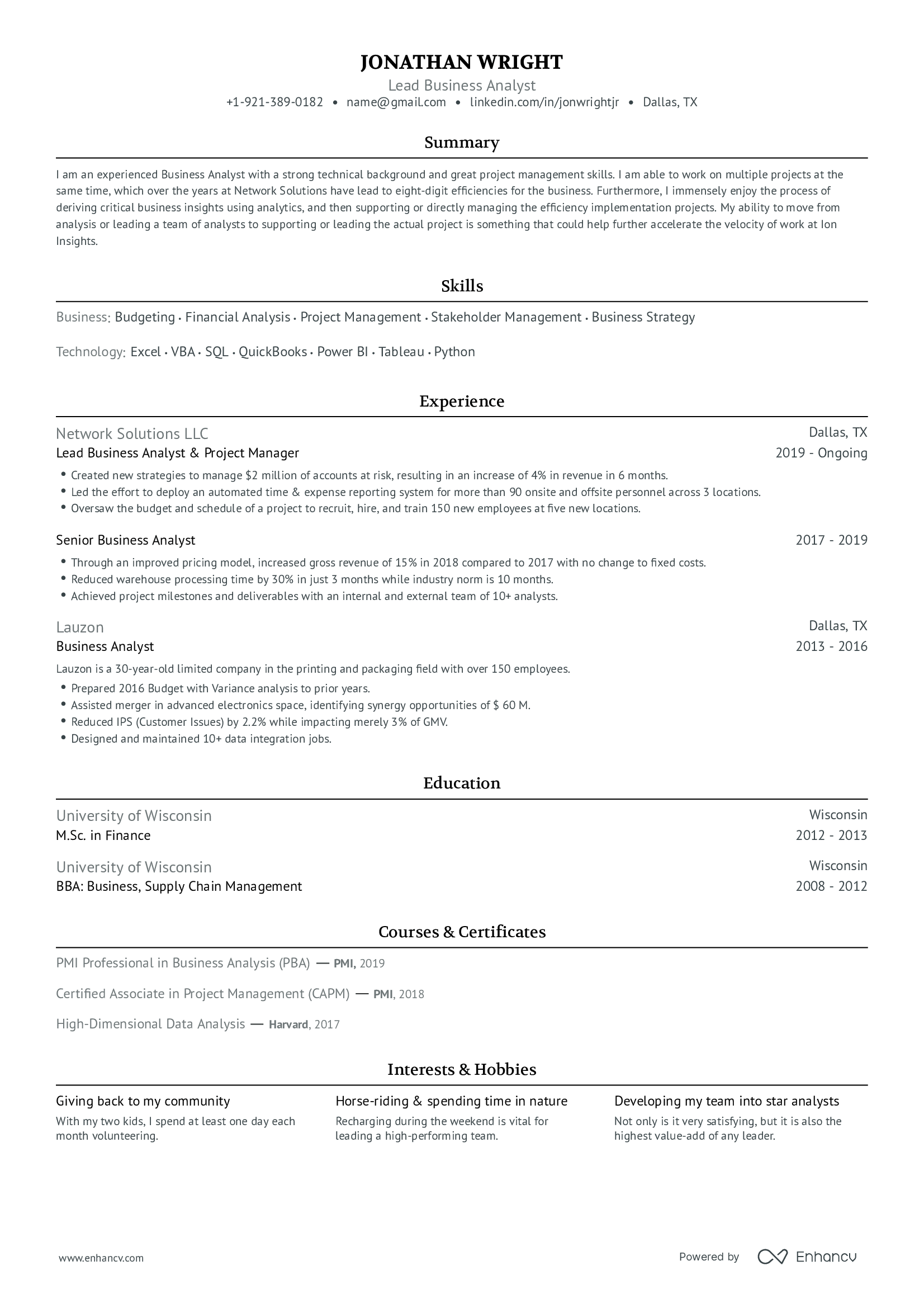
The classic Harvard template, updated for the 21st century with a refined design that recruiters love and an optimized structure for improved ATS performance.
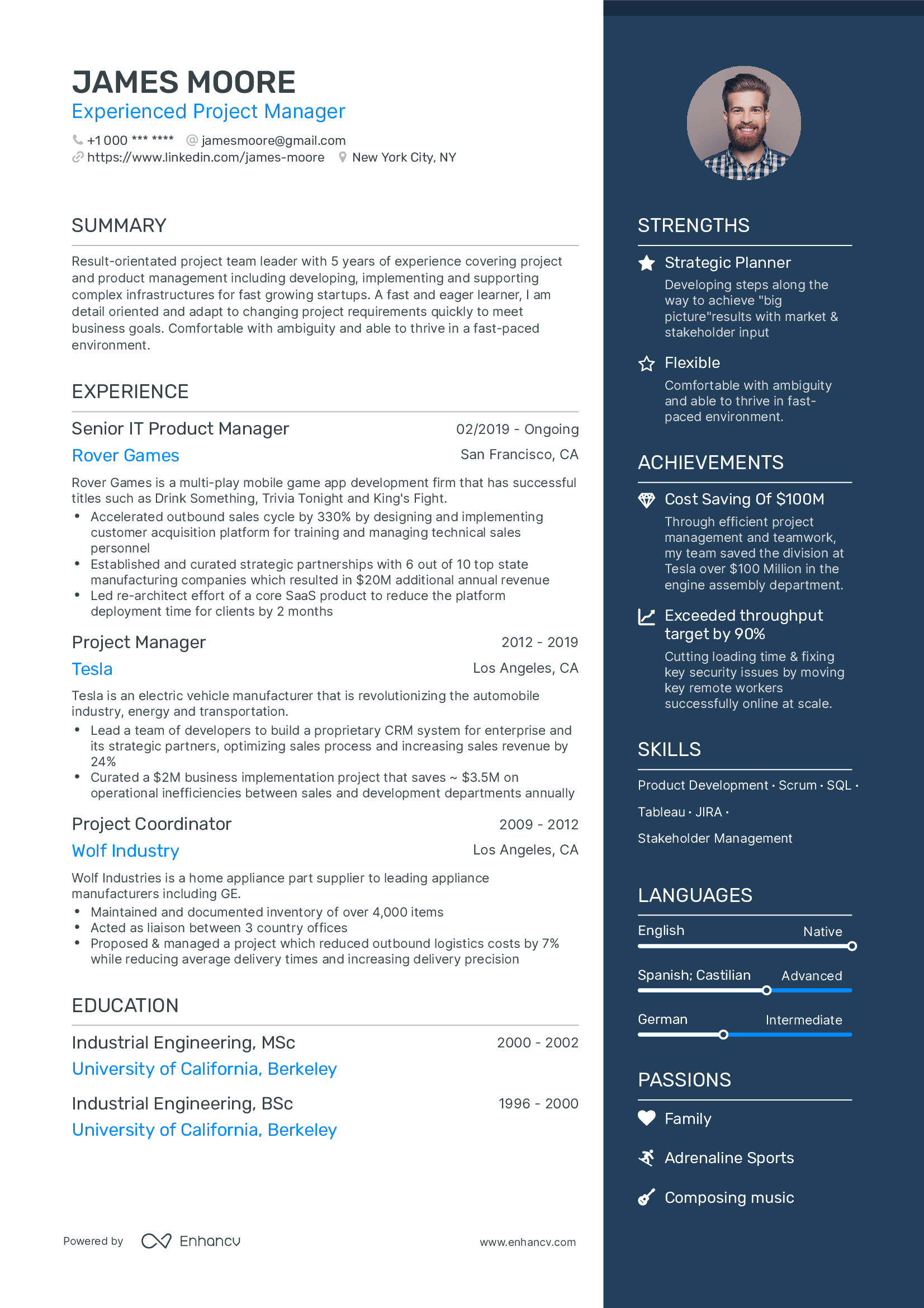
Elegant template with a beautiful design and compact, easy-to-read layout that highlights your strengths and achievements.
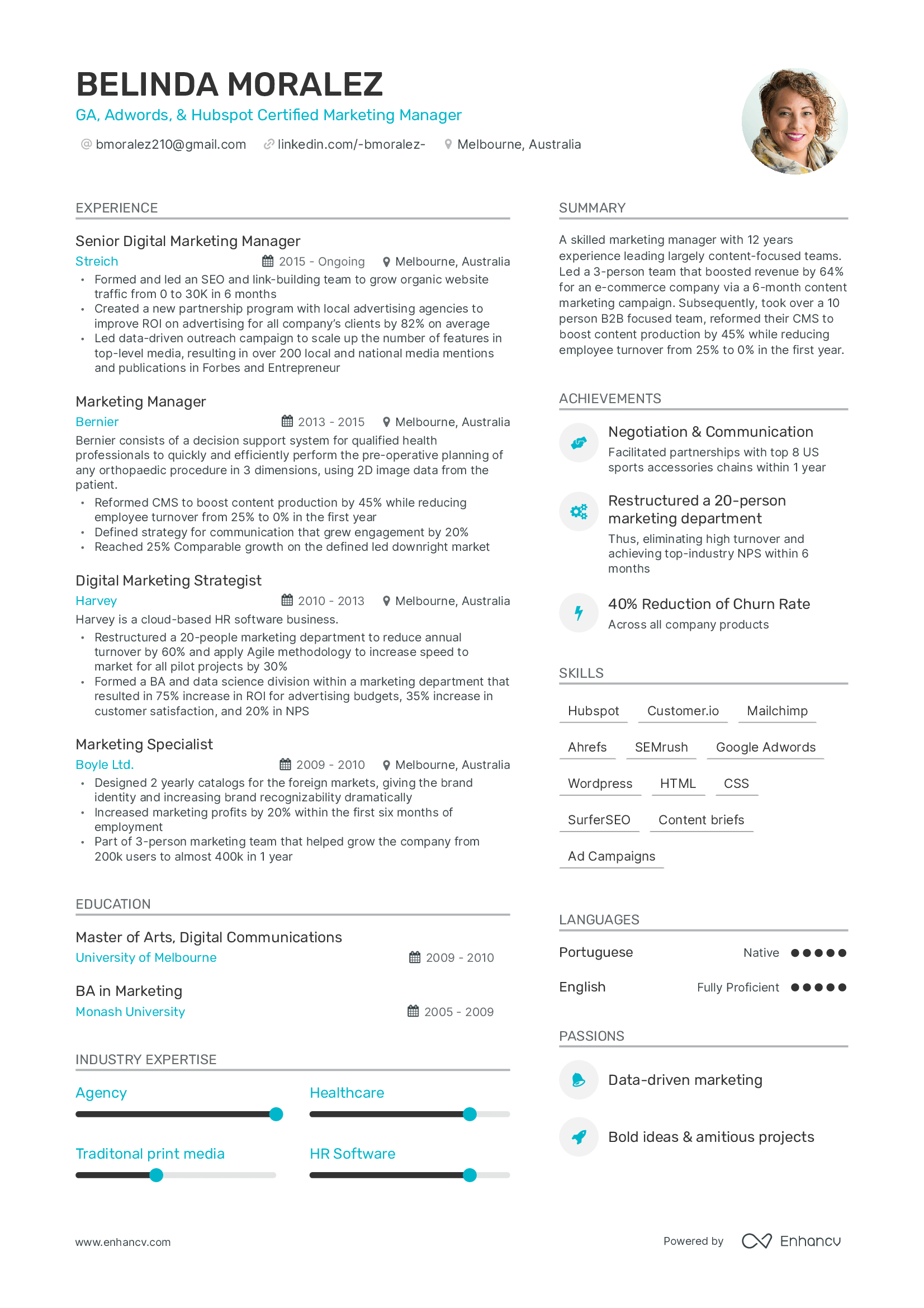
The most popular template for upper management roles, project managers and product owners.
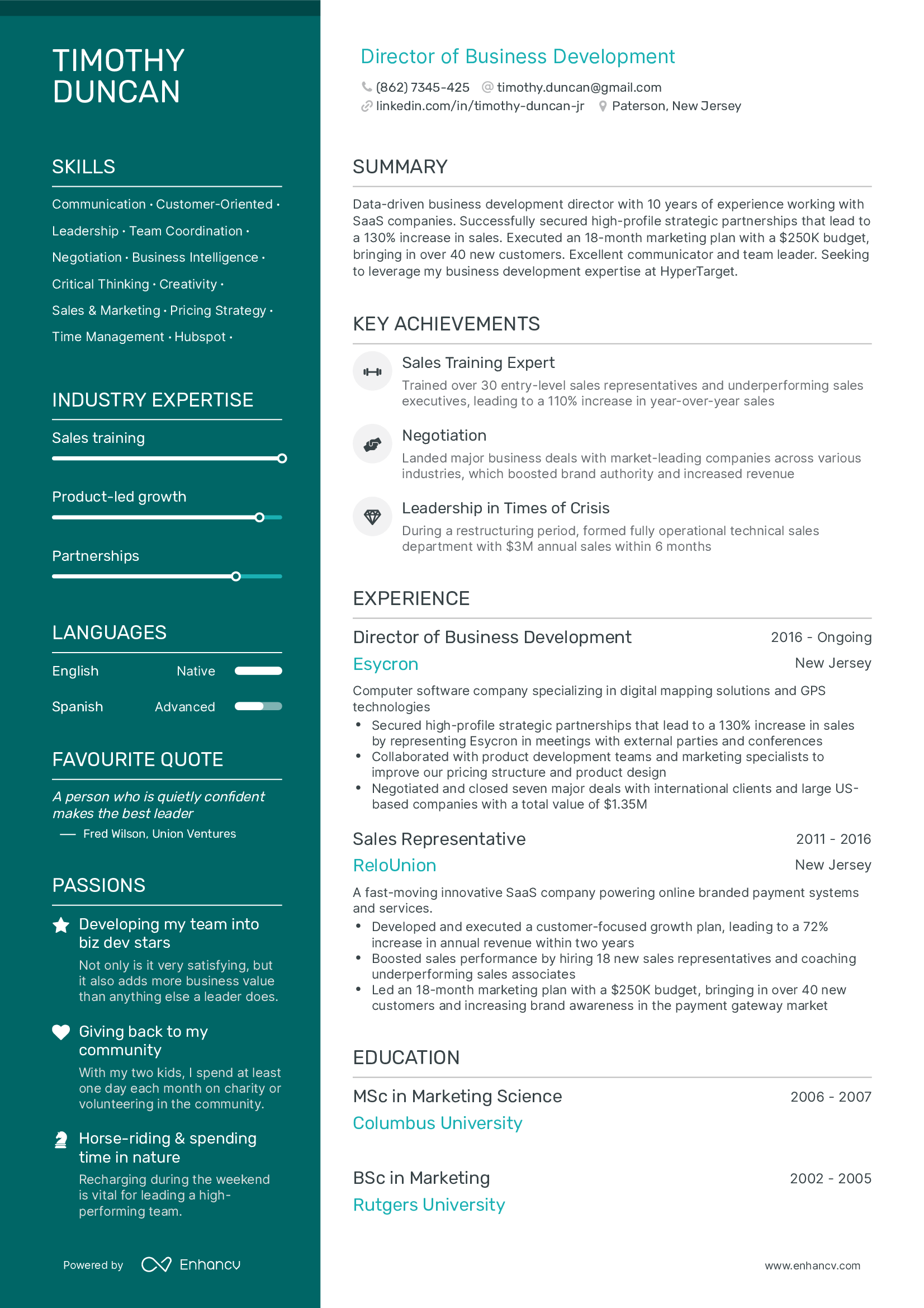
A refined template, especially great for positions where presentation is paramount: business development managers, sales leaders & other customer-facing roles.

A creative template that accents your header and makes recruiters want to read the rest. Built for any industry.
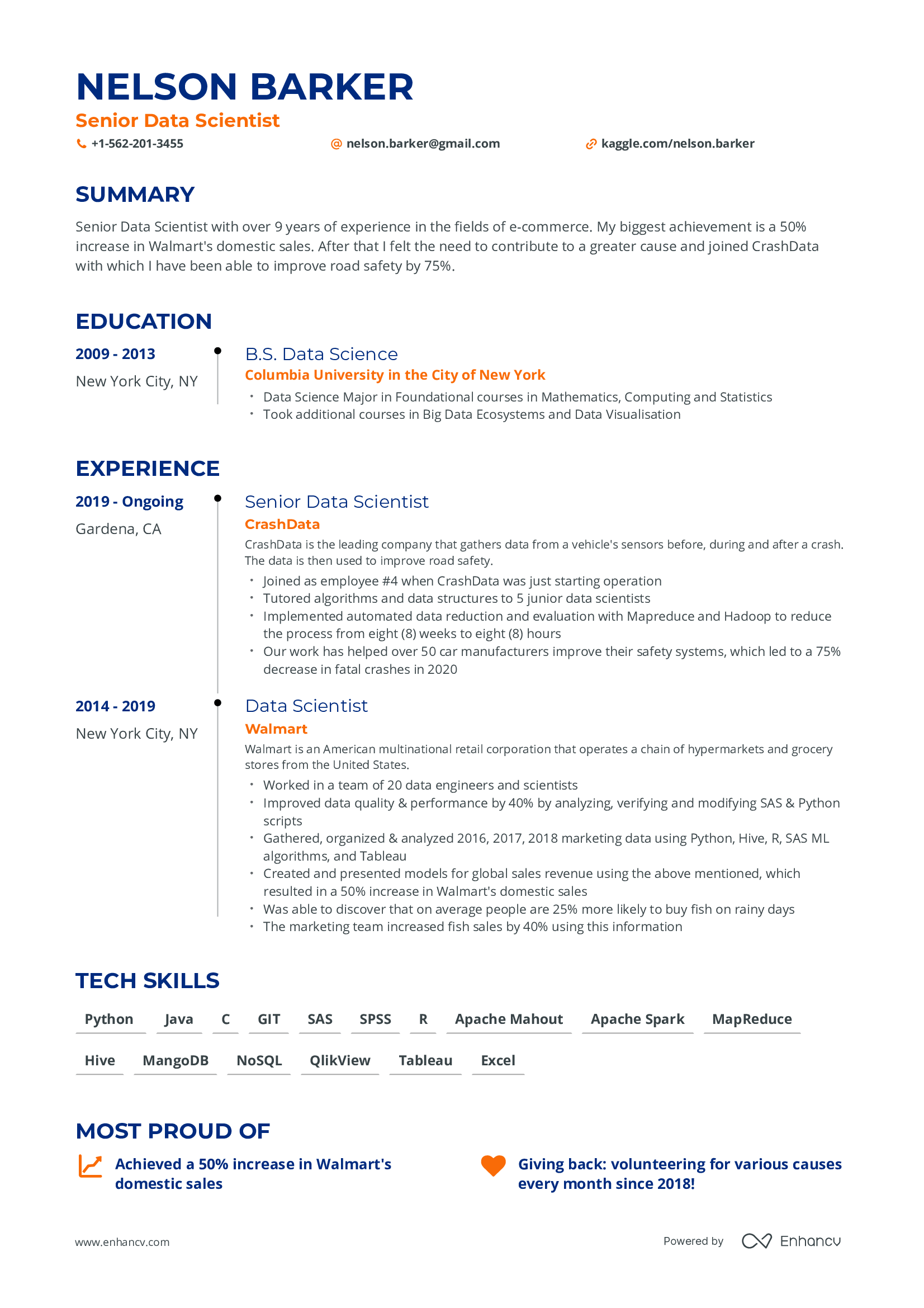
A timeline resume template. Organized neatly with a Timeline to show your career progress. For experienced professionals.
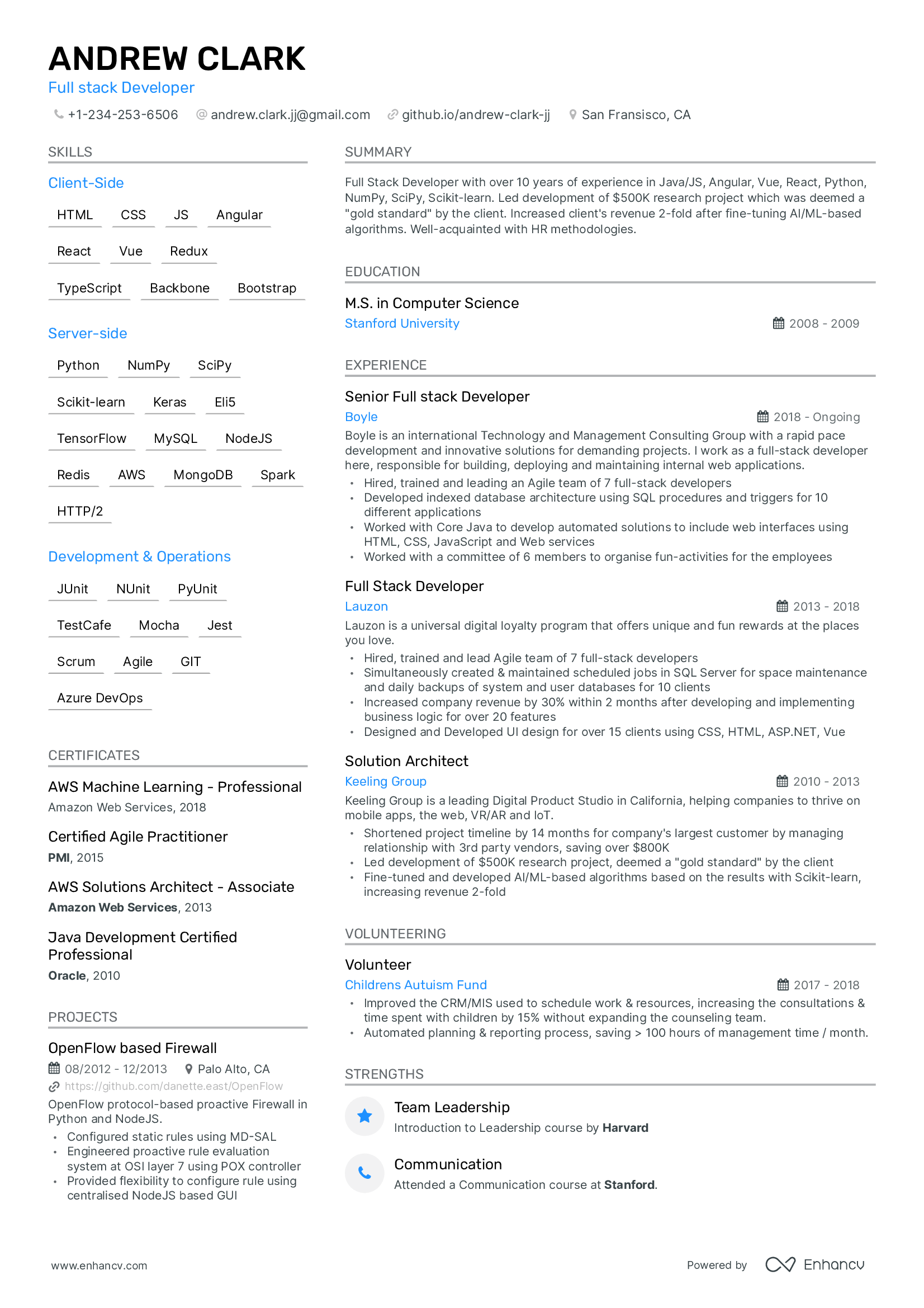
Are you a software engineer or a data scientist with a lot of skills & projects to list on your resume? This template allows you to create a perfect one-page resume.
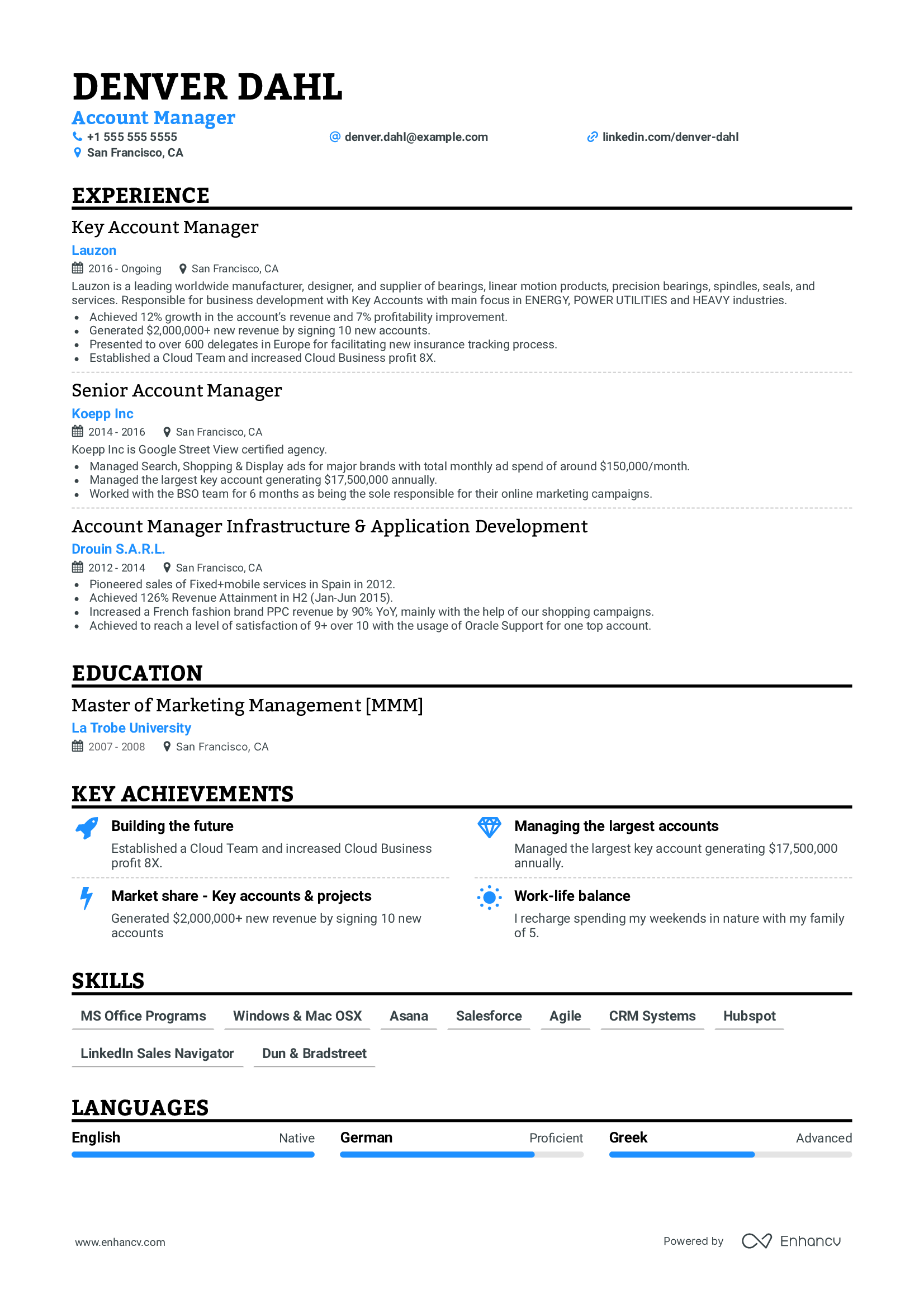
Single Column
Free, simple resume template. Easily readable by both humans and ATS bots.
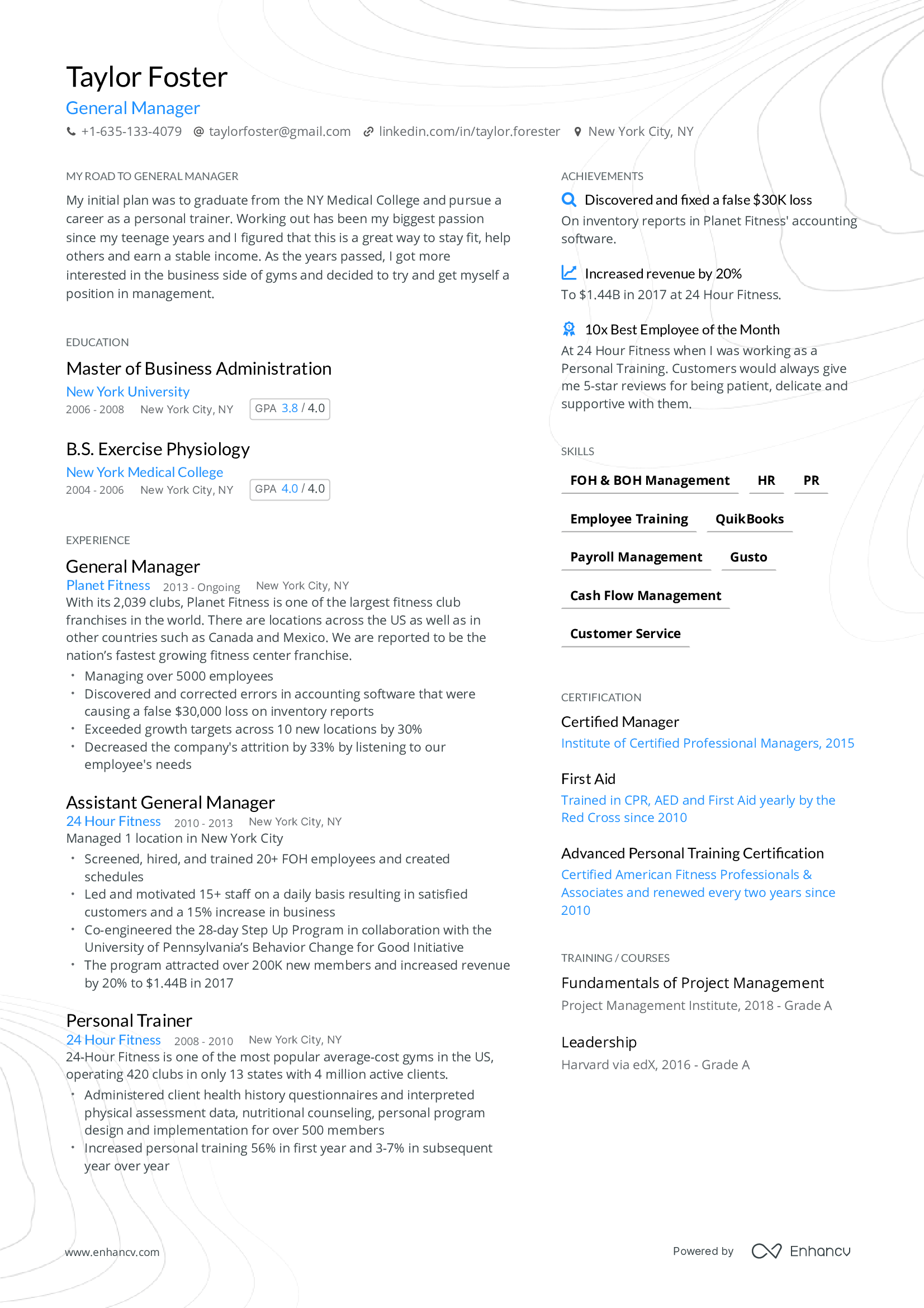
Designed as a one-page resume template for mid-level roles with 3-10 years of experience.
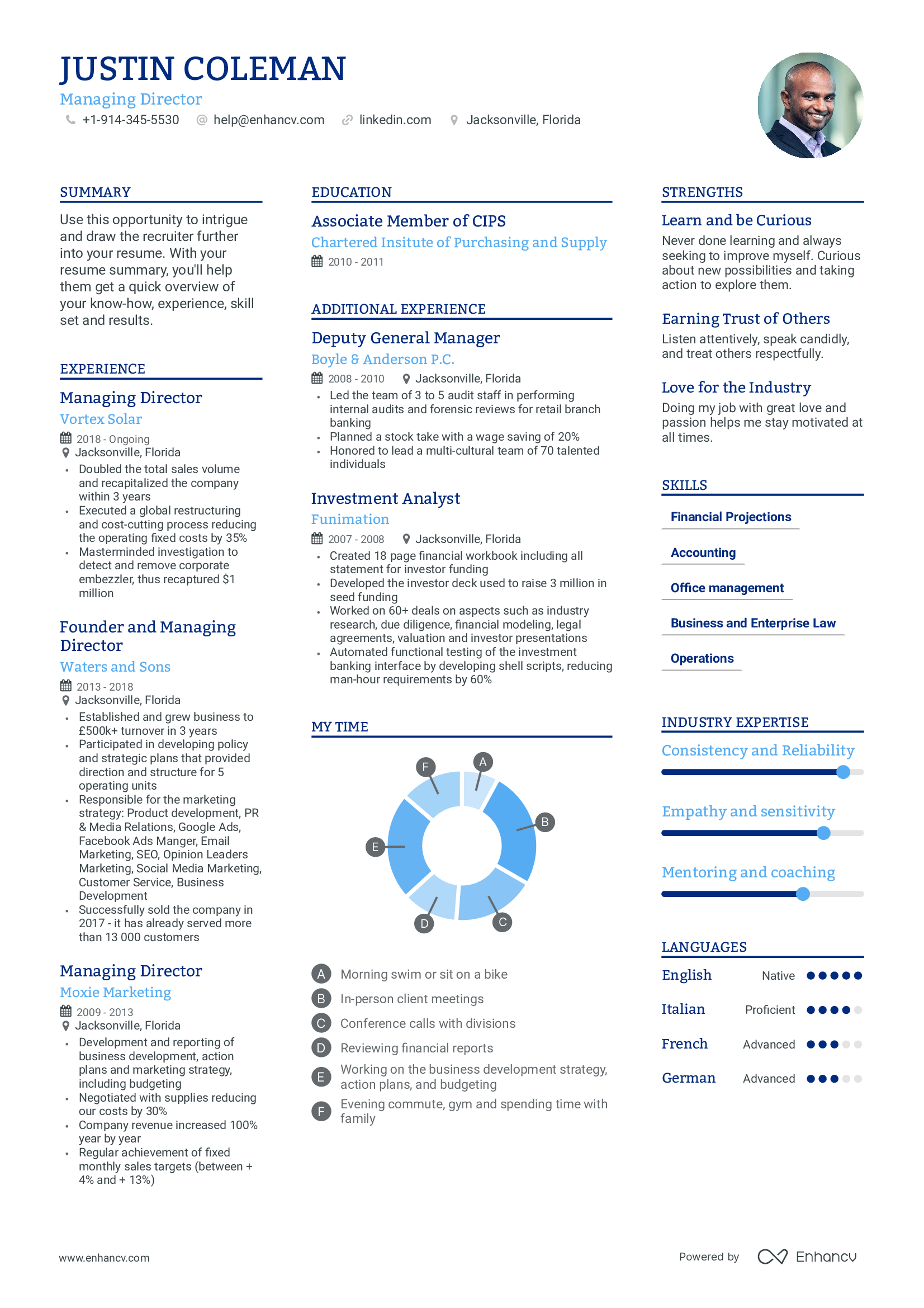
Multicolumn
Multicolumn resume template. Made for executives to fit additional info in a third column.
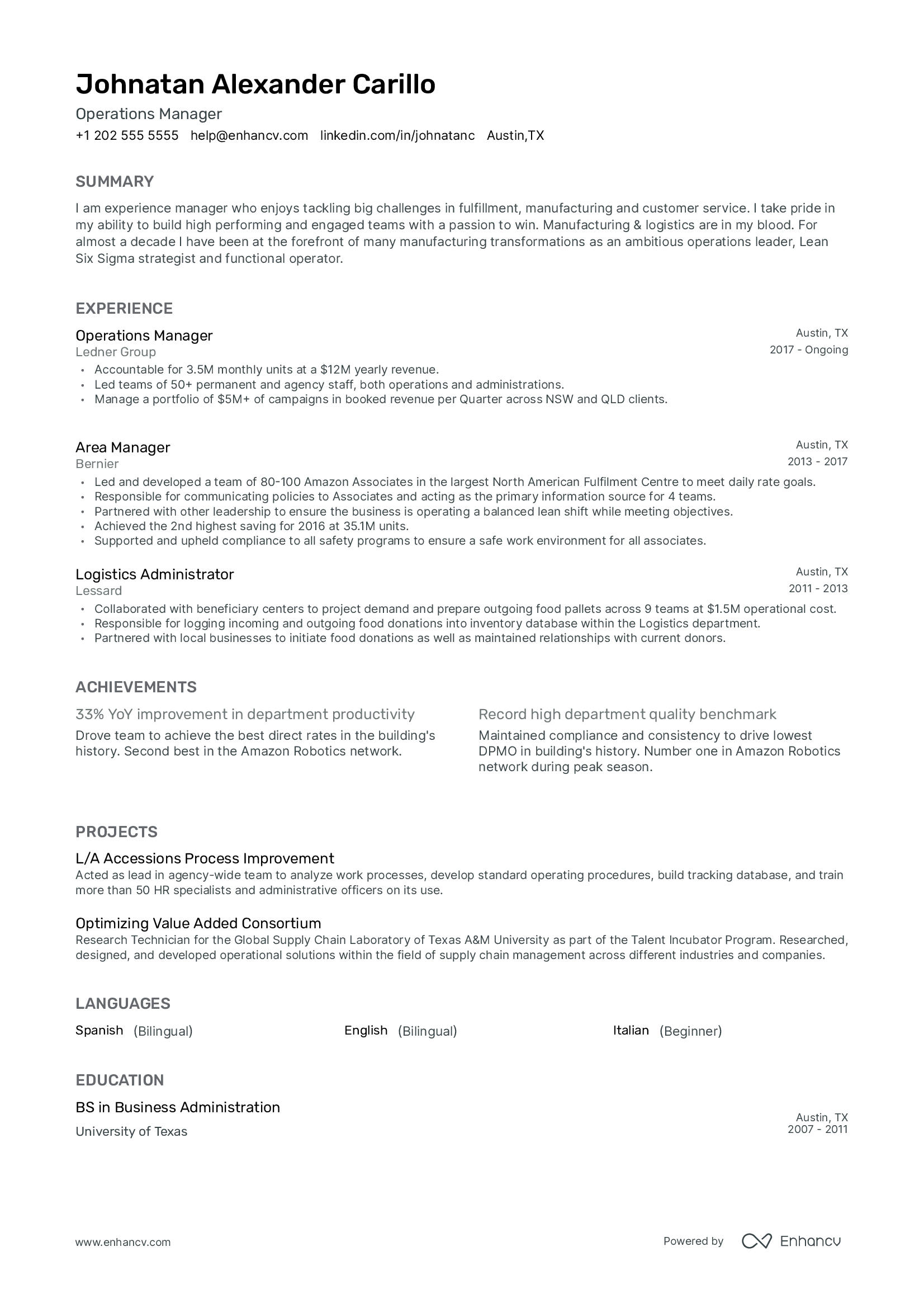
Traditional resume template. Fitting for conservative industries.
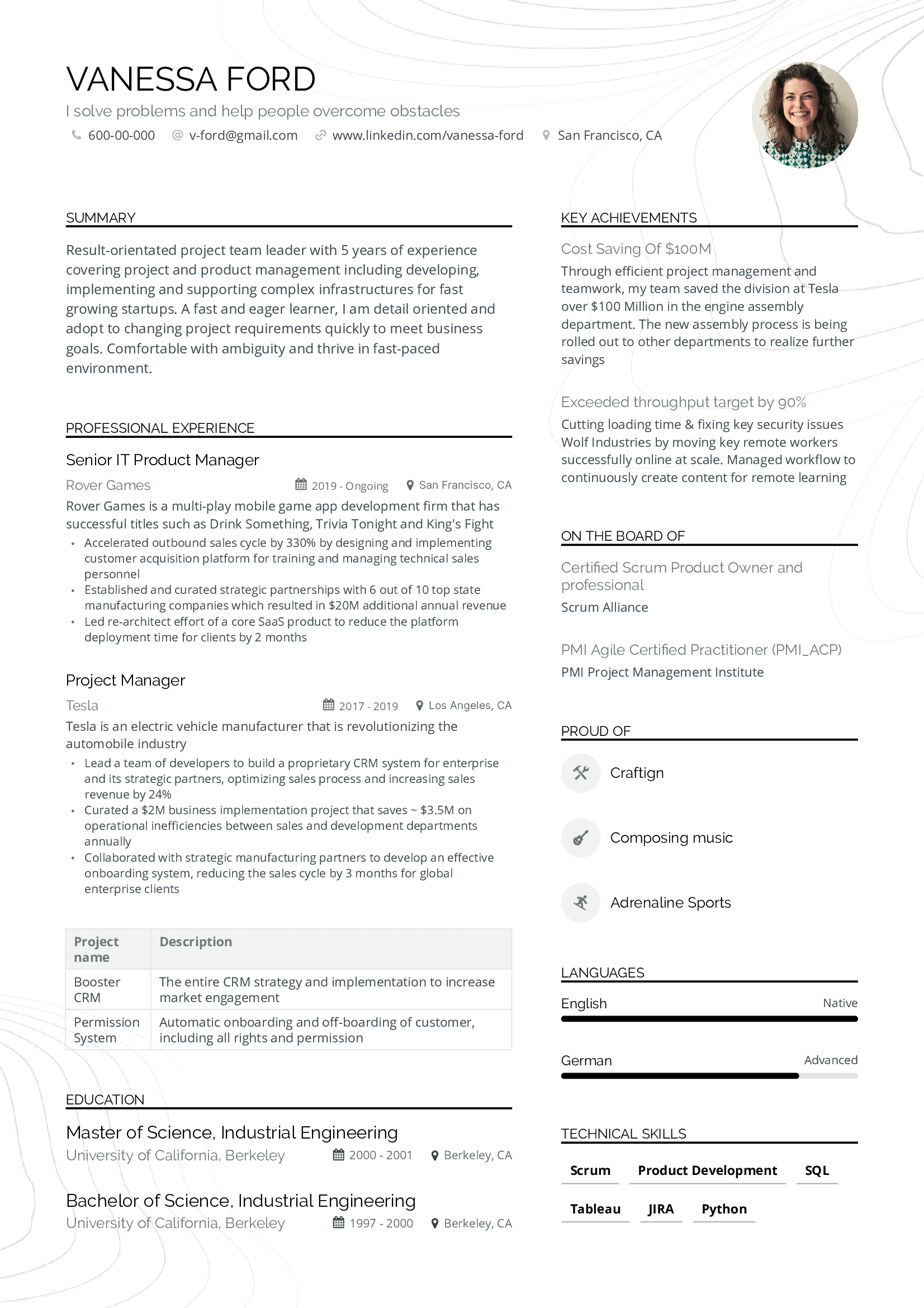
High Performer
Data-focused resume template. Perfect for project and product managers.
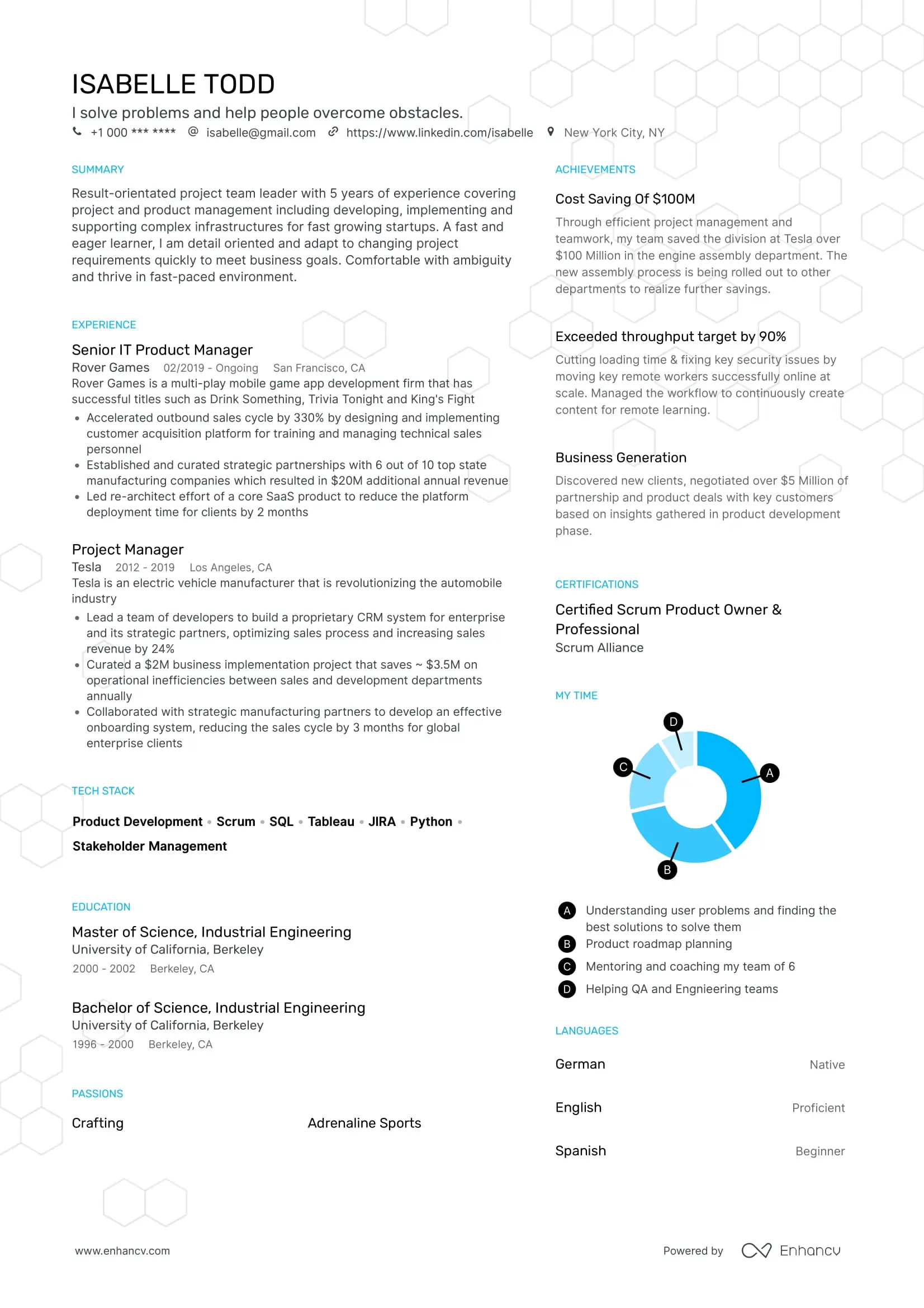
Minimalistic resume template. Blends whitespace and content, without clutter.
Resume Templates by job
Unleash the full potential of your career with professionally vetted resume templates. Take a look at samples from real resumes that helped people get hired at top companies in your field, and build a job-winning resume yourself.
Search more resume examples by job
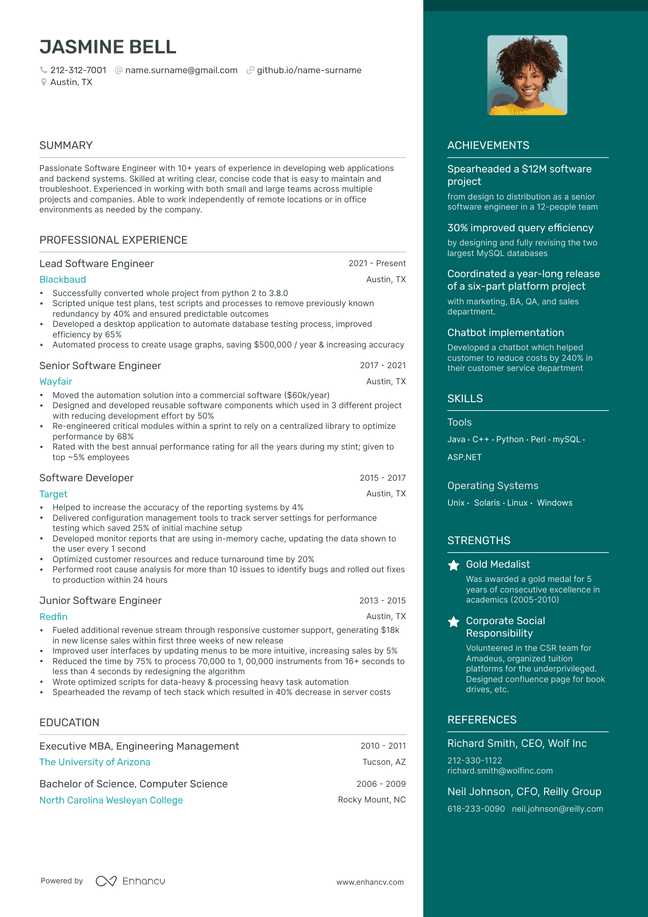
Software Engineer
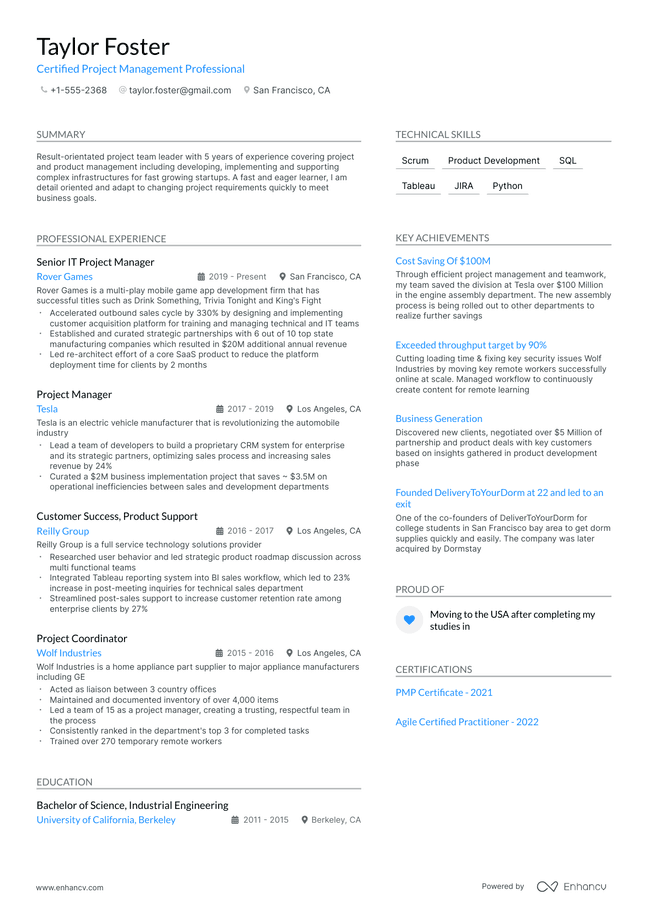
Project Manager
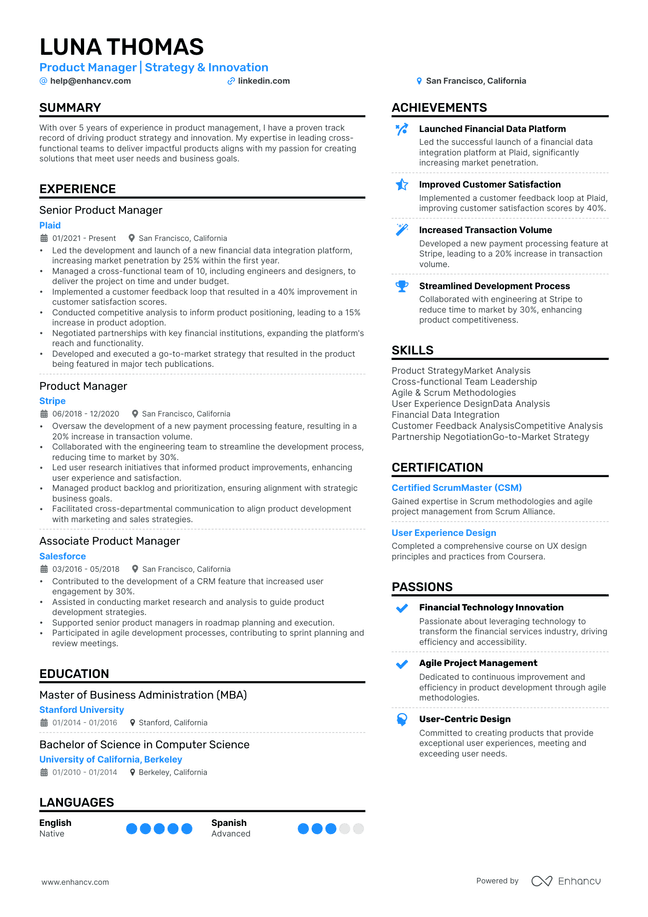
Product Manager
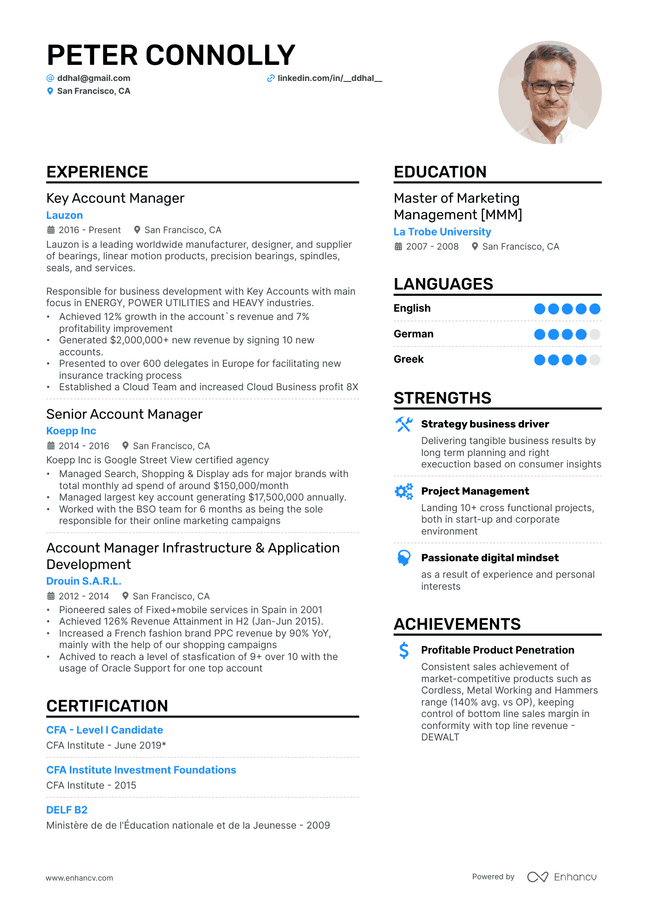
Account Manager
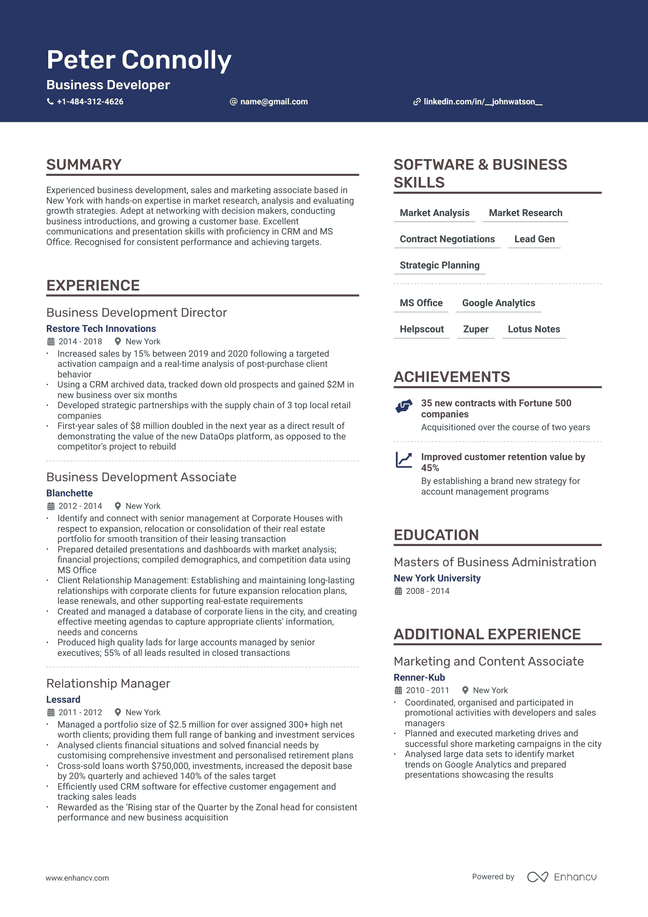
Business Development
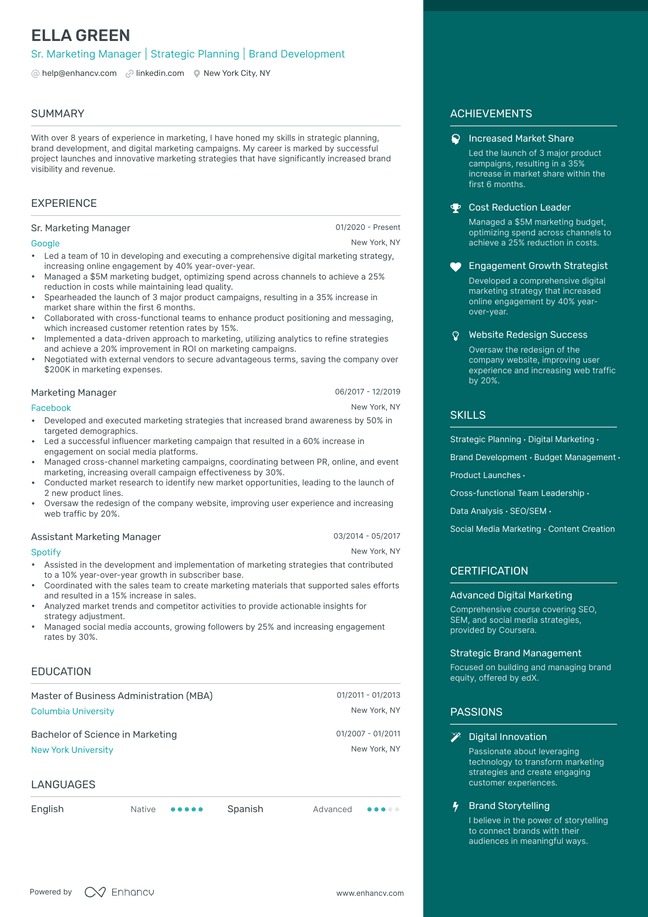
Marketing Manager
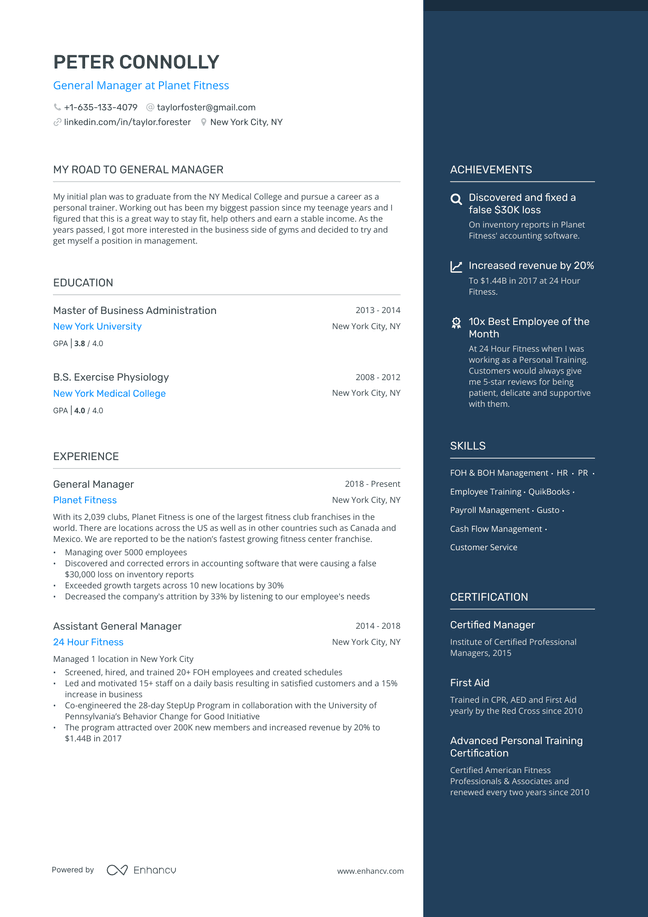
General Manager
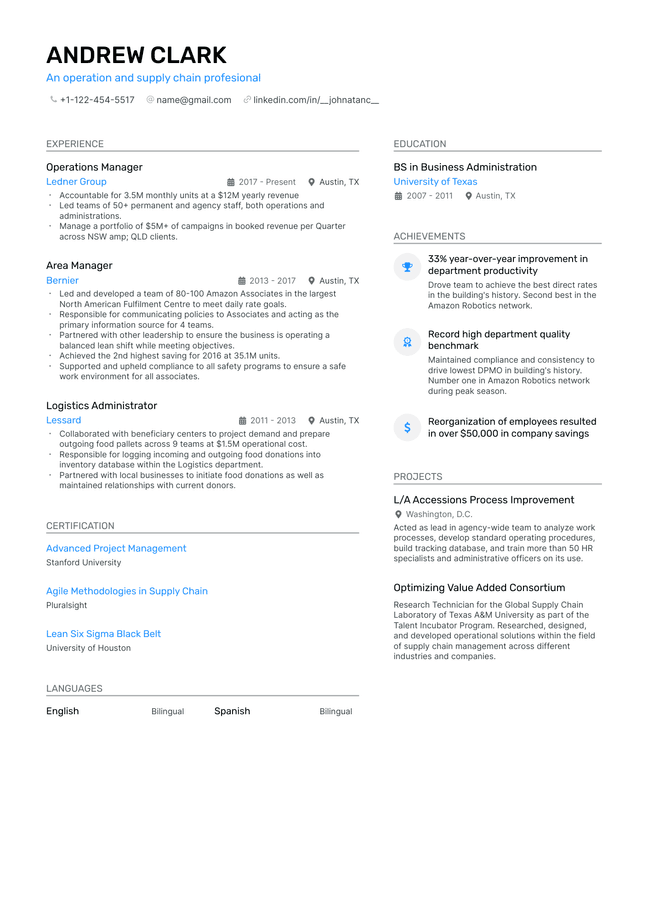
Operations Manager
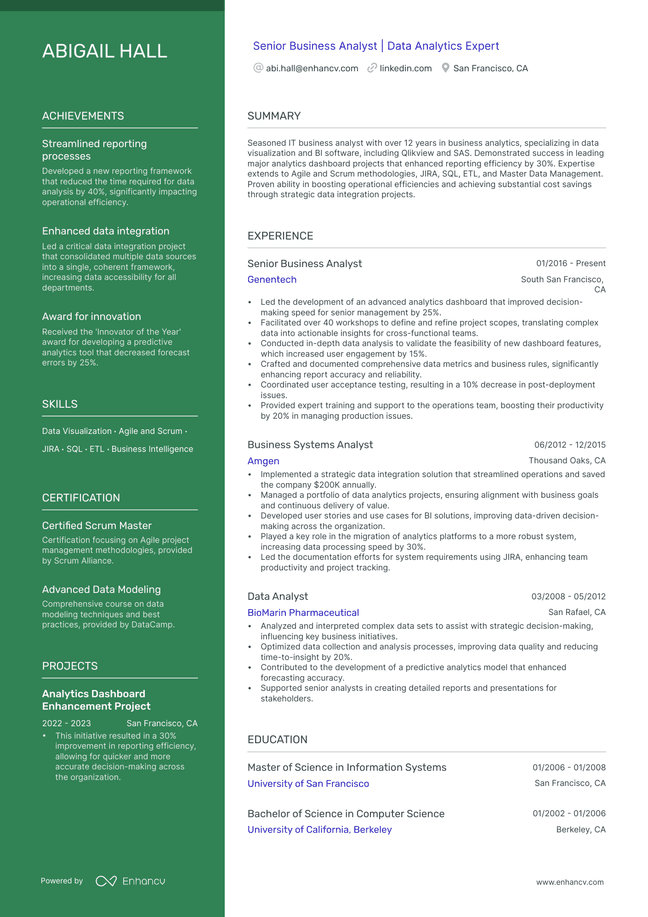
Business Analyst
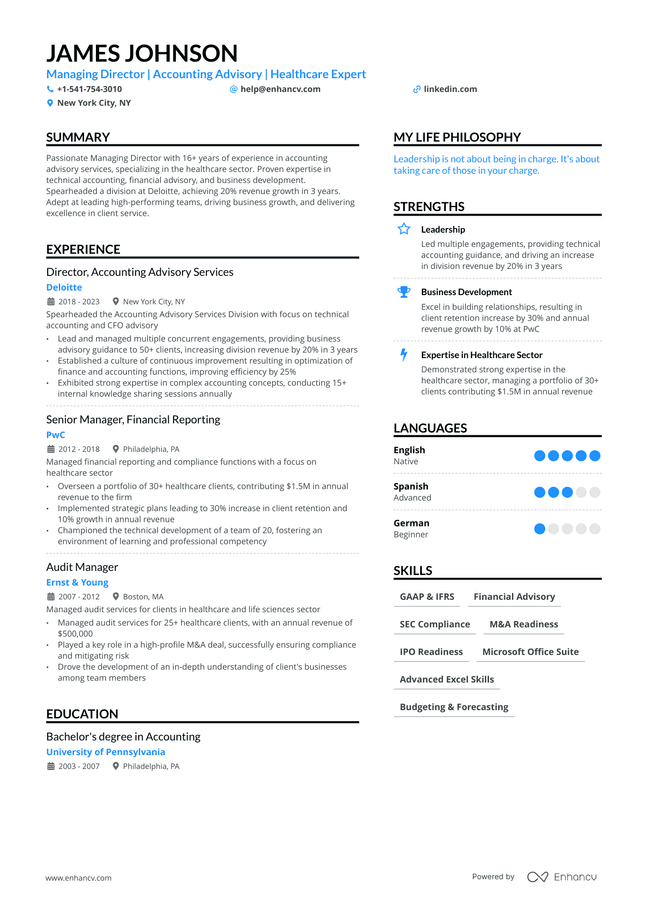
Managing Director
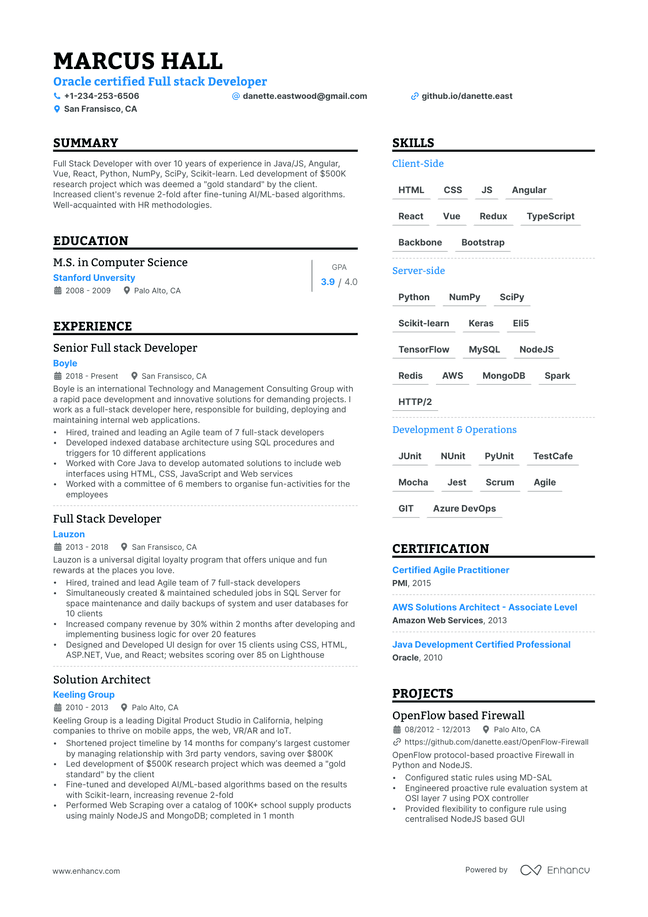
Full-Stack Developer
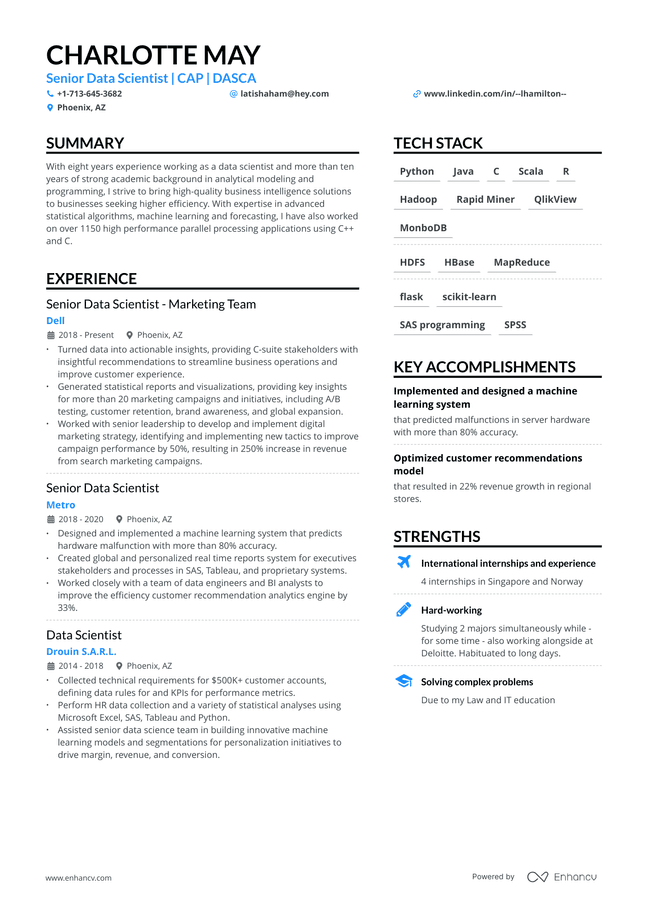
Data Scientist
Resume templates by experience.
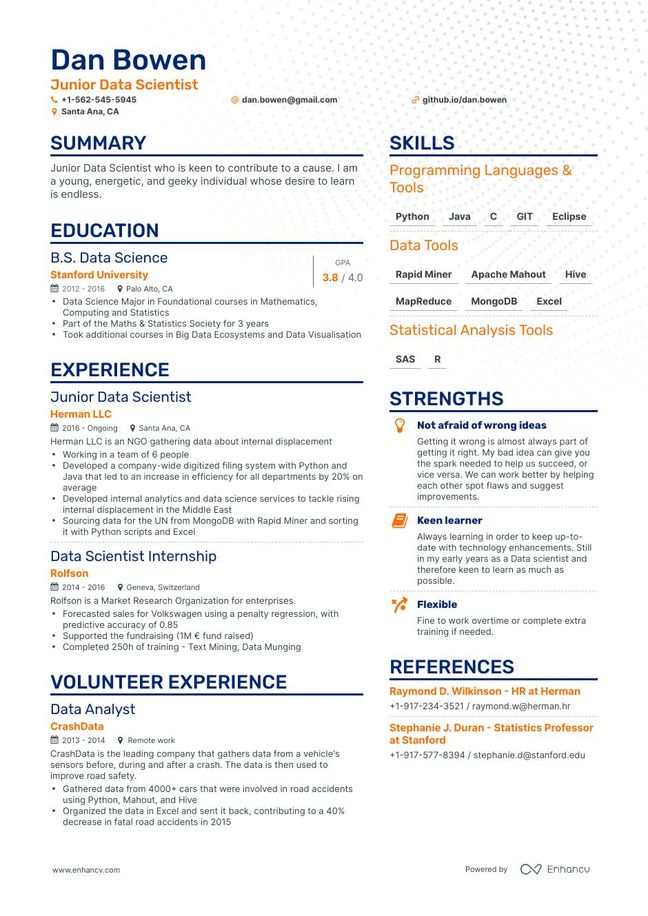
(1-3 years of experience)
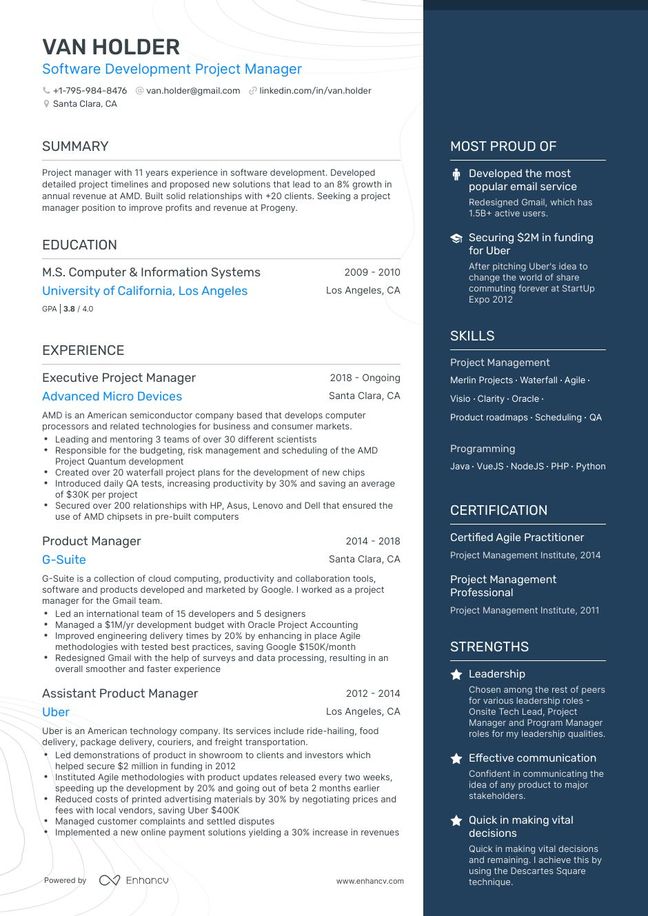
(3-7+ years of experience)
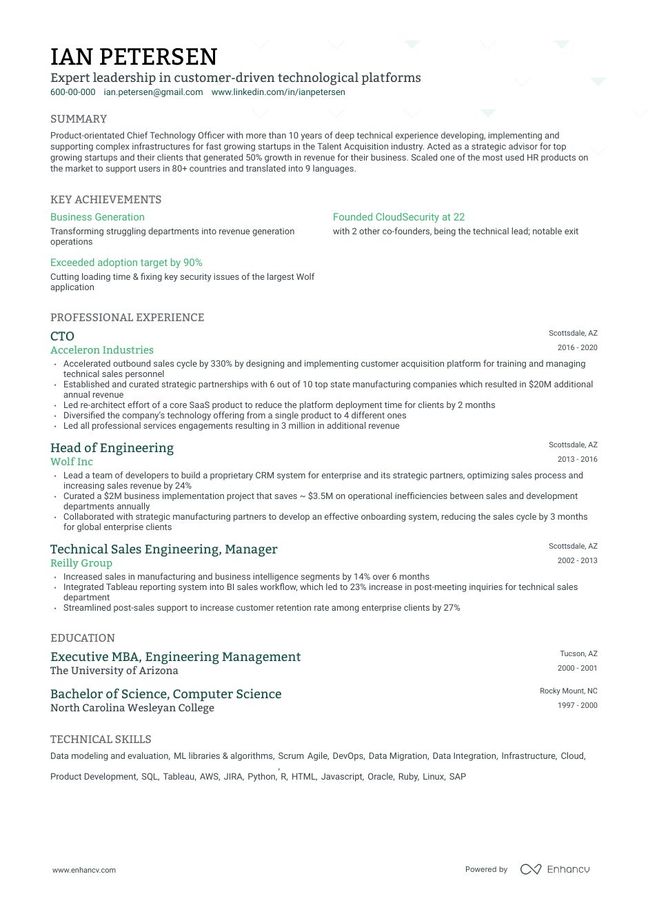
10+ years of experience)
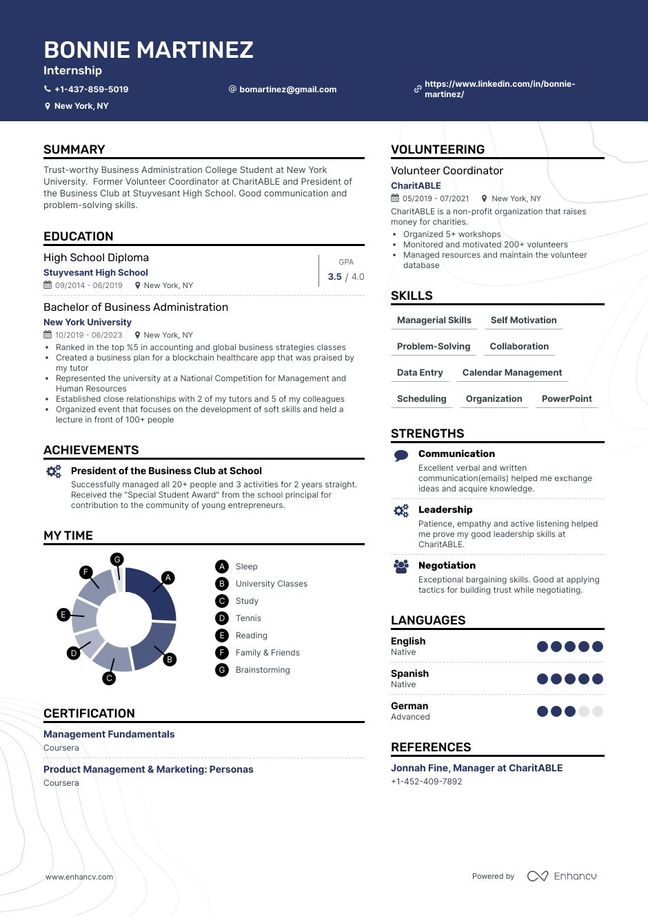
Entry Level
(no prior experience)
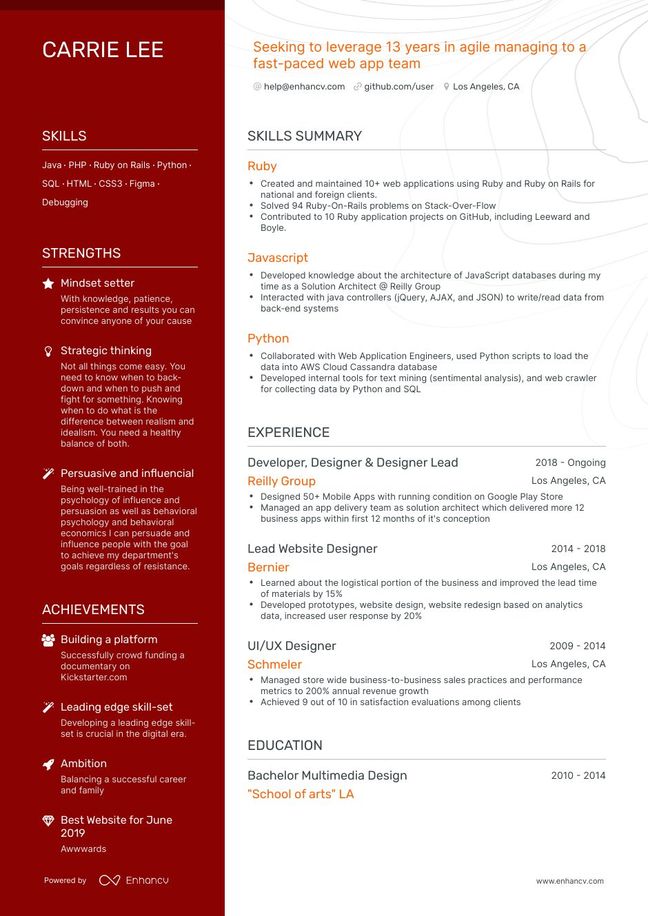
Career Change
Resume templates by format.
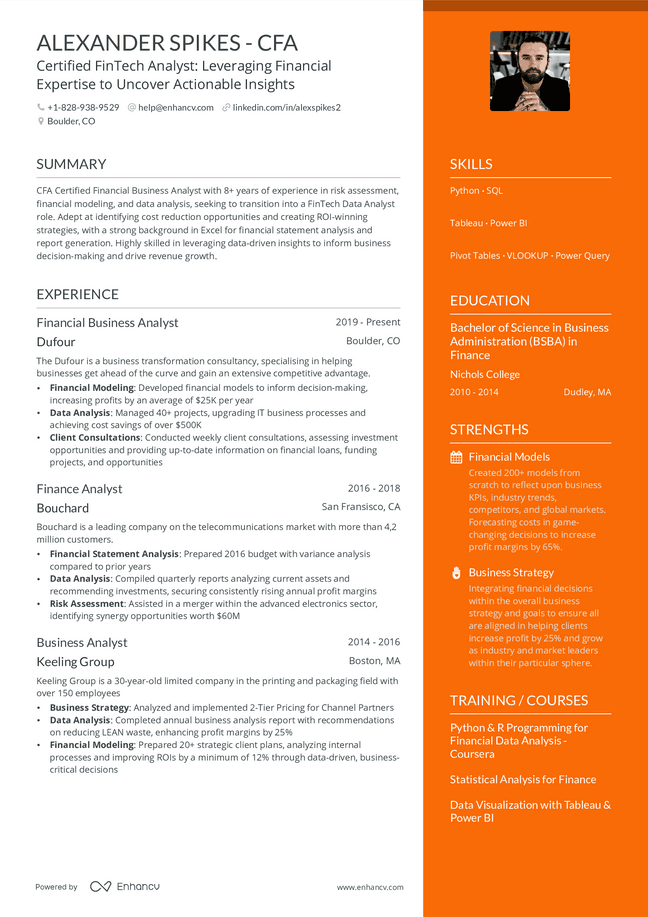
Combination Resume Templates
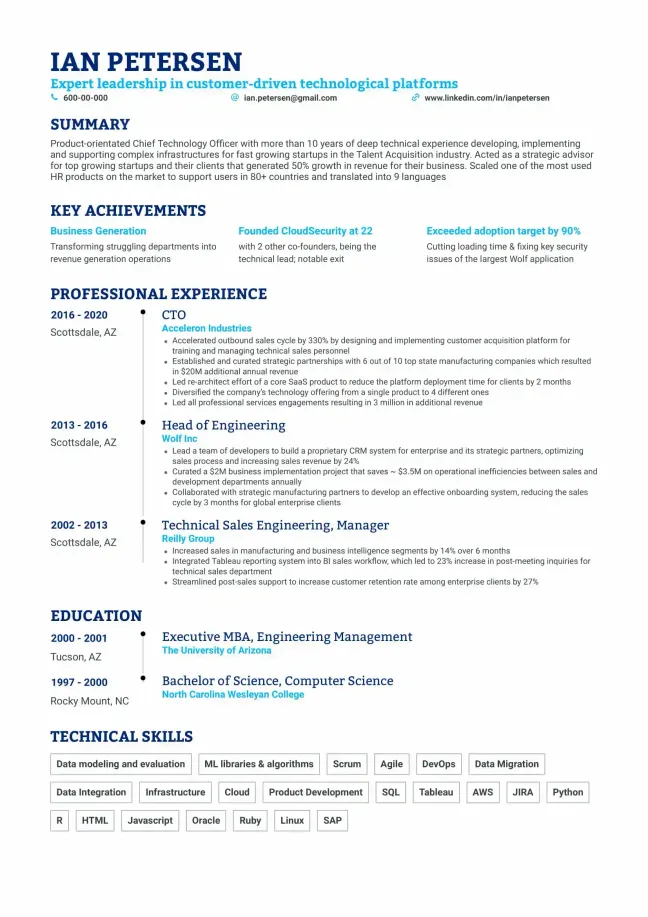
Corporate Resume Templates
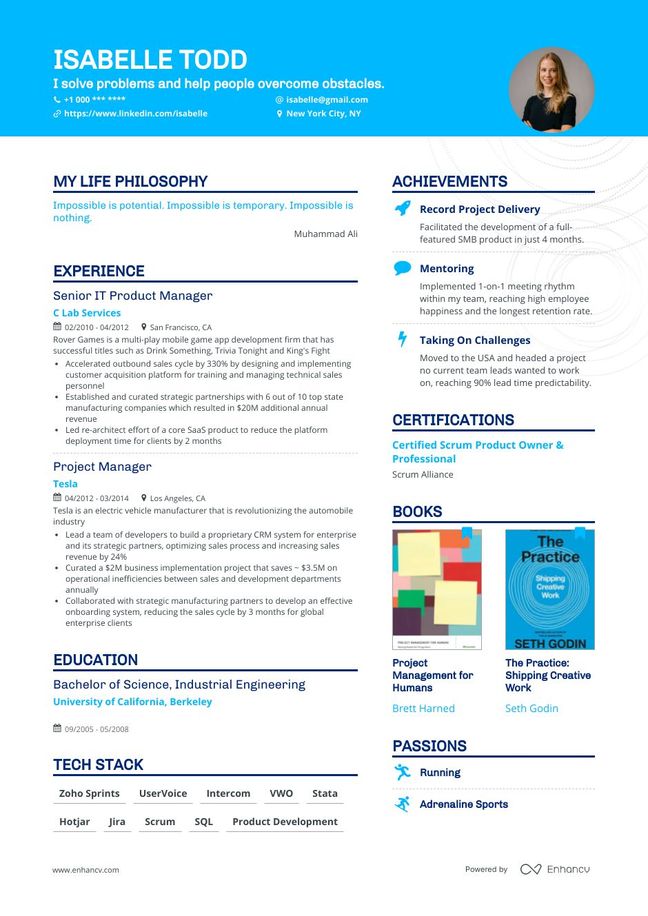
Infographic Resume Templates
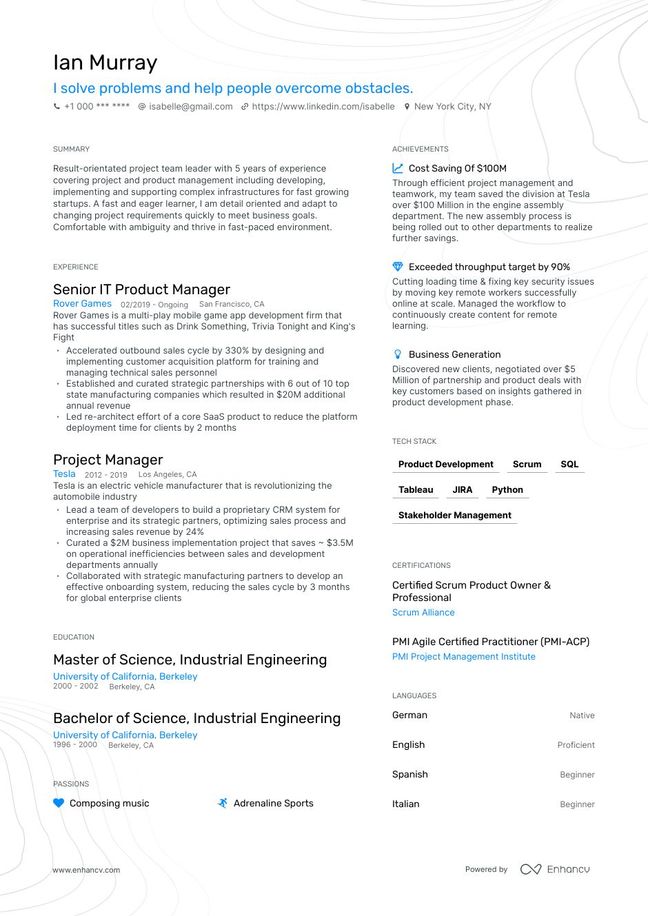
One Page Resume Templates
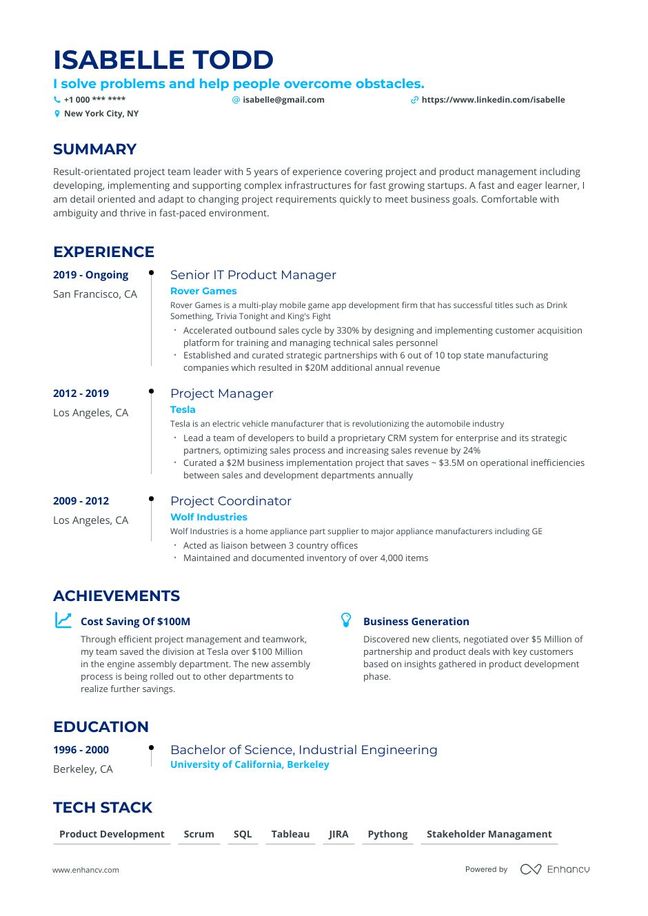
Timeline Resume Templates
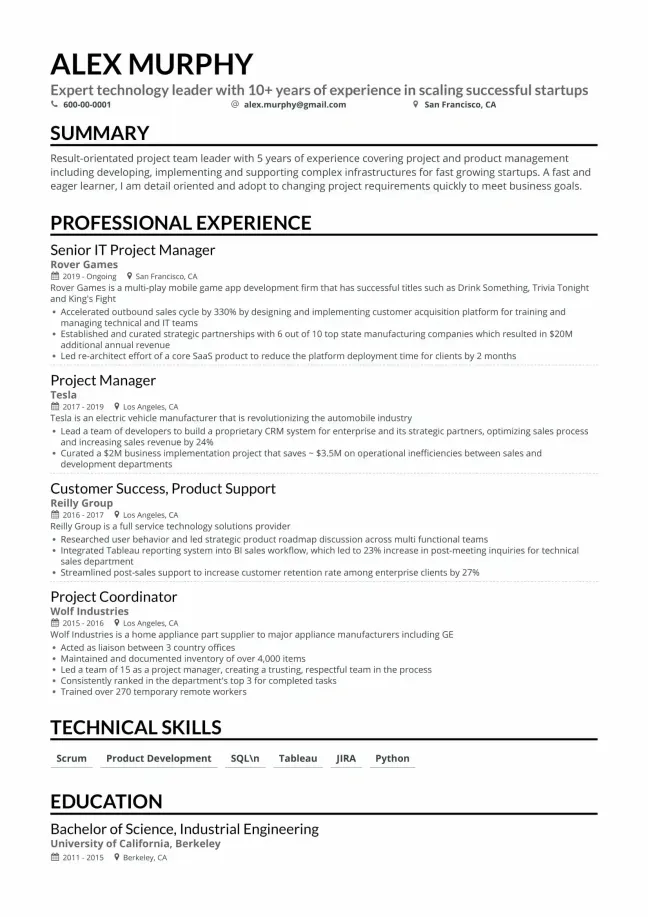
Chronological Resume Templates
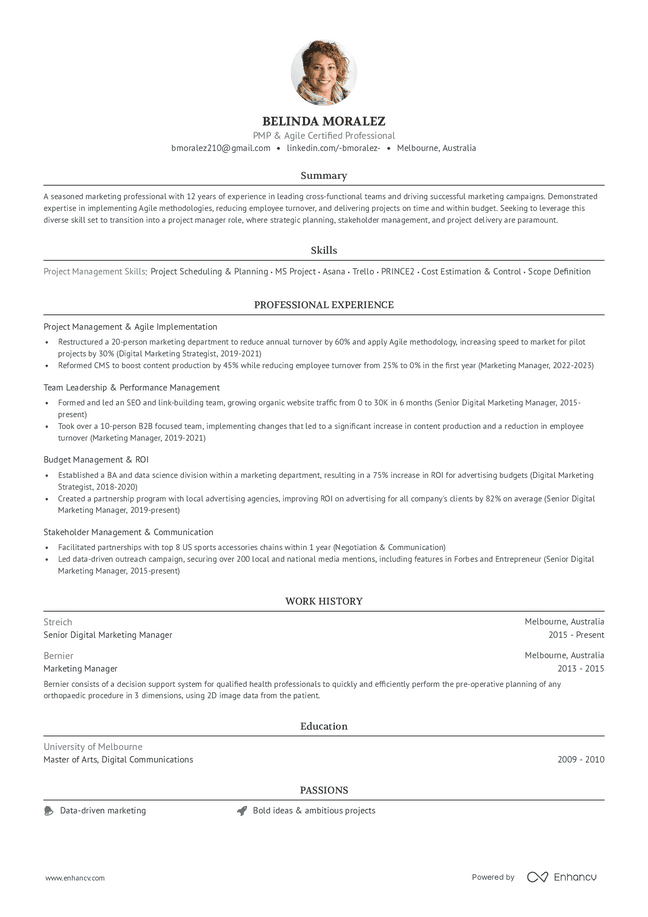
Functional Resume Templates
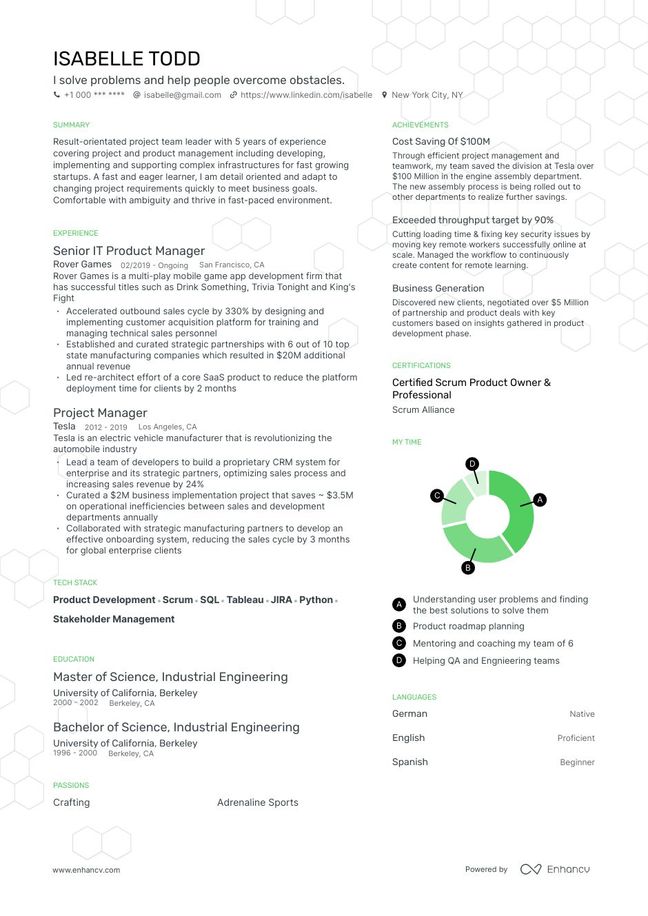
Minimalist Resume Templates
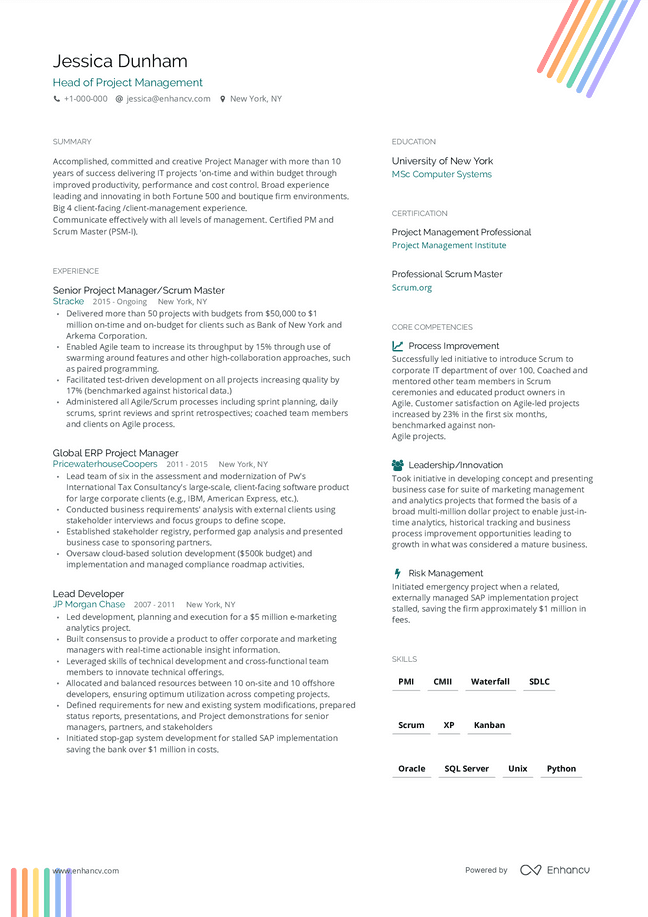
Two Column Resume Templates
- Modern Resume Templates
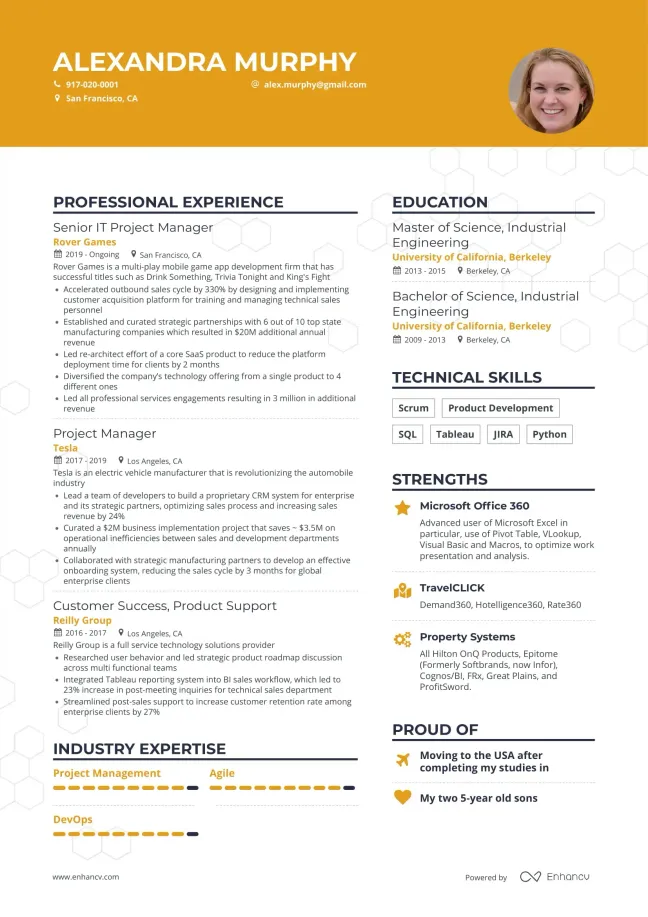
- Simple Resume Templates
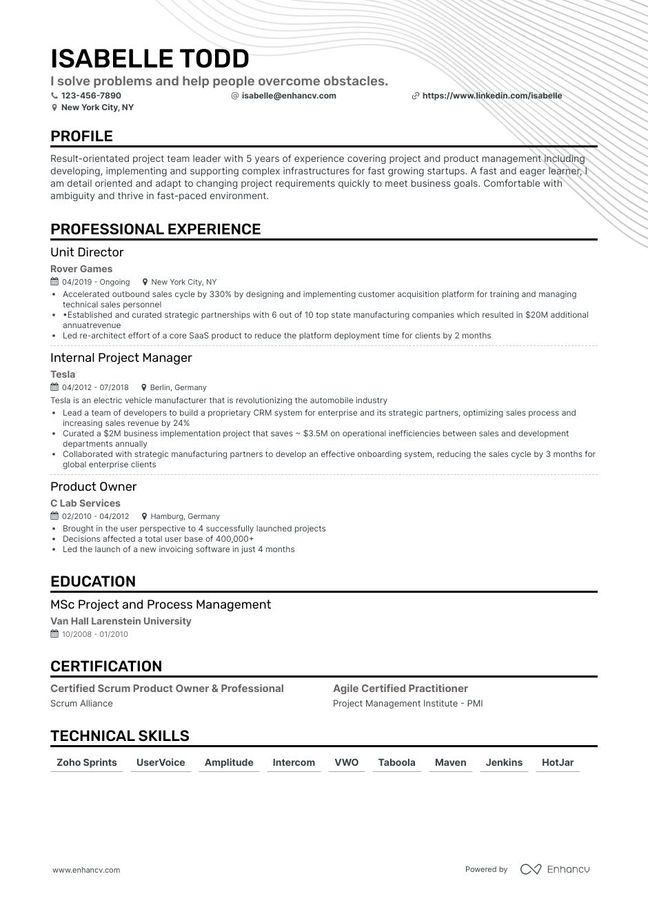
- Create Resume
- Terms of Service
- Privacy Policy
- Cookie Preferences
- Resume Examples
- AI Resume Builder
- Resume Summary Generator
- Resume Formats
- Resume Checker
- Resume Skills
- How to Write a Resume
- Cover Letter Builder
- Cover Letter Examples
- Cover Letter Templates
- Cover Letter Formats
- How to Write a Cover Letter
- Resume Guides
- Cover Letter Guides
- Job Interview Guides
- Job Interview Questions
- Career Resources
- Meet our customers
- Career resources
- English (UK)
- French (FR)
- German (DE)
- Spanish (ES)
- Swedish (SE)
© 2024 . All rights reserved.
Made with love by people who care.

COMMENTS
Cover letter with no experience example The example below can be used as a guide to help you build your cover letter if you have no experience: Chris Adams 789-555-0188 [email protected] chrisadamsonlinesportfolio.com Dec. 17, 2024 Lewis Marketing Agency 123 Horris Lane Lawrence, KS 66044 Dear Mia Lewis, My name is Chris Adams, and I am thrilled to express my interest in the Marketing ...
If you still feel stuck and don't know where to start, here's our seven-step guide on how to write a cover letter with no experience: 1. Check the company and job description. The first step in crafting a well-written cover letter is to research the company where you want to work. Carefully review what the organization shares about its values ...
Your Name. This cover letter is upfront and clear that you have no experience in the field of sales, but shows that you're willing to learn and excited to learn this new job. That's essential! You don't JUST want to say you're willing to learn, though. You want to PROVE that you'll be able to learn.
Writing a cover letter can be daunting, especially if you have no experience. As a fresh graduate or entry-level job seeker, it can be hard to know where to start. However, a cover letter is an essential part of any job application, and it shouldn't be overlooked. Importance of Having a Cover Letter A cover letter is your chance to make a first impression on a potential employer. It allows you ...
Here are some valuable tips to help you create a standout cover letter even without prior experience: Research the Company. Before you start writing your cover letter, take the time to research the company you are applying to. Understand their values, goals, and work culture. Tailoring your cover letter to align with the company's ethos shows ...
So, you landed an interview for your dream job, but there's just one catch — you have little to no experience. Don't worry, you've got this. The key is crafting a cover letter that highlights your potential and passion. You may not have years of experience, but you have skills and talents that will make you an asset to any team. In this ...
Tips for your cover letter when you don't have experience: So, how do you write a cover letter when you know you don't have tons of experience to showcase? Follow these tips: Experience isn't everything. Read anything about job applications and you'll be told the opposite. However, in many instances, experience isn't always the most important ...
5. Closing and sign off. Express your gratitude to the reader for consideration, write valediction and your name at the end of your cover letter for entry-level position. For example, your closing words may be this way: "Thank you for considering me for the entry-level position of junior web developer.
But don't let that discourage you. This blog post will guide you through the process of writing a cover letter with no experience. First, it's important to understand the purpose of a cover letter. A cover letter is not a reiteration of your resume. It's your chance to tell your story and show your interest in the company. A good cover letter ...
However, a cover letter is essential for getting interviews and landing a position. Creating a winning cover letter can be challenging, but it's not impossible. Our experts are here to help guide you through writing an effective and persuasive cover letter, even if you don't have any previous work experience to list.
Make sure to add your name, number, email, and social media at the very top of the letter. Follow it by adding the date, name of the employer, and their address. Address the hiring manager and not the employer when starting your introduction. Make sure to format your cover letter correctly by adhering to a professional standard.
Header: Begin your cover letter with your contact information, including your full name, phone number, and email address. Below that, include the date of writing and the employer's details (i.e., name, title, company, address). 2. Salutation: Address the recipient by their name, if possible.
To formally end your letter, you can write, "Sincerely," followed by your full name at the bottom of the document. We hope this article helps you to better understand how to write a cover letter when you have no experience. If you need any further assistance, feel free to reach out to us here at Cowrite. Our augmented writing platform is ...
Here's what you can write to enhance your cover letter. Align with mission: Showing that you know what the company does is great but a better wat to execute the delivery of this information is to get mission driven. Offer a positive opinion about a product, or goal and tie it with what you have to offer. Focus on the people: It's no surprise ...
Applying for a job when you have no, or limited, experience is daunting. Here we look at a crucial part of your application—the cover letter. It's an excellent tool for showing your suitability for the role and the organization, even when you don't have that all-important experience.
Here are some tips to get you started. 1. Make it reader friendly. Be sure your cover letter is visually appealing and easy to scan. Short, concisely written paragraphs are advisable. If a hiring manager can quickly read your cover letter, he will be more apt to give it attention, rather than simply tossing it in the slush pile out of frustration.
3. Entry Level (No Work Experience) Cover Letter. When writing your first cover letter, focus on the skills you gained through your education, volunteer work, and hobbies. Our entry level cover letter template helps you explain why you're a top candidate, even if you have no work experience. Simply paste it into Word and customize.
Here are 8 steps for how to write a cover letter with no experience: 1. Study the Job Description and Research the Company. First, before you get down to writing, find and note down all the information possible about the skills, qualities, and qualifications needed and wanted for the job.
4. Write an attention-grabbing opening paragraph. Start your cover letter with an informative, direct introduction.. In the first one or two sentences, mention the position and organization you're applying for, where you found the position, and why you're excited about the opportunity.
Regardless of your background or the type of job you want, we have cover letter writing guides and samples to simplify the application process for you. Blog. Are Cover Letters Necessary in 2024? ... To make a cover letter with no experience (like a cover letter for an entry-level position), there are several key things to highlight in your content:
Writing a persuasive cover letter without prior work experience can be challenging. But with the right approach, you can make a compelling case for why you're the perfect fit for the job. In this article, we'll help you write an effective cover letter that leaves a lasting impression on your potential employer. 1.
Here are some cover letter writing tips for your first job or job without experience in your chosen field. 1. Research the job description and company. Before writing an entry-level cover letter, ensure you fully understand the job description and check out the company website to get a better idea of what their values are.
Just because you don't have relevant skills or experience from a conventional job doesn't mean you can't create a resume that will get you a job. First of all, don't let lack of experience discourage you from applying for the job you want. As a college senior, recent graduate or an entry-level applicant, your experience might be ...
You should tailor to the job for each cover letter you send. Do some research on the company's culture, mission, and values, ... An example of saying you have no experience but are willing to learn is "While I don't have the necessary experience, I believe my enthusiasm and willingness to learn makes me a strong candidate for this ...
Professional Cover Letter Examples to Get You Inspired. If you get stuck when writing your cover letter, I suggest you take a look at a professional cover letter example, as it can be really helpful. We've gathered a selection of over 10 professionally-crafted cover letters that cater to a range of industries and job levels.
Writing a good cover letter is possible — even if you have no work experience. Here are some tips and an example to show you how to write a cover letter. List your contact information. Include the hiring manager's contact details. Address the hiring manager by name. Write an attention-grabbing opening paragraph.
A no experience resume sample for job seekers without experience might also be helpful. Build this resume. Zoom. ... We also have cover letter templates and a great guide on how to write a cover letter, where you can learn all the tips and tricks to create a cover letter that stands out.
Data entry clerk cover letter example To help you learn more about crafting a strong cover letter, here's a sample letter for a data entry clerk position. Richard Smith Birmingham 44 (0)1632 960513 3 June 2024 Mr. Dan Brown Wavewords Dear Mr. Brown, I would like to apply for the data entry clerk position advertised on Indeed. With my excellent typing skills, attention to detail and familiarity ...
This resume format focuses on job skills. If you don't have a lot of experience, are switching careers, or have many gaps in your resume, a functional resume can help you highlight your transferable skills and show that you are passionate about the position. Combination.
Yes, they are. Newly registered users have a free 7-day trial period. Once seven days pass, you can still access and download your resume, but you cannot change the content or template until you upgrade. Enhancv PRO users have access to the full suite of designs, templates, and features the Enhancv resume builder has to offer. See our pricing ...